Similar presentations:
Taste. Page 29. Unit 3
1.
TastePage 29. Unit 3
2.
Exercise 1Page 29
3.
Put the words in the box into3 groups:
1. food and drink
2. people
3. kitchen equipment
[i’kwipmənt]
4.
Aubergine [o:bə'dʒi:n]5.
Aubergine [o:bə'dʒi:n](food and drink)
6.
Bread [bred]7.
Bread [bred](food and drink)
8.
Chef [ʃef]9.
Chef [ʃef](people)
10.
Cooker [kukə]11.
Cooker [kukə](Kitchen equipment
[i’kwipmənt])
12.
Customer [kʌstəmə] -клиент13.
Customer [kʌstəmə] –клиент
(People)
14.
Mineral water15.
Mineral water(Food and drink)
16.
Olive [oliv] oil17.
Olive [oliv] oil(Food and drink)
18.
Plum19.
Plum(Food and drink)
20.
Saucepan [so:spæn]21.
Saucepan [so:spæn]Kitchen equipment
[i’kwipmənt])
22.
Waiter/ waitress23.
Waiter/ waitress(People)
24.
Exercise 2Page 29
25.
Complete the sentenceswith the words/ phrases
from the box
26. Allergic [ə’lɜːdʒik] - аллергический
Allergic [ə’lɜːdʒik] аллергический27. Chefs [[ʃefs]
28. Diets [daiəts] - диеты
29. Main course – основное блюдо
30. Menu [menju]
31. Recipe [resipi]
32. Traditional dish – традиционное блюдо
33. Vegetarian [vedʒə’teəriən]– вегетарианец
34.
1. Do you usually followa….when you cook?
Why/ why not?
35.
Allergic[ə’lɜːdʒik]
chefs
Diets
[daiəts]
main course
Menu
[menju]
Recipe
[resipi]
traditional dish
Vegetarian
[vedʒə’teəriən]
36.
Do you usually follow arecipe [resipi] when you
cook?
Why/ why not?
37.
2. Have you ever beena…..?
Why/ why not?
38.
Allergic[ə’lɜːdʒik]
chefs
Diets
[daiəts]
main course
Menu
[menju]
Recipe
[resipi]
traditional dish
Vegetarian
[vedʒə’teəriən]
39.
2. Have you ever been avegetarian [vedʒə’teəriən]?
Why/ why not?
40.
3. What’s yourfavorite……from your
country?
41.
Allergic[ə’lɜːdʒik]
chefs
Diets
[daiəts]
main course
Menu
[menju]
Recipe
[resipi]
traditional dish
Vegetarian
[vedʒə’teəriən]
42.
3. What’s your favoritetraditional dish from your
country?
43.
4. Do you usually prefermeat or fish for your….?
44.
Allergic[ə’lɜːdʒik]
chefs
Diets
[daiəts]
main course
Menu
[menju]
Recipe
[resipi]
traditional dish
Vegetarian
[vedʒə’teəriən]
45.
4. Do you usually prefermeat or fish for your main
course?
46.
5. Do you know anyspecial…..for people who
want to lose weight [weit]?
47.
Allergic[ə’lɜːdʒik]
chefs
Diets
[daiəts]
main course
Menu
[menju]
Recipe
[resipi]
traditional dish
Vegetarian
[vedʒə’teəriən]
48.
5. Do you know any specialdiets [daiəts] for people
who want to lose weight
[weit]?
49.
6. Are there anycelebrity….in your
country?
50.
Allergic[ə’lɜːdʒik]
chefs
Diets
[daiəts]
main course
Menu
[menju]
Recipe
[resipi]
traditional dish
Vegetarian
[vedʒə’teəriən]
51.
6. Are there any celebritychefs in your country?
52.
7. Are you…..to any kindof food?
53.
Allergic[ə’lɜːdʒik]
chefs
Diets
[daiəts]
main course
Menu
[menju]
Recipe
[resipi]
traditional dish
Vegetarian
[vedʒə’teəriən]
54.
7. Are you allergic[ə’lɜːdʒik] to any kind of
food?
55.
8. Do you prefer a…..tohave a lot of different
dishes to choose from, or
not many? Why?
56.
Allergic[ə’lɜːdʒik]
chefs
Diets
[daiəts]
main course
Menu
[menju]
Recipe
[resipi]
traditional dish
Vegetarian
[vedʒə’teəriən]
57.
8. Do you prefer a menu tohave a lot of different
dishes to choose from, ot
not many? Why?
58.
Listen so some sentences.Then choose the answer to
the questions in exercise 2
59.
CD 1. Track 1860.
I prefer meat. I never choose fish whenI go to a restaurant
Not really. I think a lot of them are a
waste of time. They don’t really work
Yes, I have. It was when I was a
teenager. I didn’t think it was right to
eat animals
Yes, I can’t eat nuts or seafood. They
make me really ill
61.
I like to have a lot of choice in arestaurant. Then you always know
there’s something you like
I really love apple pie – it’s very
traditional where I come from
Yes, there’re lots. I really like Jamie Oliver.
He makes cooking seem simple and fun
Yes, I do. I use them to help me get new
ideas
62.
Choose the answer to thequestions in exercise 2
63.
1. Do you usually follow arecipe [resipi] when you
cook?
Why/ why not?
64.
I like to have a lot of choice in arestaurant. Then you always know
there’s something you like
I really love apple pie – it’s very
traditional where I come from
Yes, there’re lots. I really like Jamie Oliver.
He makes cooking seem simple and fun
Yes, I do. I use them to help me get new
ideas
65.
Yes, I do. I use them to helpme get new ideas
66.
2. Have you ever been avegetarian
[vedʒə’teəriən]?
Why/ why not?
67.
I prefer meat. I never choose fish whenI go to a restaurant
Not really. I think a lot of them are a
waste of time. They don’t really work
Yes, I have. It was when I was a
teenager. I didn’t think it was right to
eat animals
Yes, I can’t eat nuts or seafood. They
make me really ill
68.
Yes, I have. It was when Iwas a teenager. I didn’t
think it was right to eat
animals
69.
3. What’s your favoritetraditional dish from your
country?
70.
I like to have a lot of choice in arestaurant. Then you always know
there’s something you like
I really love apple pie – it’s very
traditional where I come from
Yes, there’re lots. I really like Jamie Oliver.
He makes cooking seem simple and fun
Yes, I do. I use them to help me get new
ideas
71.
I really love apple pie – it’svery traditional where I
come from
72.
4. Do you usually prefermeat or fish for your main
course?
73.
I prefer meat. I never choose fish whenI go to a restaurant
Not really. I think a lot of them are a
waste of time. They don’t really work
Yes, I have. It was when I was a
teenager. I didn’t think it was right to
eat animals
Yes, I can’t eat nuts or seafood. They
make me really ill
74.
I prefer meat. I neverchoose fish when I go to a
restaurant
75.
5. Do you know anyspecial diets [daiəts] for
people who want to lose
weight [weit]?
76.
I prefer meat. I never choose fish whenI go to a restaurant
Not really. I think a lot of them are a
waste of time. They don’t really work
Yes, I have. It was when I was a
teenager. I didn’t think it was right to
eat animals
Yes, I can’t eat nuts or seafood. They
make me really ill
77.
Not really. I think a lot ofthem are a waste of time.
They don’t really work
78.
6. Are there any celebritychefs in your country?
79.
I like to have a lot of choice in arestaurant. Then you always know
there’s something you like
I really love apple pie – it’s very
traditional where I come from
Yes, there’re lots. I really like Jamie Oliver.
He makes cooking seem simple and fun
Yes, I do. I use them to help me get new
ideas
80.
Yes, there’re lots. I reallylike Jamie Oliver. He makes
cooking seem simple and
fun
81.
7. Are you allergic[ə’lɜːdʒik] to any kind of
food?
82.
I prefer meat. I never choose fish whenI go to a restaurant
Not really. I think a lot of them are a
waste of time. They don’t really work
Yes, I have. It was when I was a
teenager. I didn’t think it was right to
eat animals
Yes, I can’t eat nuts or seafood. They
make me really ill
83.
Yes, I can’t eat nuts orseafood. They make me
really ill
84.
8. Do you prefer a menu tohave a lot of different
dishes to choose from, or
not many? Why?
85.
I like to have a lot of choice in arestaurant. Then you always know
there’s something you like
I really love apple pie – it’s very
traditional where I come from
Yes, there’re lots. I really like Jamie Oliver.
He makes cooking seem simple and fun
Yes, I do. I use them to help me get new
ideas
86.
I like to have a lot of choicein a restaurant. Then you
always know there’s
something you like
87.
Jamie’s KitchenPage 30. Unit 3.1
88.
Exercise 1Page 30
89.
Read the first paragraphof the text on page 30
90.
Before you readparagraph 1
91.
Ambition [əm’biʃən] –мечта, стремление
92.
Run a pub - управлять пабом93.
Celebrity [si’lebriti] chef[ʃef]
94.
Far more [mo:]- намногобольше
95.
Read paragraph 196.
When he was 14, hisambition [əm’biʃən] was to
run a pub, just like his dad.
But in the last 20 years
celebrity chef Jamie Oliver
has achieved far more
97.
A chain of restaurants- сетьресторанов
A number of- ряд
Household - домохозяйство
98.
With a chain of restaurants,a number of popular
television series and bestselling cookery books, Jamie
Oliver is a well-known name
in every UK household
99.
Admire [əd’maiə]восхищатьсяPassion [pæʃən] - страсть
100.
I’m a huge “Jamie fan”. Iadmire [əd’maiə] his passion
for improving the food we
eat and helping people
change their lives
101.
What’s Jamie Oliver?102.
When he was 14, hisambition was to run a pub,
just like his dad. But in the
last 20 years celebrity chef
Jamie Oliver has achieved
far more
103.
He’s a celebrity chef104.
What has he achieved?105.
With a chain of restaurants,a number of popular
television series and bestselling cookery books, Jamie
Oliver is a well-known name
in every UK household
106.
Jamie Oliver is a wellknown name in every UKhousehold
107.
Exercise 2Page 30
108.
Read the rest of the text109.
Before you readparagraph 2
110.
Aim – цель, нацеливаться111.
Previous [priviəs] –предыдуший, прежний
112.
With no previous [priviəs]experience of cooking – без
прежнего кулинарного опыта
113.
Trainee [trei’ni:] – стажёр114.
Qualification[kwolifi’keiʃən] –
квалификация
115.
Read paragraph 2116.
Aim – цель, нацеливаться117.
Jamie’s first project Fifteen,in 2002, aimed to help
young people
118.
Unemployed [ʌn’imploid] безработныйWith no previous [priviəs]
experience of cooking – без
прежнего кулинарного опыта
119.
He took 15 unemployedyoung people, with no
previous experience of
cooking, and trained them to
be top-class chefs in his
restaurant, also called Fifteen
120.
Trainee [trei’ni:] – стажёрQualification
[kwolifi’keiʃən] – квалификация
Crime - преступность
121.
I remember 1 trainee, LloydHayes. He left school with no
qualifications and started
getting into crime.
122.
But the project worked andLloyd got a good job as a
chef in a top London
restaurant.
123.
Heard [hɜːd]- услышалRecently [ri:səntli] - недавно
Success [sək’ses] - успех
124.
I heard recently that in thefuture he is going to teach
people to cook
professionally. I think it’s
this kind of success story that
makes Jamie and his projects
so special
125.
Before you readparagraph 3
126.
Affordable [ə’fo:dəbl] –доступный по цене
127.
Scheme [ski:m] – схема,план
128.
Encourage [in’kʌridʒ] –поощрять
129.
Read paragraph 3130.
Aim – цель, нацеливатьсяAffordable [ə’fo:dəbl] –
доступный по цене
131.
Another special project isJamie’s Ministry of Food,
which he started in 2008.
There’re 2 aims. Firstly, to
teach people how to cook
healthy affordable food
instead of eating fast food
132.
Secondly, to set up the Pass ItOn scheme [ski:m]
encouraging [in’kʌridʒiŋ]
each person to pass on a recipe
they learned to 4 other people.
Those 4 people then teach 4
more people, and so on.
133.
Thousands of people havechanged their cooking habits
as a result – I am one of
them. I’ve decided I am not
going to eat fast food any
more
134.
I am going to cook for myfriends and take time to eat
good food.
135.
Before you readparagraph 4
136.
Convince [kən’vins] убеждать137.
Miss - пропускать138.
Read paragraph 4139.
It’s not only adults, butchildren, too. Jamie’s School
Dinners, one of Jamie’s best
known projects, tried to
improve food in schools and
encourage children to eat
well.
140.
It was difficult to convincesome of the children, but in
the end many schools
improved their menus. And
my children are going to eat
their vegetables now!
141.
So what’s Jamie going to donext? Well, whatever it is,
one thing is for sure, I am not
going to miss it!
142.
Exercise 2Page 30
143.
In which areas has Jamiemade a difference to
people’s lives?
144.
Training chefs inrestaurants
145.
Has he done something inthis area?
146.
Yes, he has147.
Working with doctors inhospitals
148.
Has he done something inthis area?
149.
No, he hasn’t150.
Giving food to homelesspeople
151.
Has he done something inthis area?
152.
No, he hasn’t153.
Working with unemployedpeople
154.
Has he done something inthis area?
155.
Yes, he has156.
Teaching children aboutgood food
157.
Has he done something inthis area?
158.
Yes, he has159.
Exercise 3Page 30
160.
Complete each sentencewith 1 word
161.
1.When he was young
Jamie Oliver wanted to
manage a…….
162.
When he was 14, hisambition was to run a pub,
just like his dad. But in the
last 20 years celebrity chef
Jamie Oliver has achieved
far more
163.
1. When he was youngJamie Oliver wanted to
manage a pub
164.
2. When the trainees jointhe Fifteen program, they’re
young and….
165.
He took 15 unemployedyoung people, with no
previous experience of
cooking, and trained them to
be top-class chefs in his
restaurant, also called Fifteen
166.
2. When the trainees jointhe Fifteen program, they’re
young and unemployed
167.
3. After Lloyd Hayes leftFifteen, he became a
professional…….
168.
But the project worked andLloyd got a good job as a
chef in a top London
restaurant.
169.
3. After Lloyd Hayes leftFifteen, he became a
professional chef
170.
4. In the Pass It On scheme[ski:m] each person teaches
a…..to 4 other people
171.
Secondly, to set up the Pass ItOn scheme [ski:m]
encouraging [in’kʌridʒiŋ]
each person to pass on a recipe
they learned to 4 other people.
Those 4 people then teach 4
more people, and so on.
172.
4. In the Pass It On scheme[ski:m] each person teaches
a recipe to 4 other people
173.
5. During the Jamie’sSchool Dinners project,
some schools decided to
change their……
174.
It was difficult to convincesome of the children, but in
the end many schools
improved their menus. And
my children are going to eat
their vegetables now!
175.
5. During the Jamie’sSchool Dinners project,
some schools decided to
change their menus
176.
Exercise 4Page 30
177.
Translate the followingphrases
178.
His passion for179.
I admire his passion forthe food we eat
180.
No previous experience181.
He took 15 unemployedyoung people with no
previous experience of
cooking
182.
Top-class chefs183.
He trained them to be topclass chefs in his restaurant
184.
Success story185.
I think it’s this kind ofsuccess story that makes
Jamie and his projects so
special
186.
Affordable food187.
There’re 2 aims: firstly, toteach people how to cook
healthy affordable food
instead of eating fast food
188.
Cooking habits189.
Thousands of people havechanged their cooking
habits as a result
190.
Exercise 5Page 30
191.
Discuss these questions192.
1. Which of Jamie’sprojects (Fifteen, Pass It
On, or Jamie’s School
Dinners) do you think is
the most interesting? Why?
193.
2. Would you like to be atop class chef? Why/ why
not?
194.
Exercise 6Page 30
195.
Be going to196.
Are you going to see Sallythis week?
197.
I don’t know. I am going tophone her this evening
198.
Page 37199.
Positive200.
I am going to see MartinYou’re going to see Martin
He’s going to see Martin
We’re going to see Martin
They’re going to see Martin
201.
Negative202.
I am not going to see MartinYou aren’t going to see Martin
He isn’t going to see Martin
We aren’t going to see Martin
They aren’t going to see Martin
203.
Questions204.
Am I going to see Martin?Are you going to see Martin?
Is he going to see Martin?
Are we going to see Martin?
Are they going to see Martin?
205.
Exercise 7Page 31
206.
Write complete sentencesusing the prompts and the
correct form of the verb
“to be”
207.
1. I/ start making my own[oun] bread [bred]
208.
1. I am going to startmaking my own bread
209.
2. Rachel/ not/ use a recipefor her cake
210.
2. Rachel isn’t going to usea recipe for her cake
211.
3. we/ have pizza or pastatonight?
212.
3. Are we going to havepizza or pasta tonight?
213.
4. they/ not/ eat fast food anymore
214.
4. They aren’t going to eatfast food any more
215.
5. What/ you/ have for themain course?
216.
5. What are you going tohave for the main course?
217.
6. he/ book the restaurant for8 o’clock
218.
6. He’s going to book therestaurant for 8 o’clock
219.
7. you/try that new dish shemade?
220.
7. Are you going to try thatnew dish she made?
221.
8. where/ you/ do yourcookery course?
222.
8. Where are you going todo your cookery course?
223.
Exercises 8 -9Page 31
224.
Listen to the sentences inthe box
225.
CD 1. Track 19226.
What are your plans forthe next two years?
What are you going to do
this year?
227.
I want to work in arestaurant as a chef
228.
I am going to get a job as awaiter in October
229.
I’d like to speak Englishbetter because I want to
work abroad
230.
I am going to get a place atcollege to learn about hotel
management
231.
Exercise 10Page 31
232.
What are your plans?(hobbies and sport, home,
travel)
233.
I am going to learn how tospeak English better
234.
I am going to retire235.
I am going to go toMoscow
236.
Exercise 1Page 16 (Workbook)
237.
Vocabulary238.
A knife [naif]239.
A fork240.
A spoon241.
Ice cream242.
Mineral water243.
A saucepan244.
A cooker245.
A chefA cook
246.
A customer247.
Spaghetti248.
Meat249.
Vegetables250.
Exercise 2Page 16 (Workbook)
251.
Vocabulary252.
Allergic [ə’lɜːdʒik]Allergic to something
253.
Chefs [ʃefs]254.
Diets [daiəts]255.
The main course – основноеблюдо
256.
Menu [menju]257.
Recipe [resipi]258.
ReviewA restaurant review
259.
TraditionalA traditional dish
260.
Vegetarian[vedʒə’teəriən]
261.
Complete the sentenceswith the words from the
box
262.
allergicrecipe
chefs
review
diets
traditional
main
vegetarian
menu
263.
1. The instructions formaking a meal are called
the …..
264.
allergicrecipe
chefs
review
diets
traditional
main
vegetarian
menu
265.
1.The instructions for
making a meal are
called the recipe
266.
2. A typical type of foodfrom a country is a …. dish
267.
allergicrecipe
chefs
review
diets
traditional
main
vegetarian
menu
268.
2. A typical type of foodfrom a country is a
traditional dish
269.
3. The biggest part of themeal is the …. course
270.
allergicrecipe
chefs
review
diets
traditional
main
vegetarian
menu
271.
3. The biggest part of themeal is the main course
272.
4. The people who cook inrestaurants are the ….
273.
allergicrecipe
chefs
review
diets
traditional
main
vegetarian
menu
274.
4. The people who cook inrestaurants are the chefs
275.
5. The list of what you caneat in a restaurant or café is
the….
276.
allergicrecipe
chefs
review
diets
traditional
main
vegetarian
menu
277.
5. The list of what you caneat in a restaurant or café
is the menu
278.
6. …. can help you to loseweight [weit]
279.
allergicrecipe
chefs
review
diets
traditional
main
vegetarian
menu
280.
6. Diets can help you tolose weight [weit]
281.
7. A report about arestaurant in a newspaper
or magazine is a …..
282.
allergicrecipe
chefs
review
diets
traditional
main
vegetarian
menu
283.
7. A report about arestaurant in a newspaper
or magazine is a review
284.
8. A person who doesn’teat meat or fish is a……
285.
allergicrecipe
chefs
review
diets
traditional
main
vegetarian
menu
286.
8. A person who doesn’teat meat or fish is a
vegetarian
287.
Exercise 3Page 16 (Workbook)
288.
The words in bold are inthe wrong sentences. Put
them in the correct
sentences
289.
CustomersCooker
Plums - сливы
Waitress
Bread
Waiter
290.
1. I’ve bought a new …..for the kitchen. It cooks
food really quickly
291.
CustomersCooker
Plums - сливы
Waitress
Bread
Waiter
292.
1. I’ve bought a newcooker for the kitchen. It
cooks food really quickly
293.
2. The …… was reallyangry with his boss
294.
CustomersCooker
Plums - сливы
Waitress
Bread
Waiter
295.
2. The waiter was reallyangry with his boss
296.
3. The café’s really busy –it’s always full of …….
297.
CustomersCooker
Plums - сливы
Waitress
Bread
Waiter
298.
3. The café’s really busy –it’s always full of
customers
299.
4. I don’t eat fruit veryoften, but I love…..
300.
CustomersCooker
Plums - сливы
Waitress
Bread
Waiter
301.
4. I don’t eat fruit veryoften, but I love plums
302.
5. The…….is veryunfriendly. She never
smiles
303.
CustomersCooker
Plums - сливы
Waitress
Bread
Waiter
304.
5. The waitress is veryunfriendly. She never
smiles
305.
6. I like sandwiches madewith brown…….
306.
CustomersCooker
Plums - сливы
Waitress
Bread
Waiter
307.
6. I like sandwiches madewith brown bread
308.
Exercise 4Page 16 (Workbook)
309.
Read about Della Smithand answer the questions
310.
1. What jobs did Dellahave before she started
cooking?
311.
1. She worked as ahairdresser and in a travel
agency
312.
2. How old was Dellawhen she started working
in a restaurant in
London?
313.
She was twenty-one314.
3. In what year did shestart to write for the Daily
Mirror magazine?
315.
In 1969316.
4. When did she startpresenting the television
show Family Fare
(провизия, стол)?
317.
In 1973318.
5. What type of booksdoes she write?
319.
5. She writes cooker books320.
6. What happens whenDella recommends
ingredients?
321.
6. These ingredients oftensell more in supermarkets
322.
Interview a chef323.
Do you like your job?324.
What hours do you work?325.
What dishes do you likemaking?
326.
Is it difficult to be a chef?327.
Do you have any secretrecipes?
328.
Do you cook vegetariandishes?
329.
Do you use cooker books?330.
What can you say aboutyour restaurant?
331.
Do you write for anynewspaper or magazine?
332.
Do you appear ontelevision?
333.
Exercise 5Page 17 (Workbook)
334.
Choose the correct wordsto complete the text
335.
1.Antonio Carluccio, a
top-class Italian chef
opened this restaurant
ove 22 years ago
336.
2. He has a passion forgreat food
337.
3. The restaurant is inCovent Garden and has
become a real success
story
338.
4. It is still a veryaffordable restaurant
339.
5. All the waiters andwaitresses need to have
previous restaurant
experience
340.
6. I love this restaurantand my won cooking
habits have changed
341.
Exercise 6Page 17 (Workbook)
342.
Look at the pictures andcomplete the sentences
343.
1.We’re going to win
the world cup
344.
2. They’re going to playon the beach
345.
3. I am not going to be adoctor
346.
4. He’s going to pass hisexam
347.
5. They aren’t going to getmarried
348.
Exercise 7Page 17 (Workbook)
349.
Correct the mistakes inthe sentences
350.
1. Pete and Kate are goingto stay in a hotel this
weekend
351.
2. They aren’t going tofinish the work before next
week
352.
3. I am not going to be atthe party next week
353.
4. He’s going to visit theOpera House in Sydney in
the summer
354.
5. I am not going to studyFrench next year
355.
6. They’re going to do acomputer course next week
356.
7. Are you going to playfootball this weekend?
357.
8. Are you going to eat atthat new restaurant this
weekend?
358.
Jamie Oliver359.
Cook your way to a betterlife. Pages 30-31
360.
Before you readparagraph 1
361.
His ambition was to run apub
362.
Celebrity chef JamieOliver has achieved far
more
363.
Jamie Oliver is a wellknown name in every UKhousehold (дом)
364.
I admire his passion forimproving the food we eat
365.
Enjoy reading paragraph1
366.
Before you readparagraph 2
367.
His first project Fifteenaimed to help young
people
368.
I remember on trainee[trei’ni:]
369.
It’s this kind of successstory that makes Jamie
and his projects so special
370.
Enjoy reading paragraph2
371.
Before you readparagraph 3
372.
The aim is to teach peoplehow to cook healthy
affordable (доступный) food
373.
The aim is to encourageeach person to pass on the
recipe they learned to
four other people
374.
Thousands of peoplehave changed their
cooking habits
375.
Enjoy reading paragraph3
376.
Before you readparagraph 4
377.
It’s not only adults, butchildren too
378.
It was difficult toconvince some of the
children
379.
Enjoy reading paragraph4
380.
Exercise 2Page 30
381.
In which areas has JamieOliver make a difference
to people’s lives?
382.
A. Training chefs inrestaurants
383.
D. Working withunemployed people
384.
E. Teaching childrenabout good food
385.
Exercise 3Page 30
386.
Complete each sentencewith one word
387.
1.When he was young
Jamie Oliver wanted
to manage a restaurant
388.
2. When the trainees jointhe Fifteen program,
they’re young and
unemployed
389.
3. After Lloyd Hayes leftFifteen, he became a
professional chef
390.
4. Each person teaches arecipe to four other people
391.
5. Some schools decided tochange their menus
392.
Exercise 4Page 30
393.
Find the phrases in thetext
394.
1.His passion for
(paragraph 1)
395.
1. I admire his passion forimproving the food
396.
2. No previous experience(paragraph 2)
397.
2. He tool fifteenunemploed young people
with no previous
experience of cooking
398.
3. top-class chefs(paragraph 2)
399.
3. He trained them to betop-class chefs in his
restaurant
400.
4. Success story(paragraph 2)
401.
4. I think it’s this kind ofsuccess story that makes
Jamie and his projects so
special
402.
5. Affordable food(paragraph 3)
403.
5. To teach people how tocook healthy affordable
food
404.
6. Cooking habits(paragraph 3)
405.
6. Thousands of peoplehave changed their cooking
habits as a result

























![Allergic [ə’lɜːdʒik] - аллергический Allergic [ə’lɜːdʒik] - аллергический](https://cf4.ppt-online.org/files4/slide/v/v4iEaDWlKpuxGQtFBXLYfgUPzHsMk6b0INqnO5/slide-25.jpg)
![Chefs [[ʃefs] Chefs [[ʃefs]](https://cf4.ppt-online.org/files4/slide/v/v4iEaDWlKpuxGQtFBXLYfgUPzHsMk6b0INqnO5/slide-26.jpg)
![Diets [daiəts] - диеты Diets [daiəts] - диеты](https://cf4.ppt-online.org/files4/slide/v/v4iEaDWlKpuxGQtFBXLYfgUPzHsMk6b0INqnO5/slide-27.jpg)

![Menu [menju] Menu [menju]](https://cf4.ppt-online.org/files4/slide/v/v4iEaDWlKpuxGQtFBXLYfgUPzHsMk6b0INqnO5/slide-29.jpg)
![Recipe [resipi] Recipe [resipi]](https://cf4.ppt-online.org/files4/slide/v/v4iEaDWlKpuxGQtFBXLYfgUPzHsMk6b0INqnO5/slide-30.jpg)

![Vegetarian [vedʒə’teəriən]– вегетарианец Vegetarian [vedʒə’teəriən]– вегетарианец](https://cf4.ppt-online.org/files4/slide/v/v4iEaDWlKpuxGQtFBXLYfgUPzHsMk6b0INqnO5/slide-32.jpg)



















































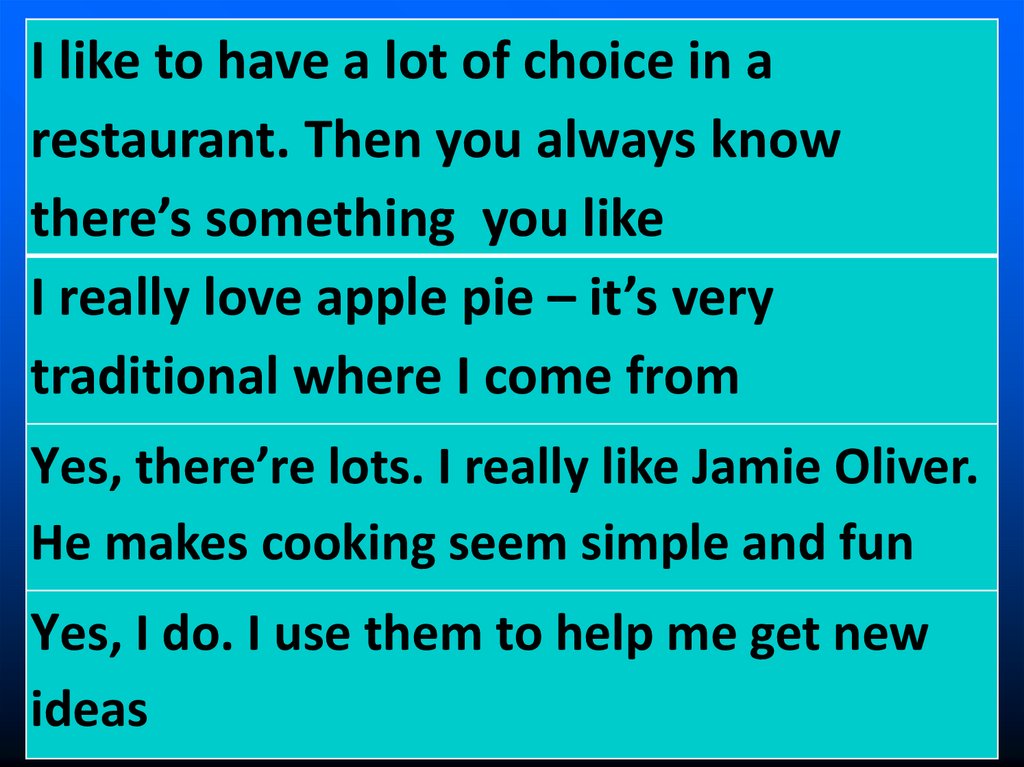










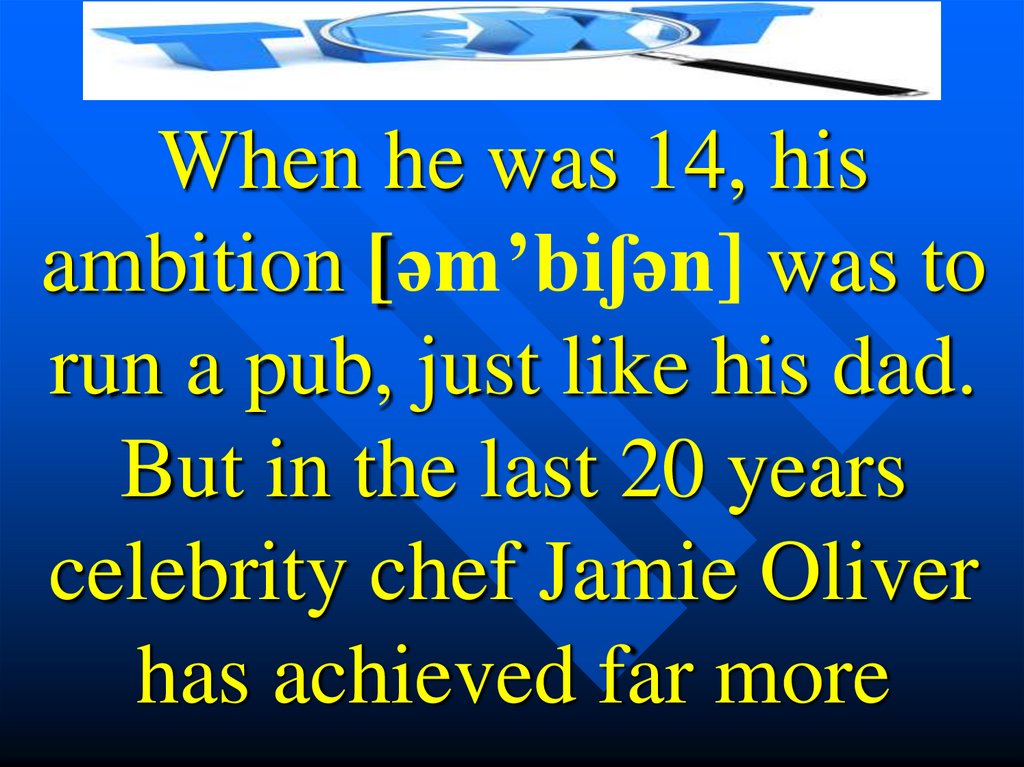
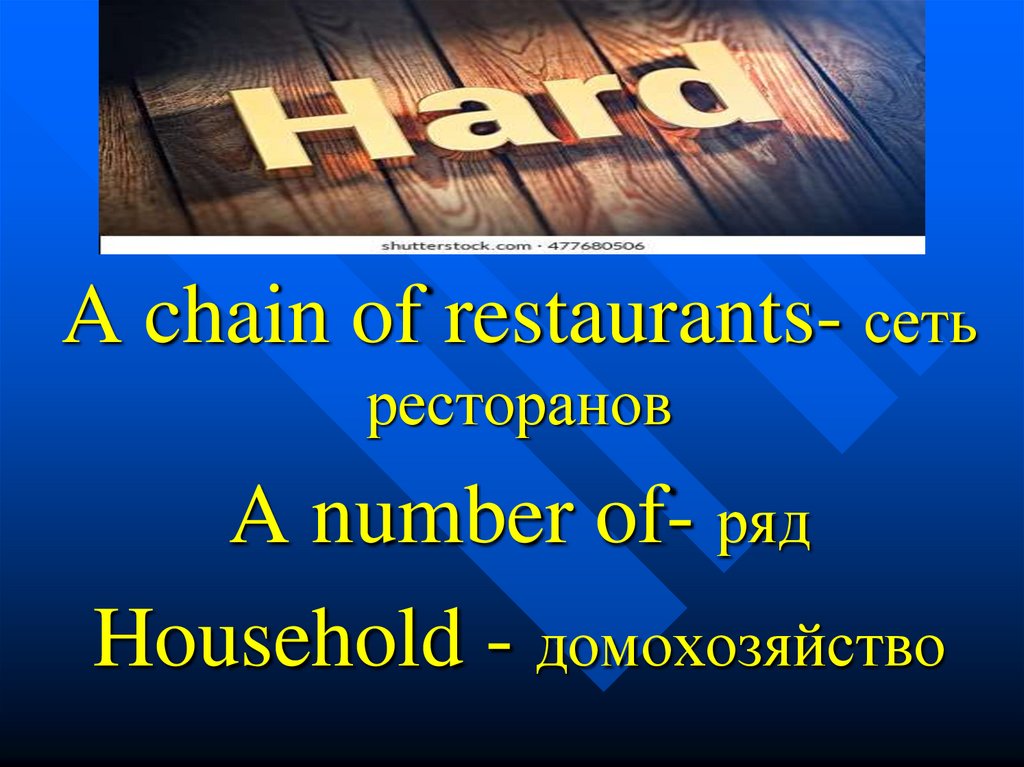
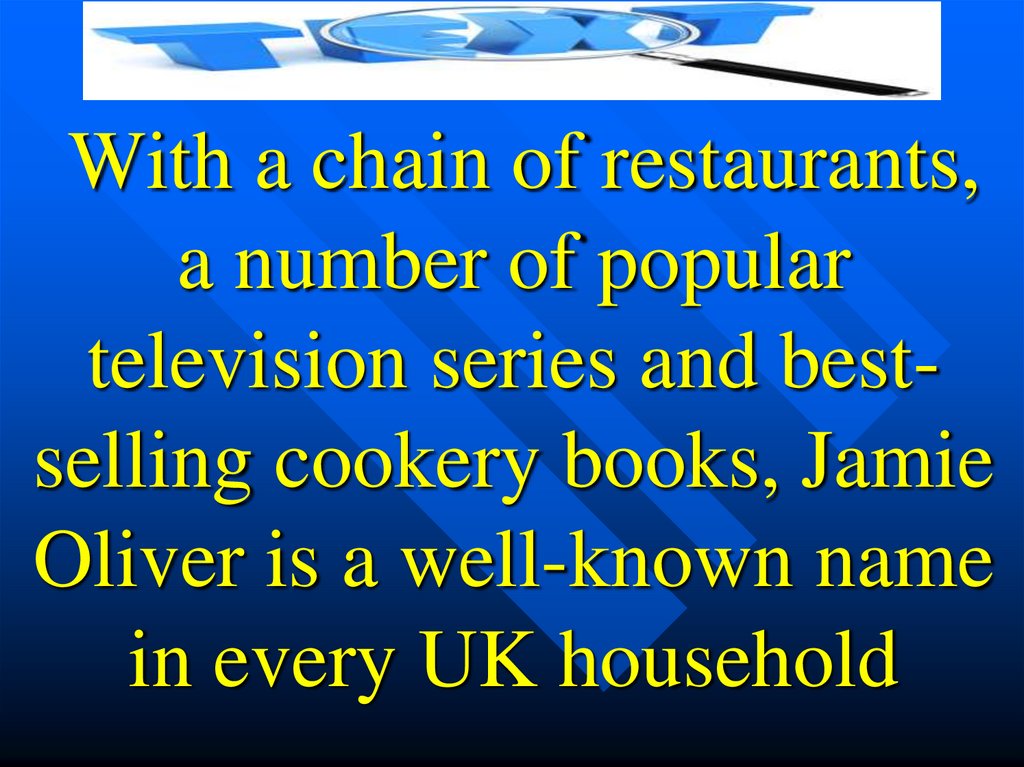



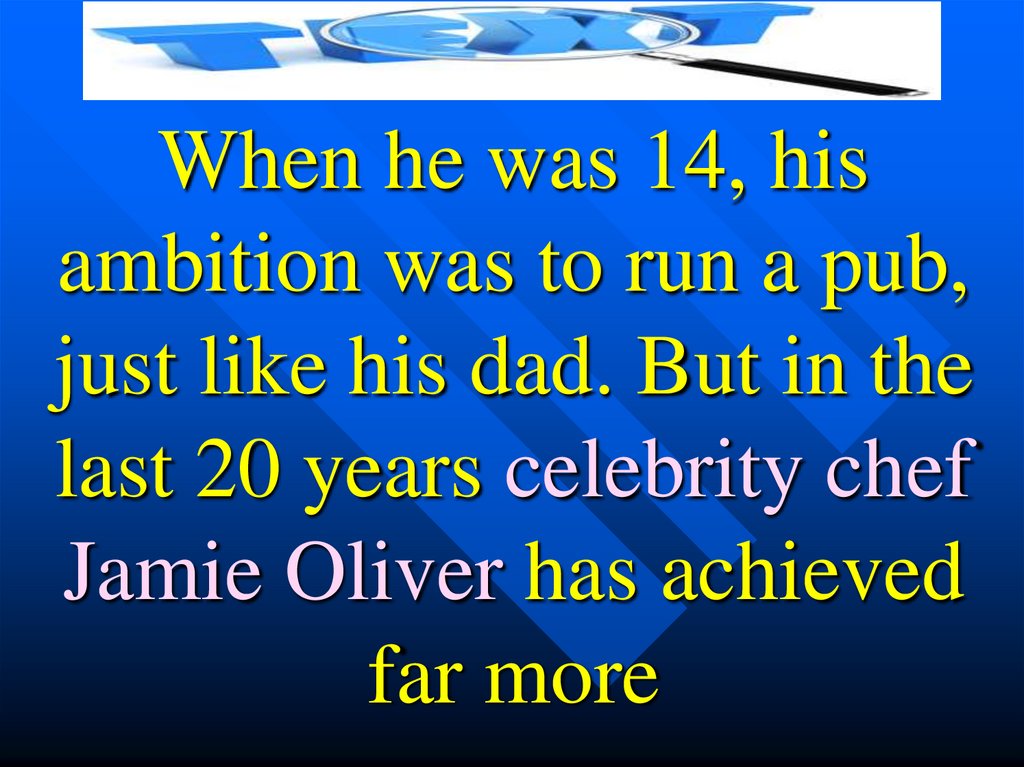


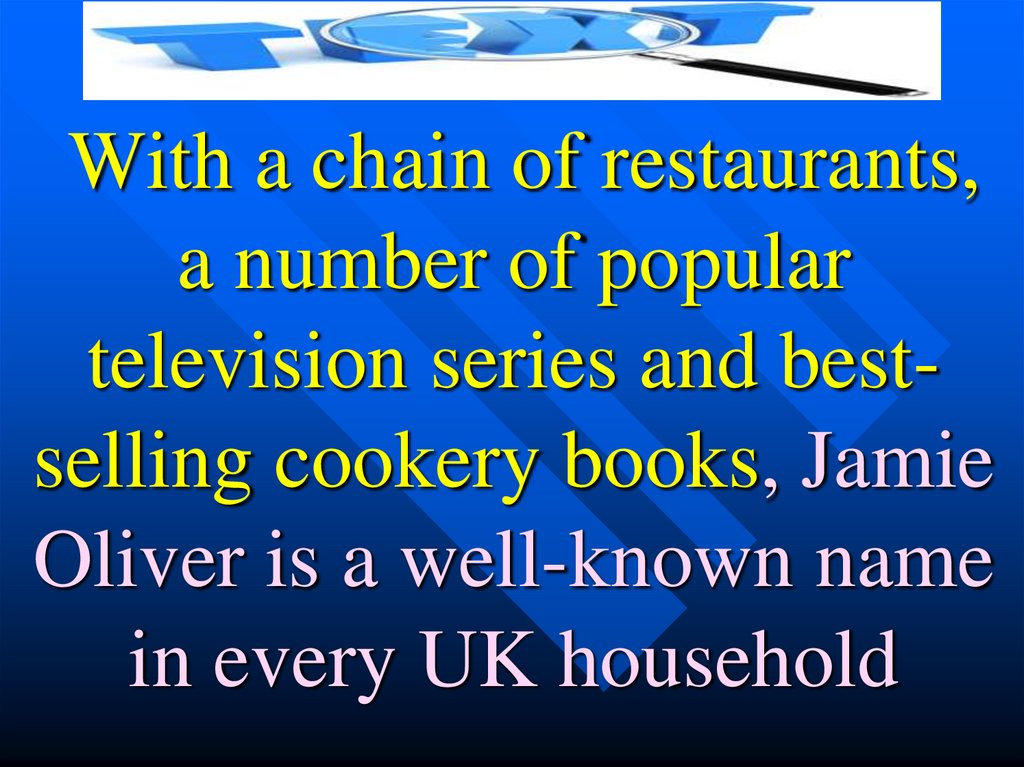






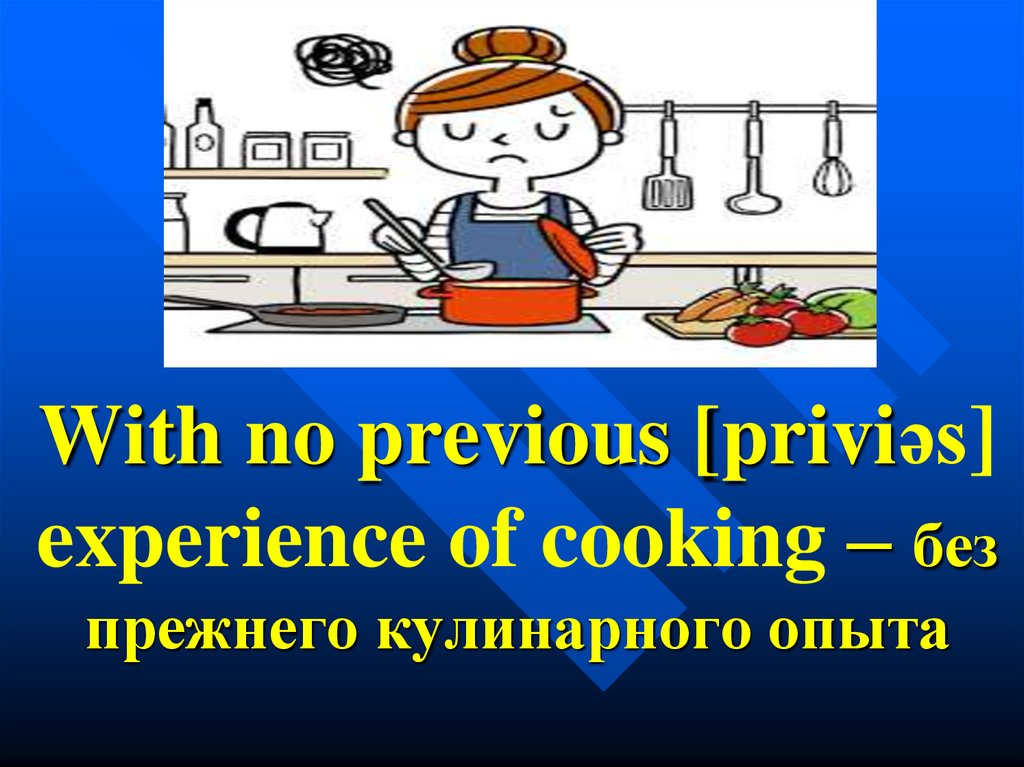
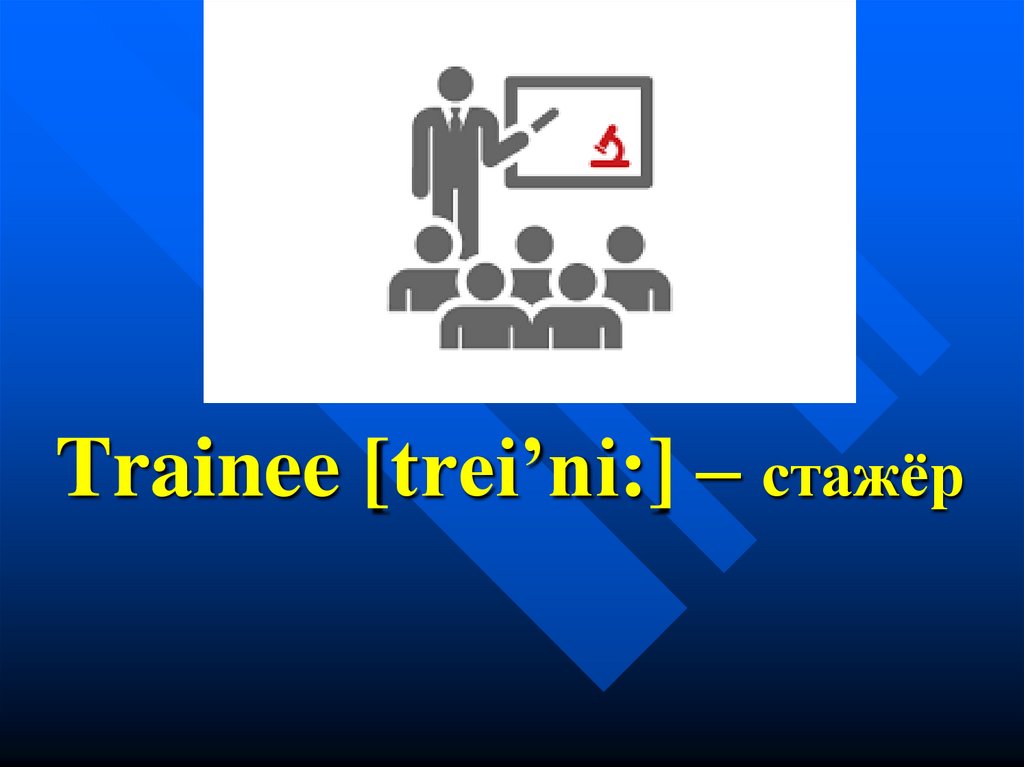



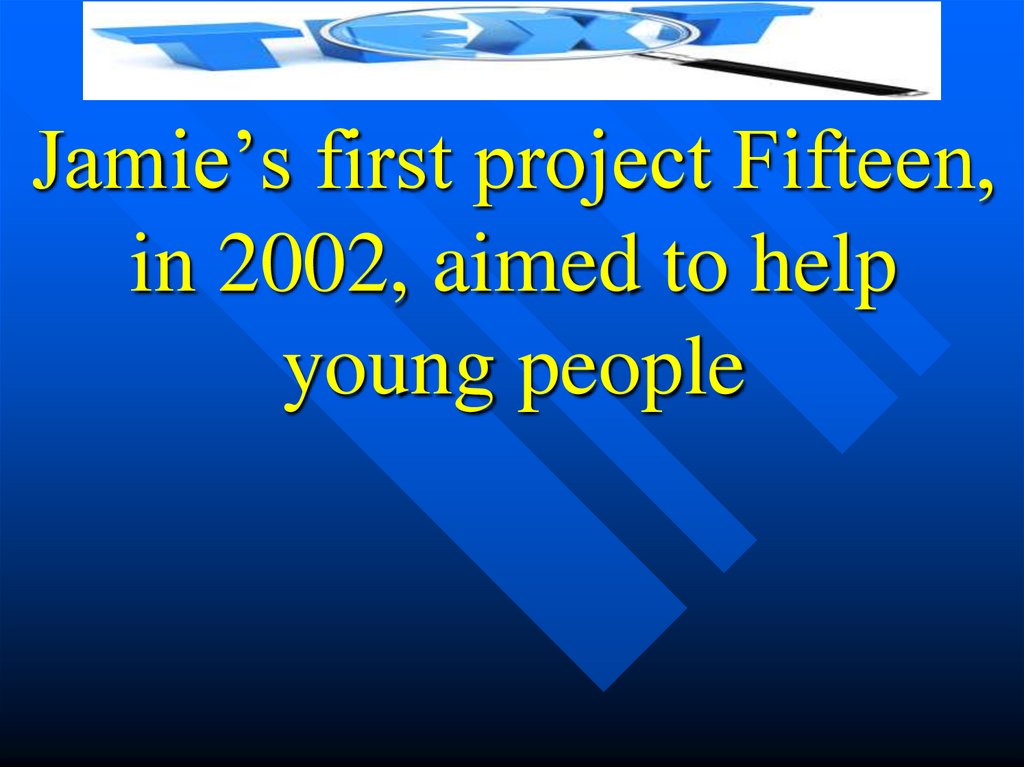
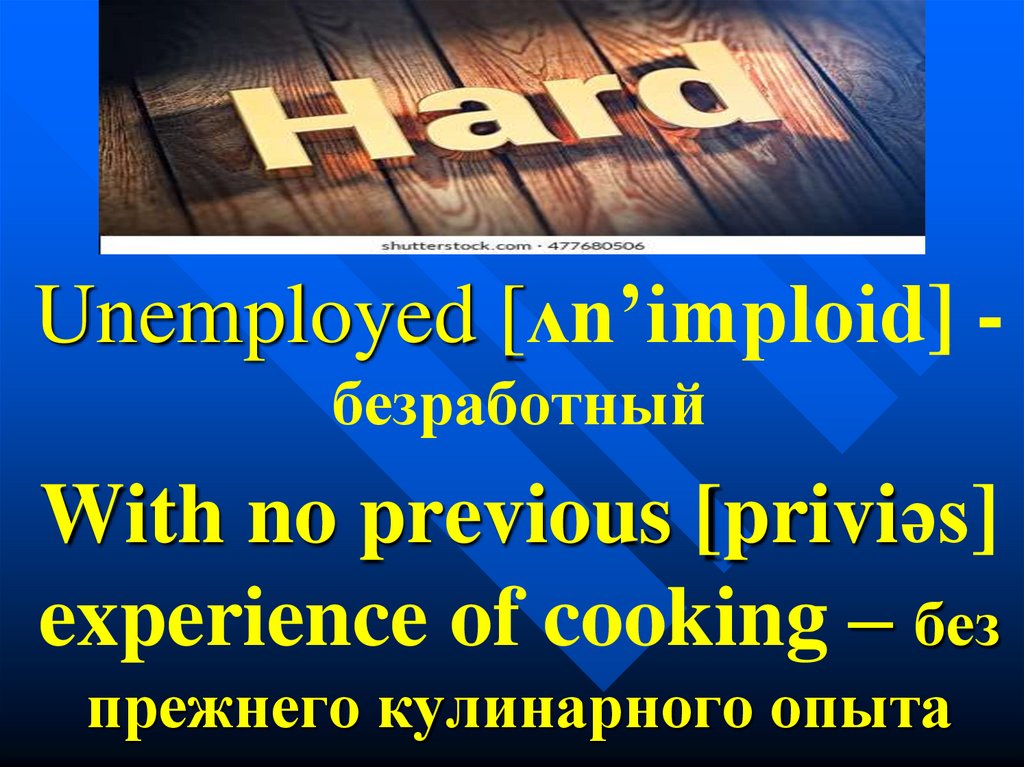
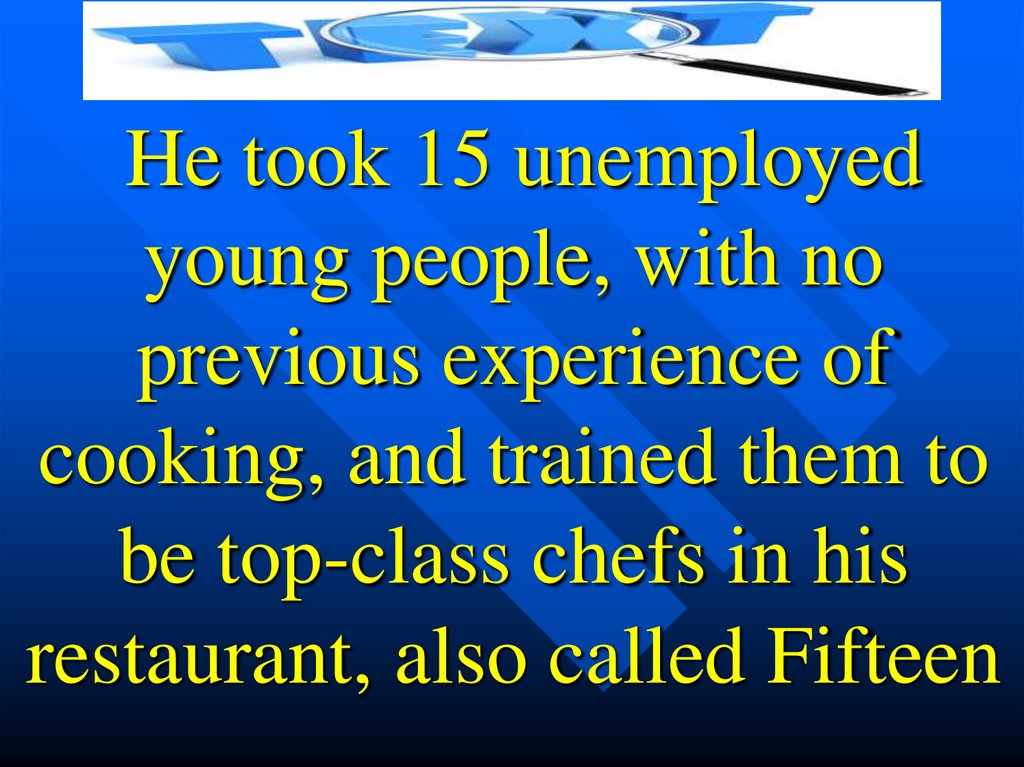
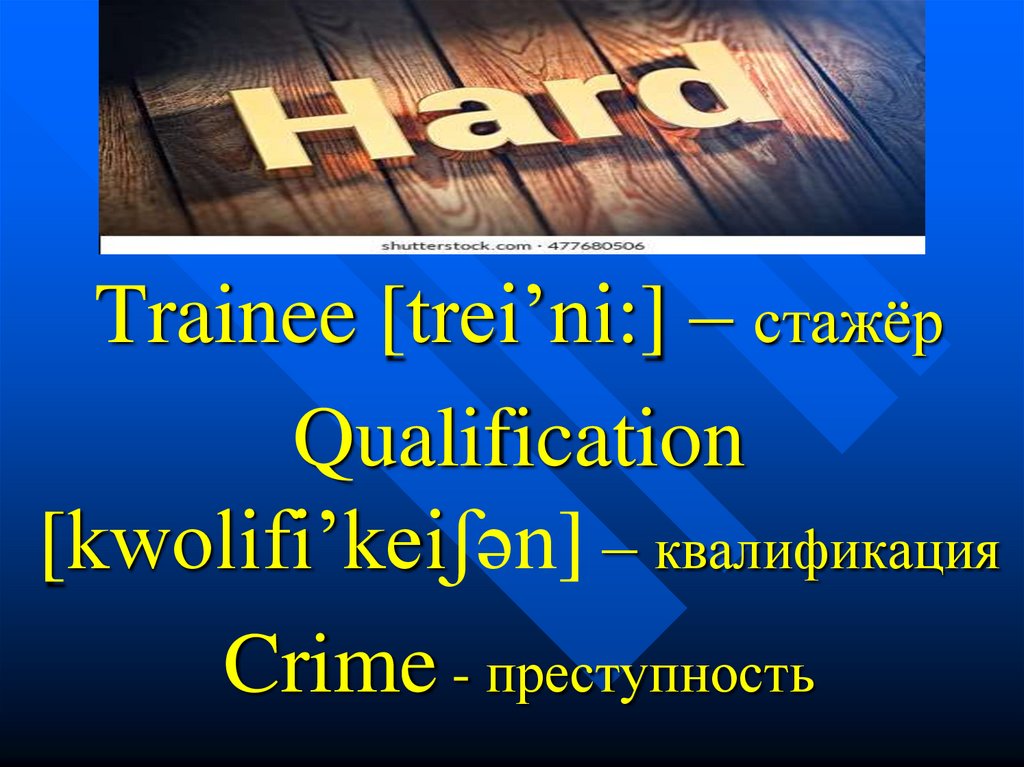
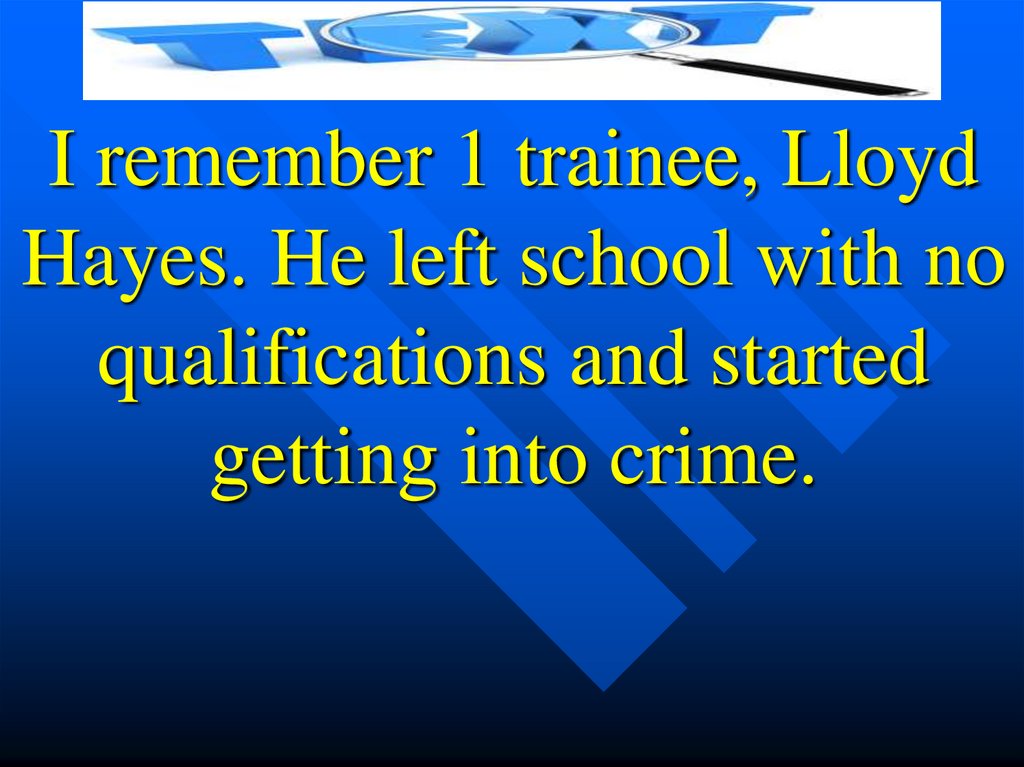

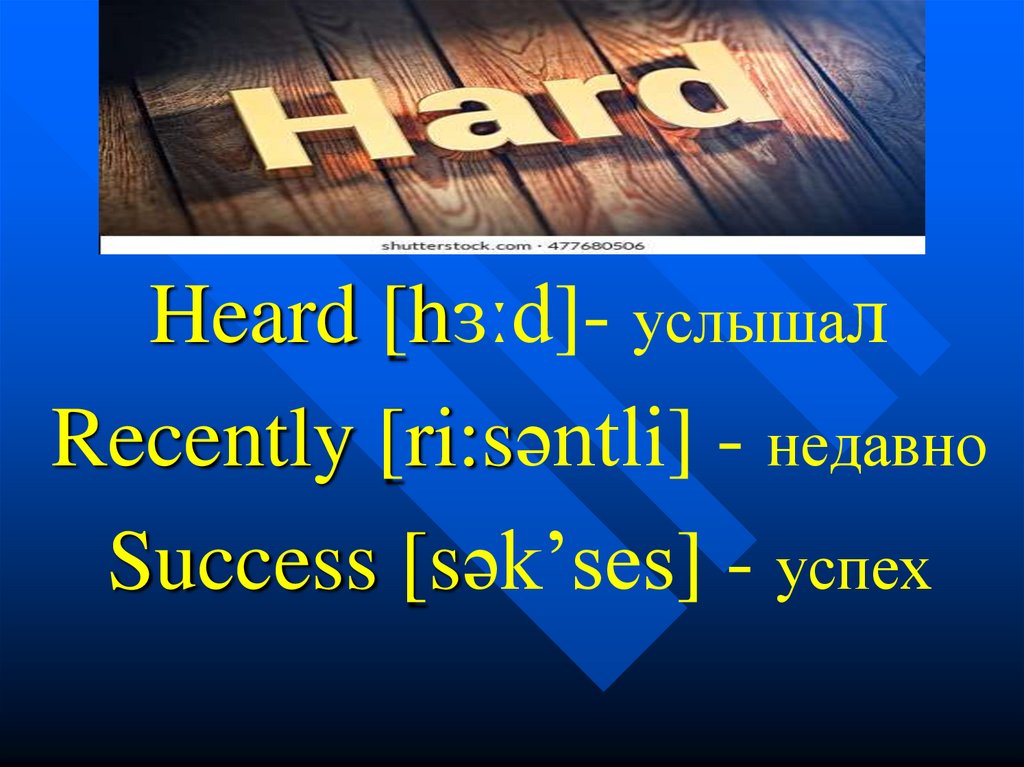
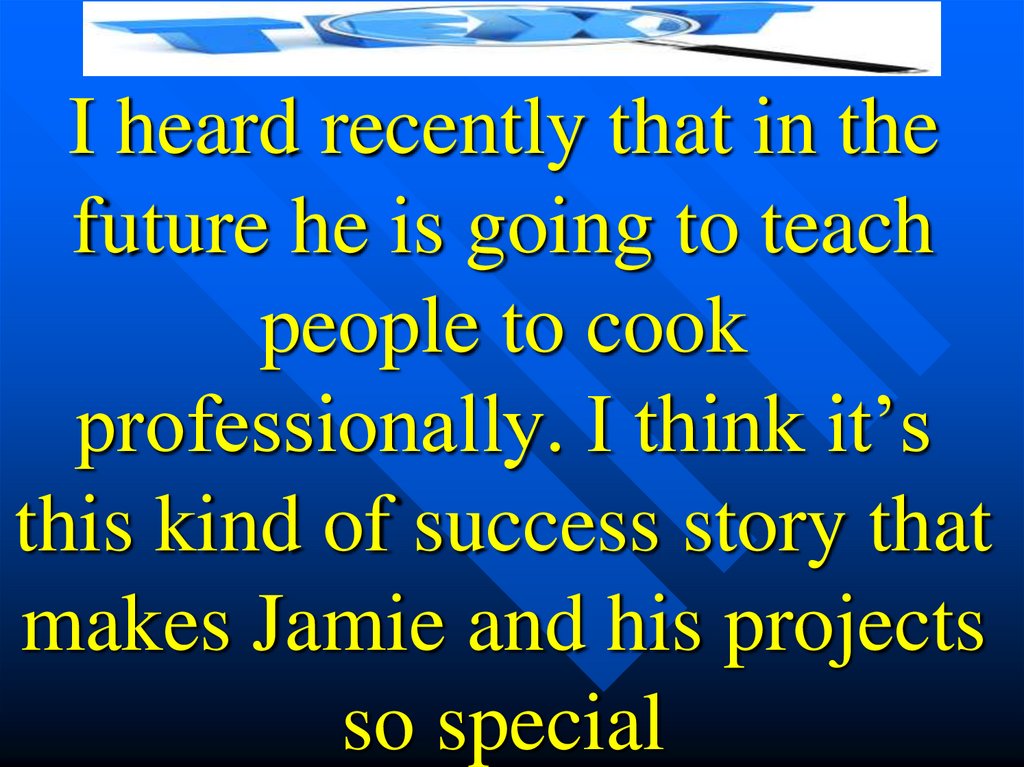






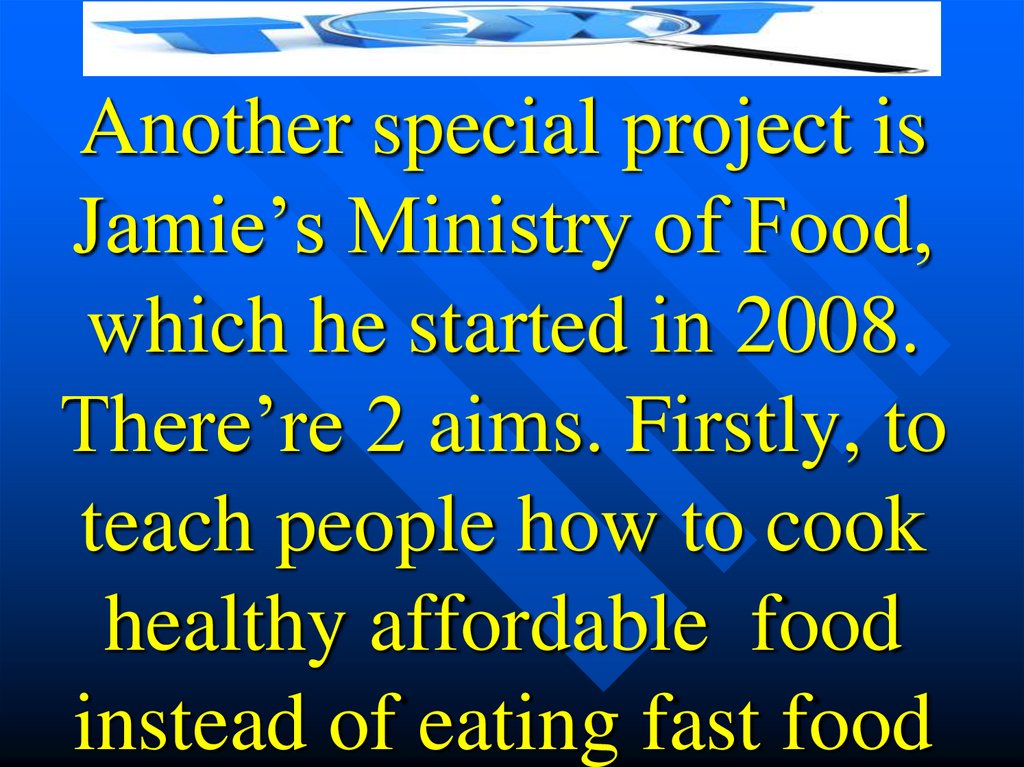
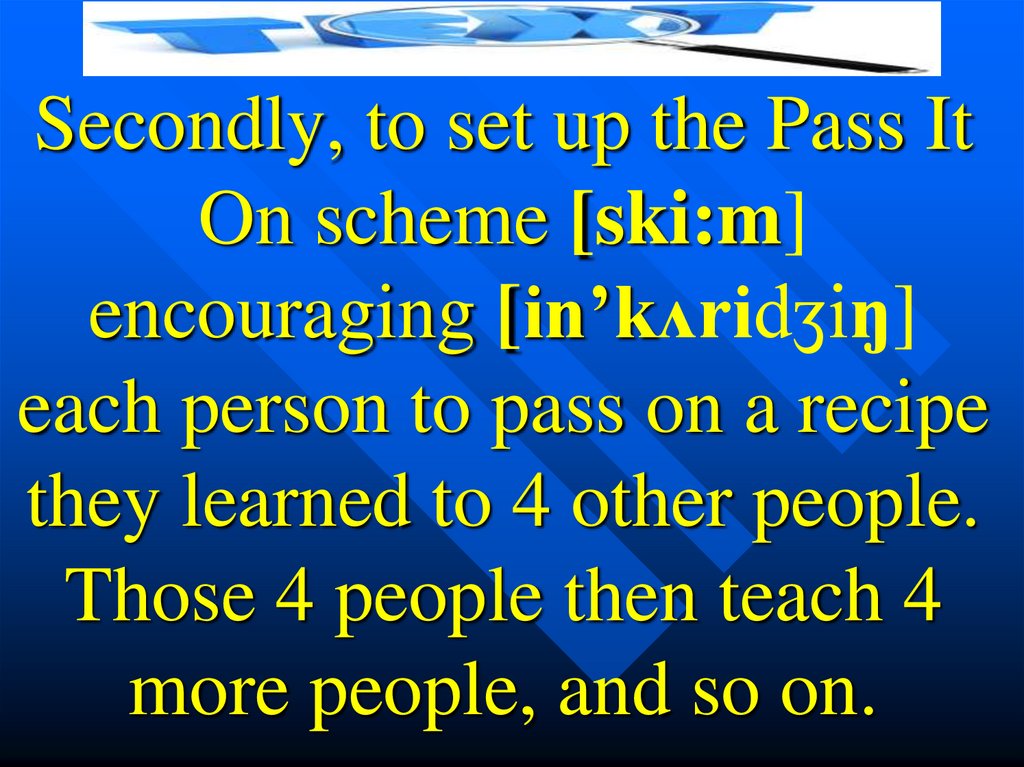
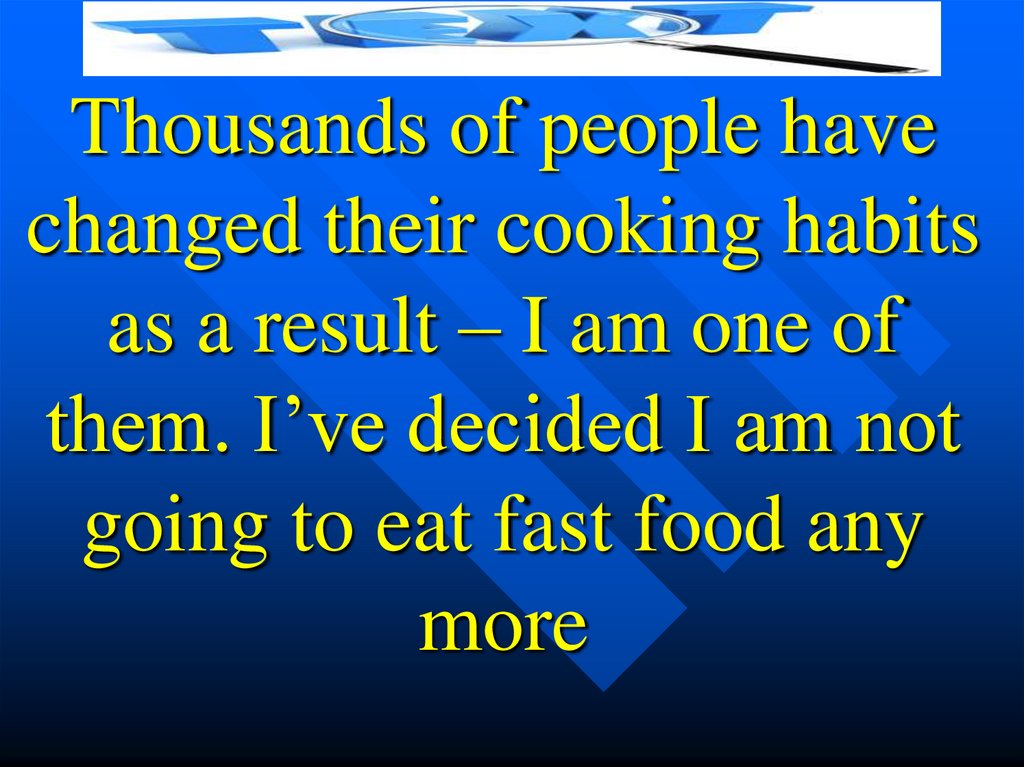
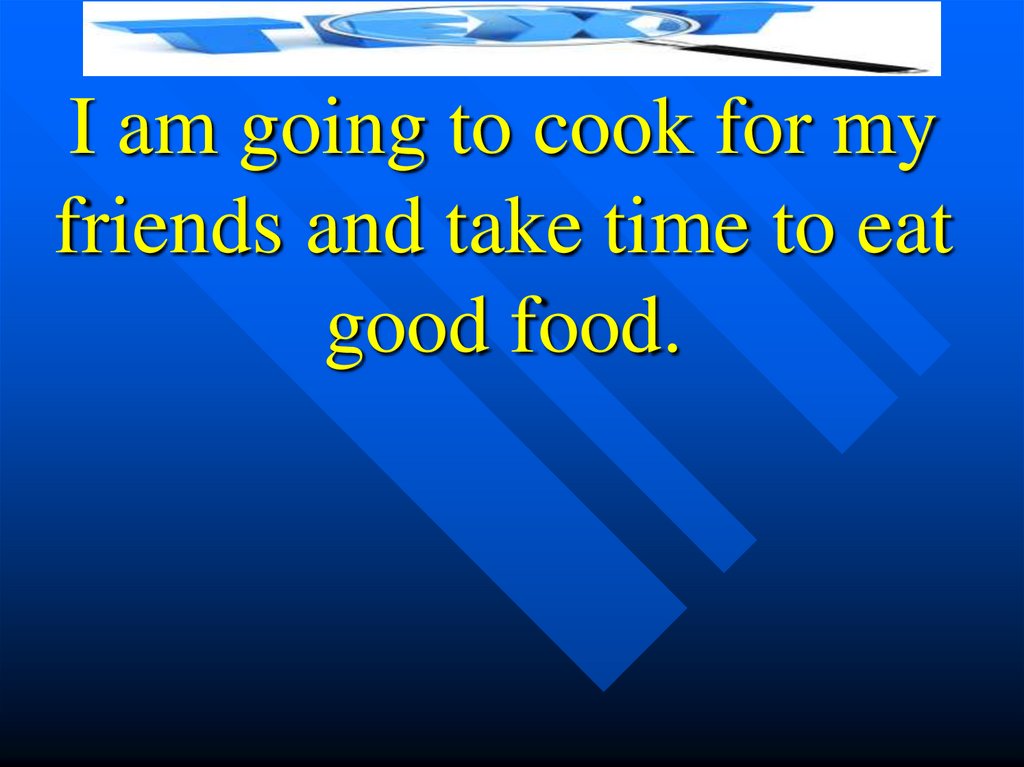




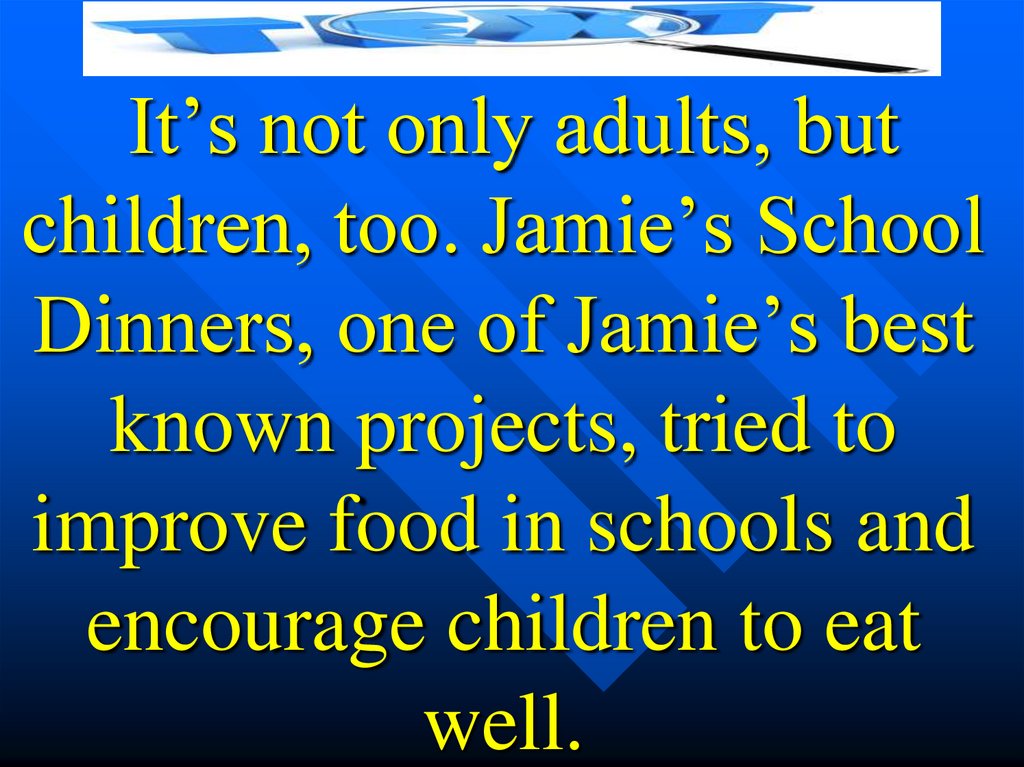


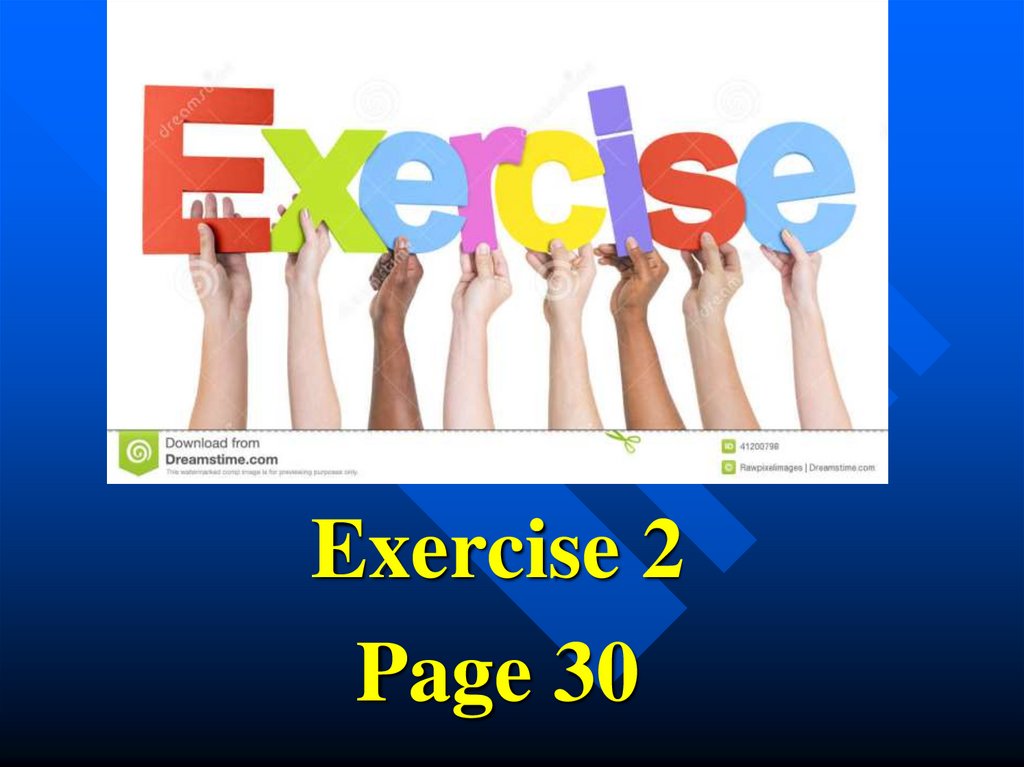

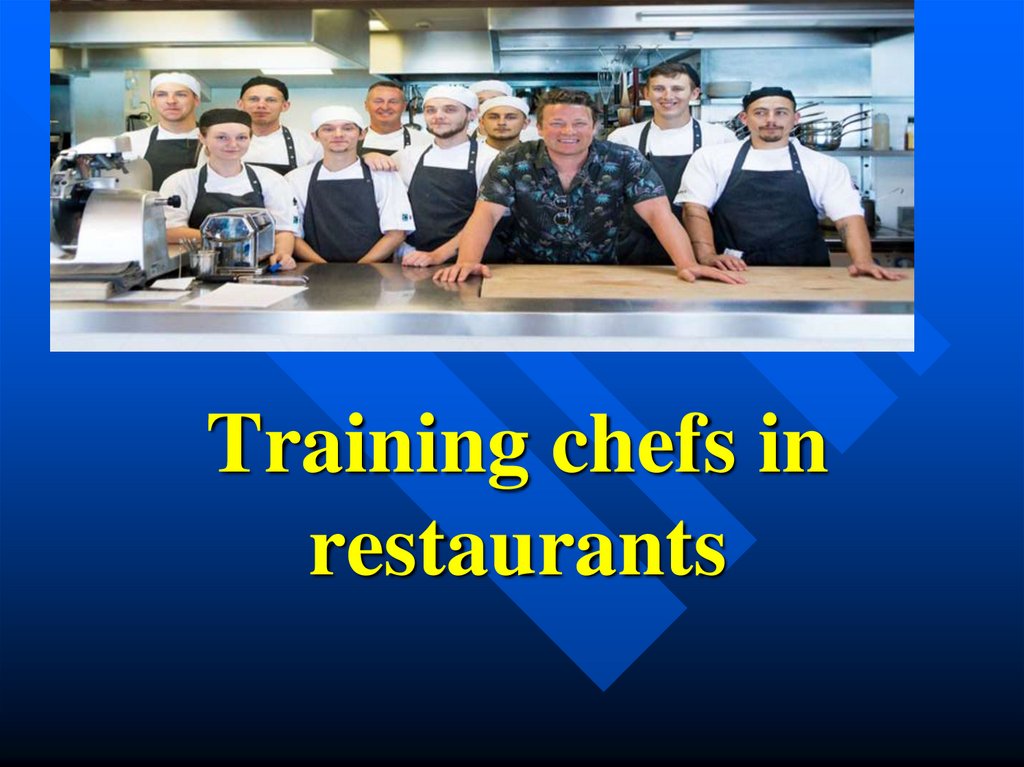











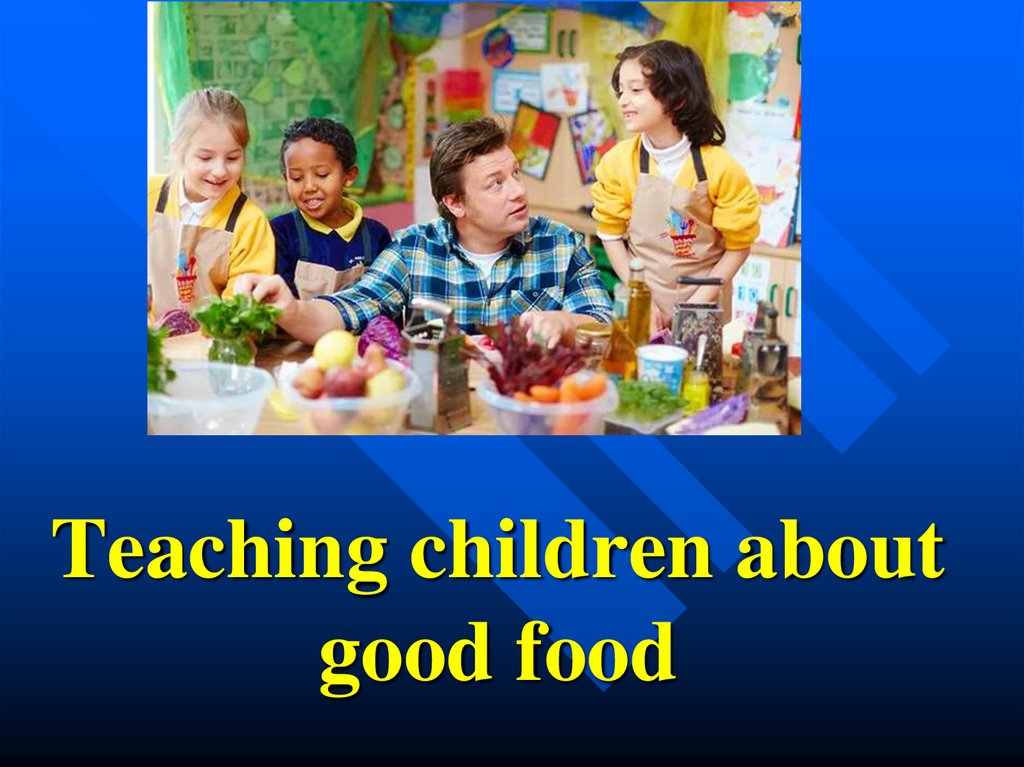


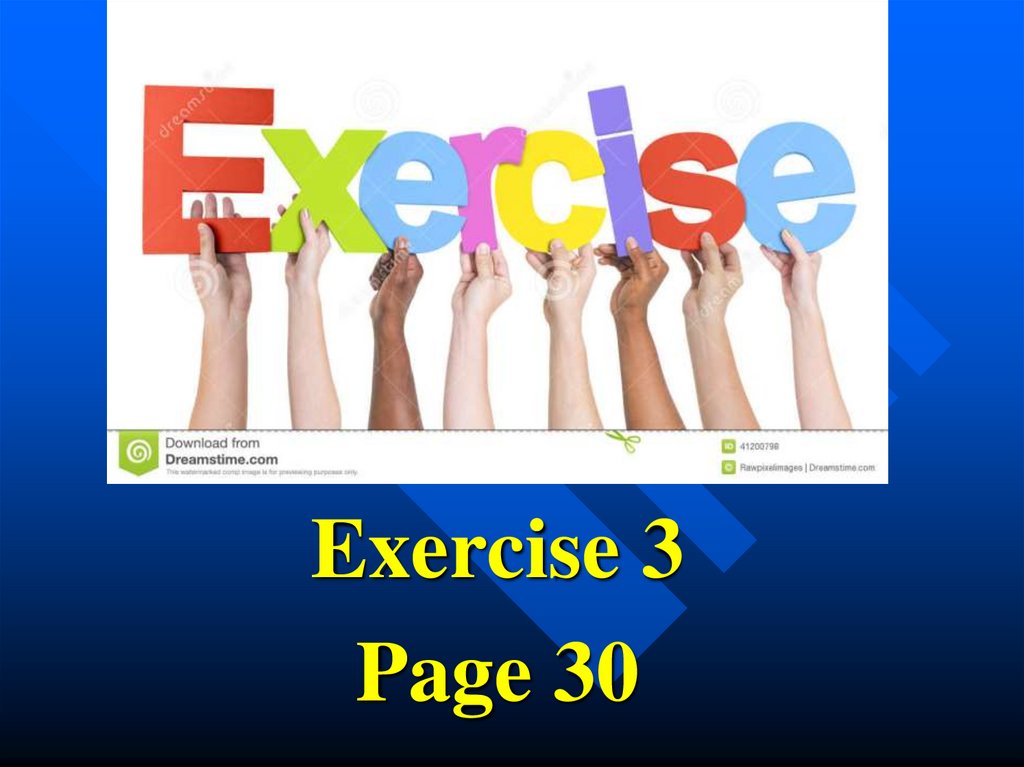

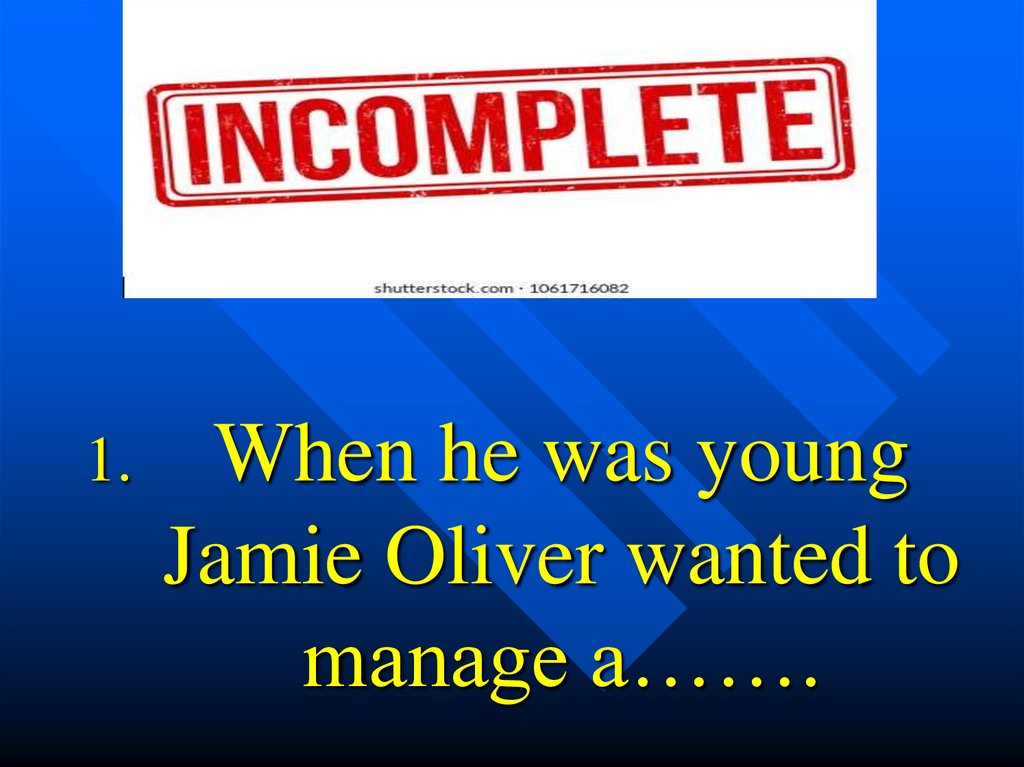
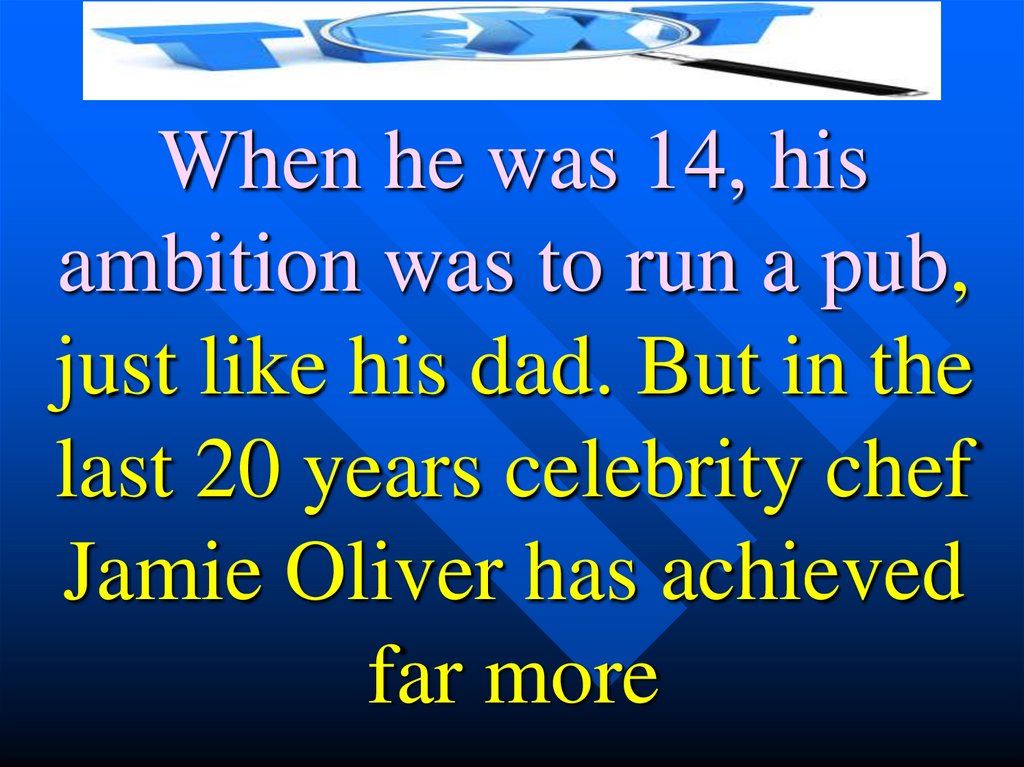

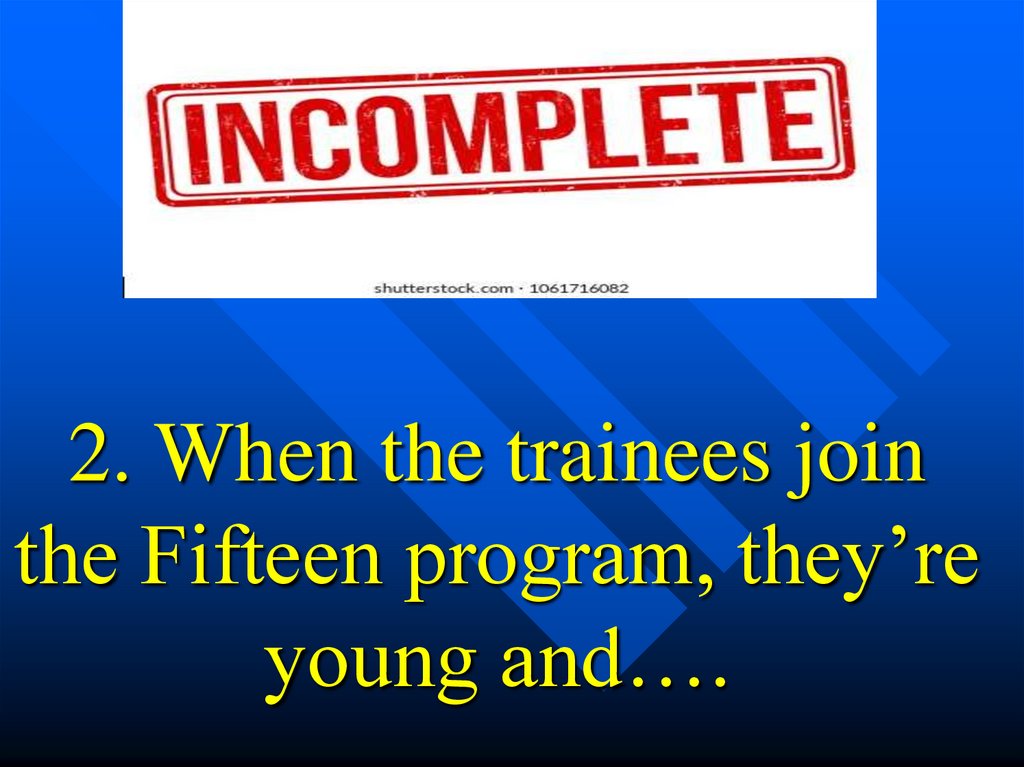
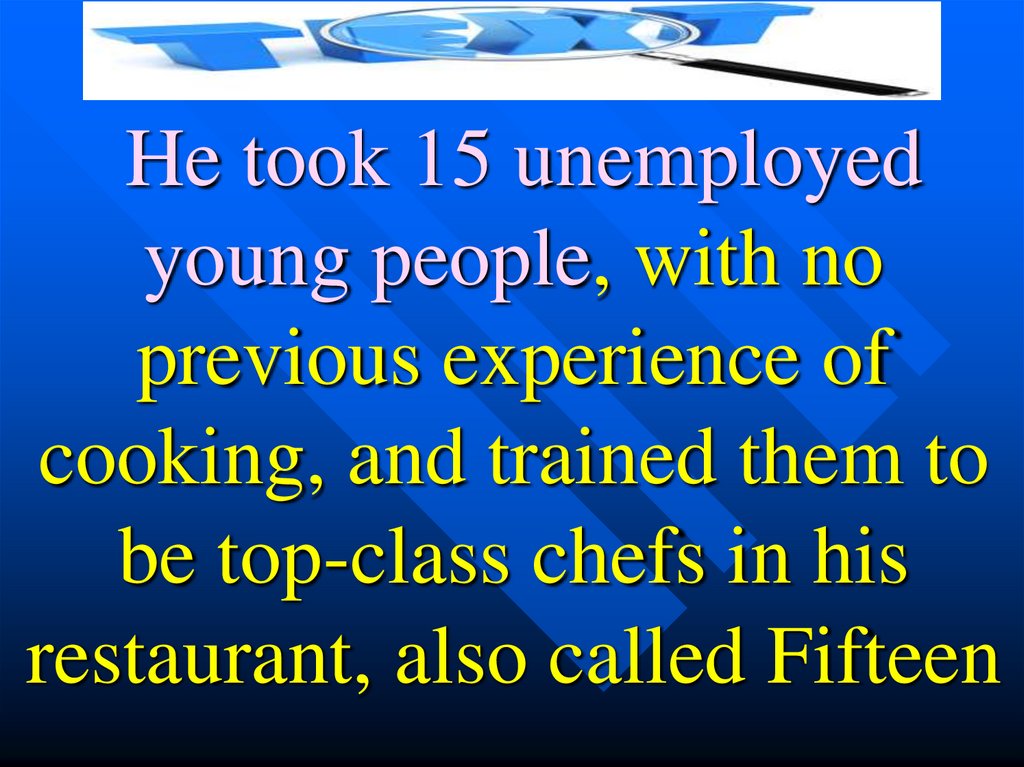
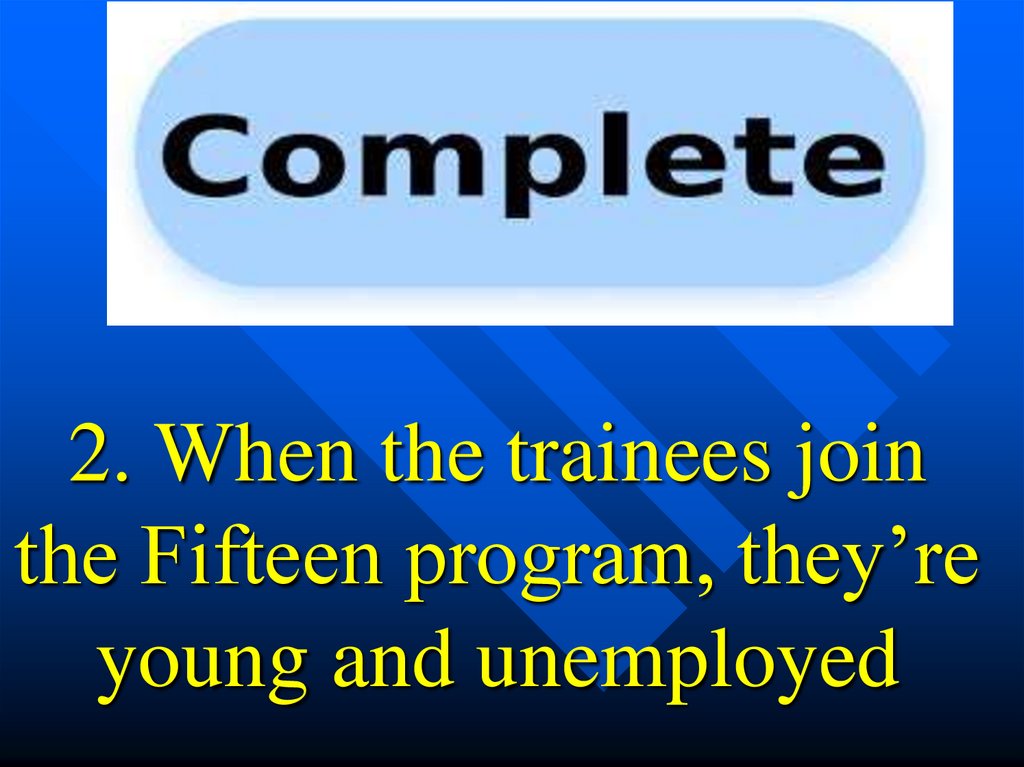
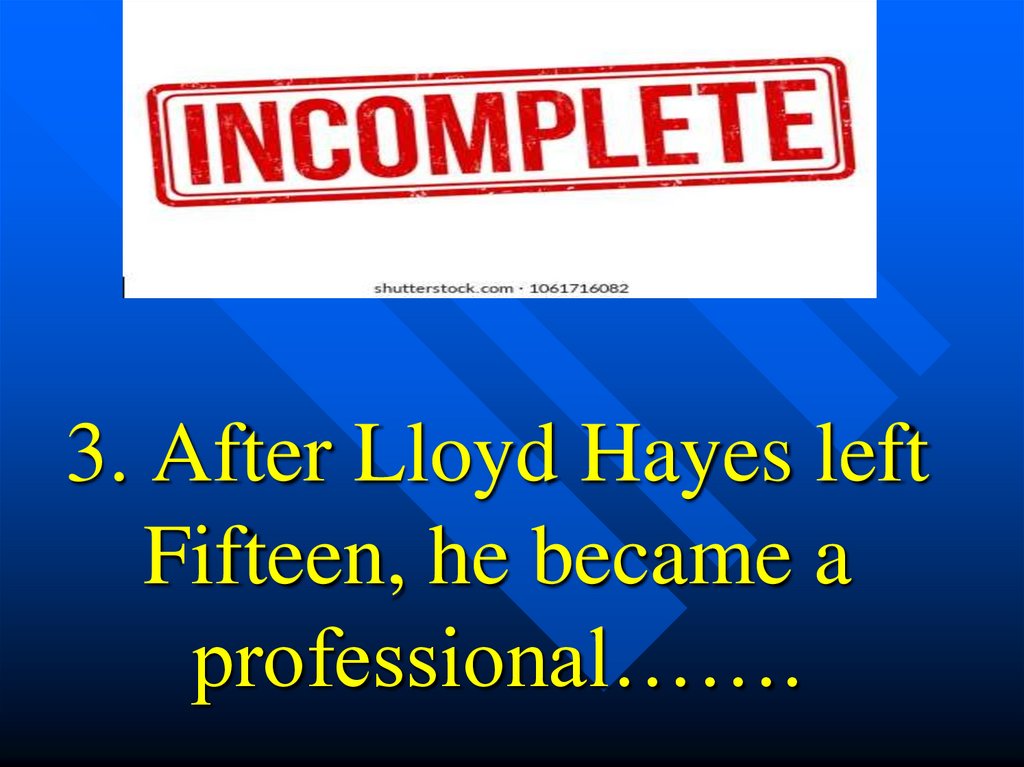



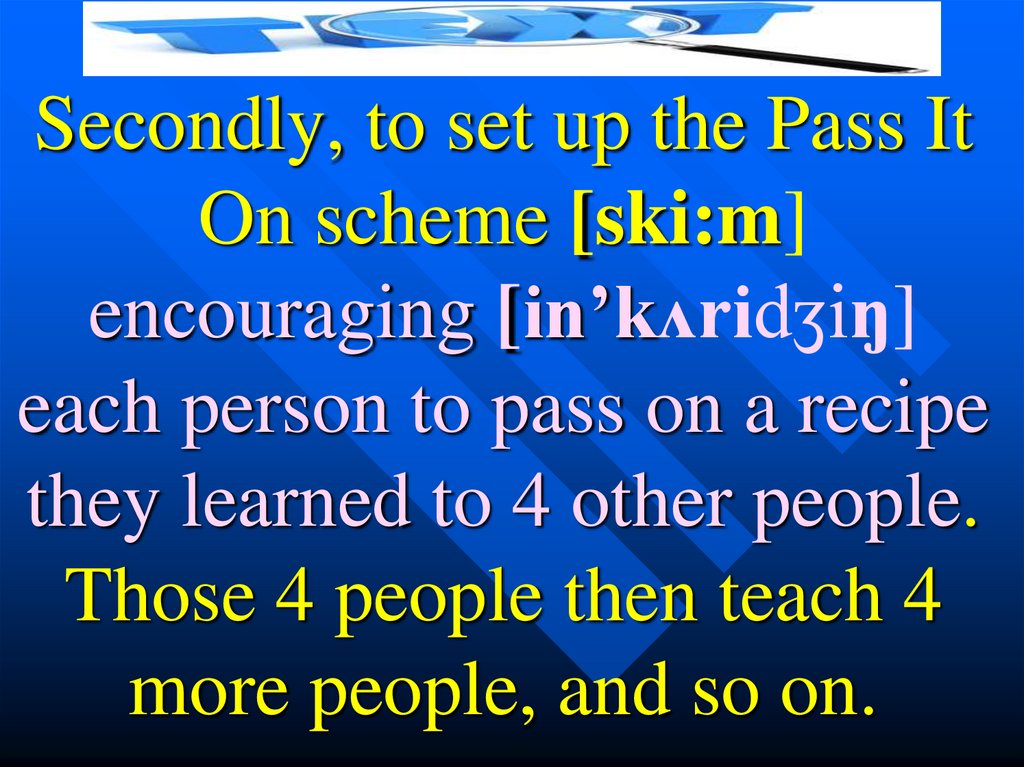
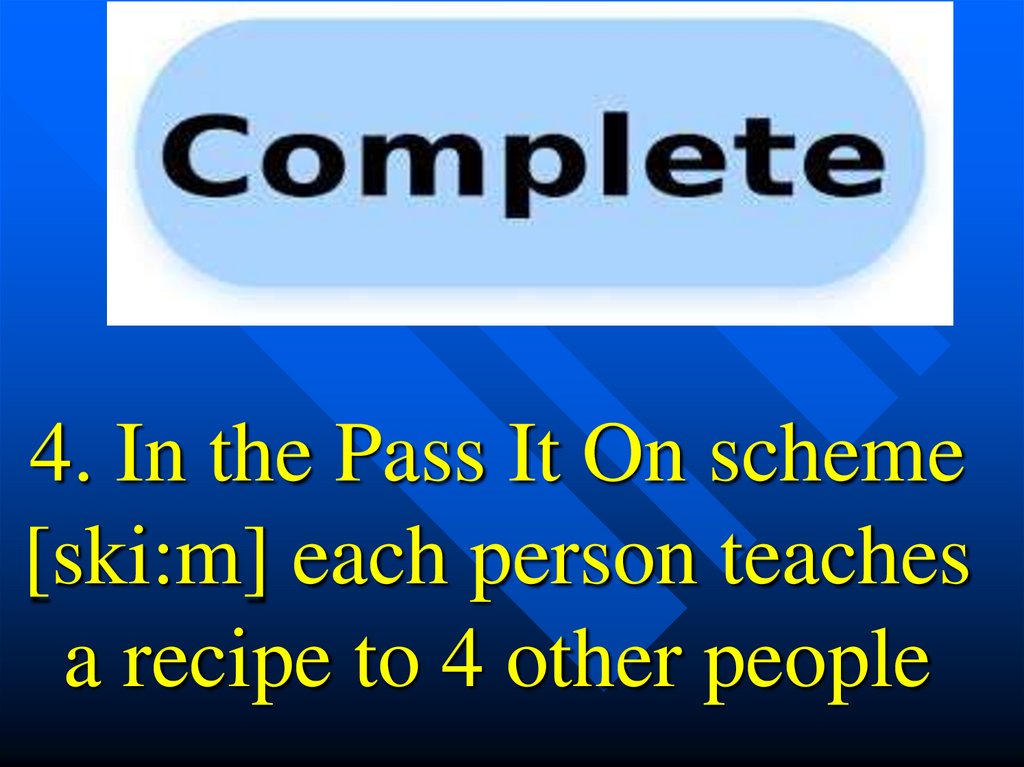
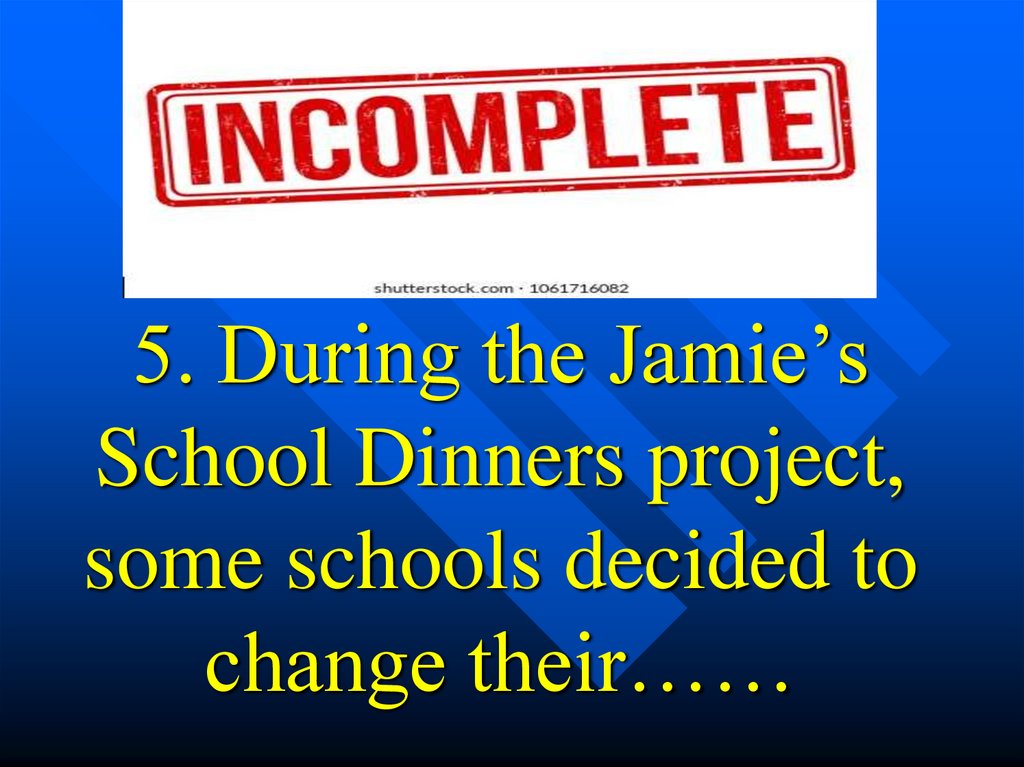
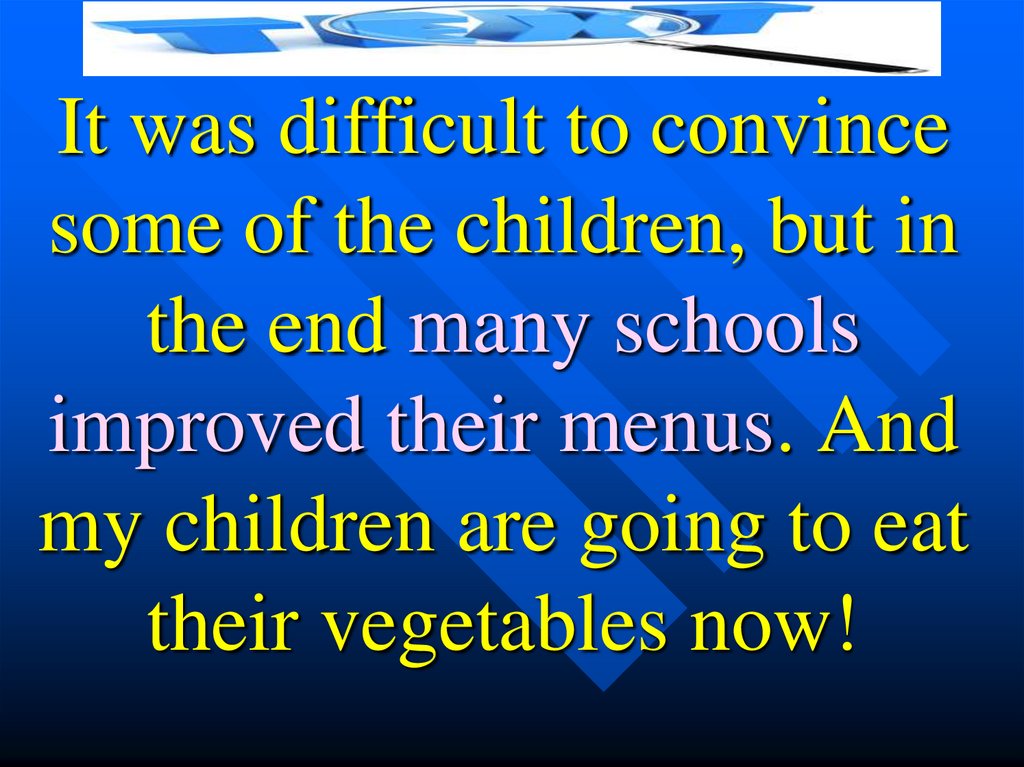
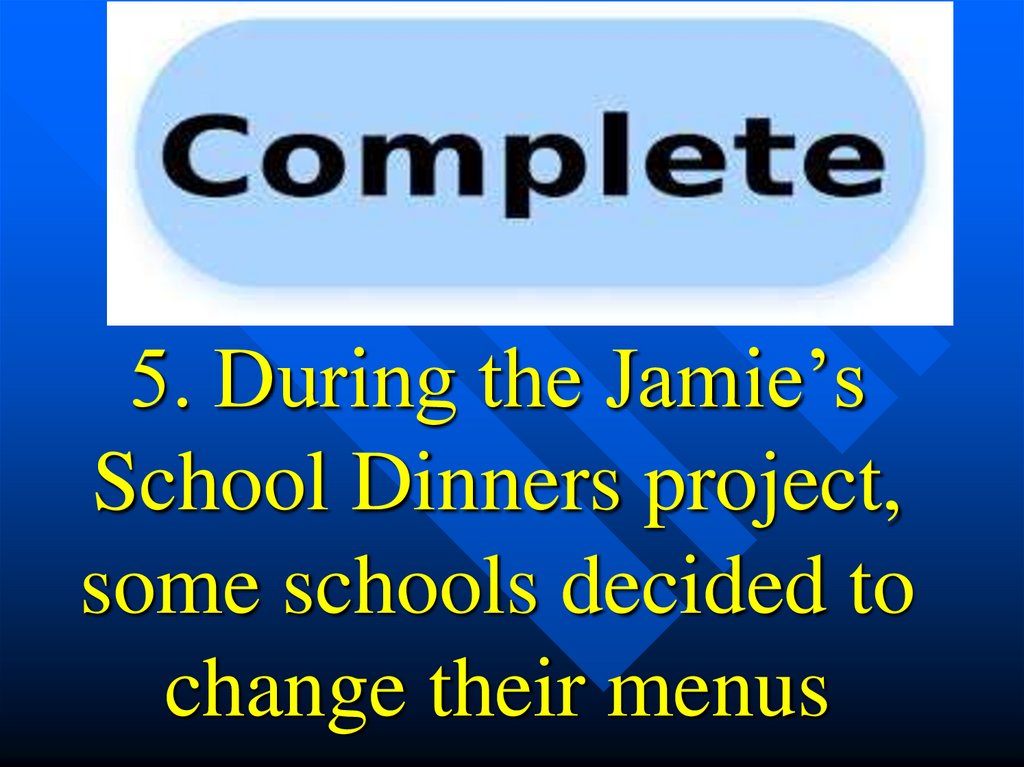
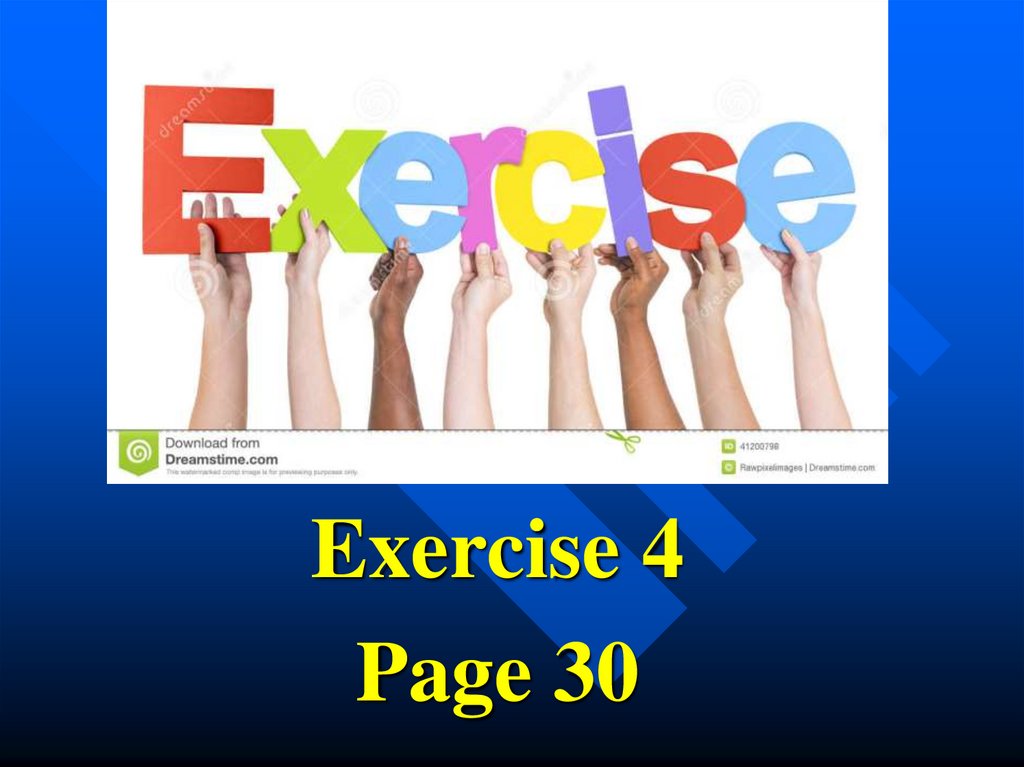


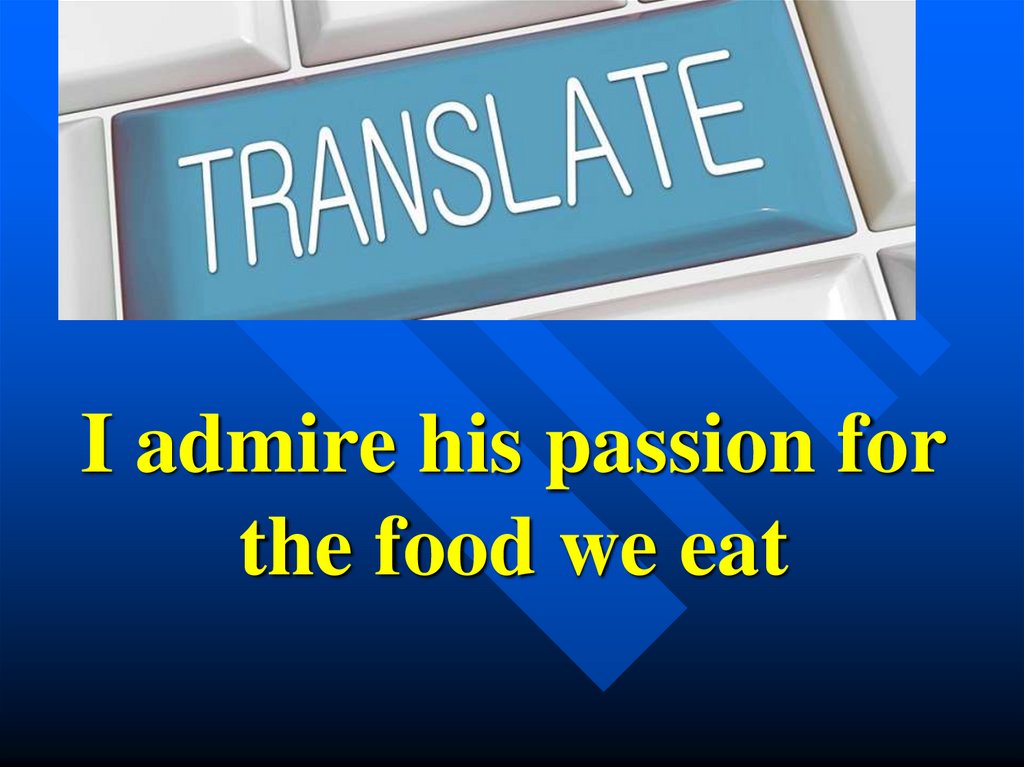

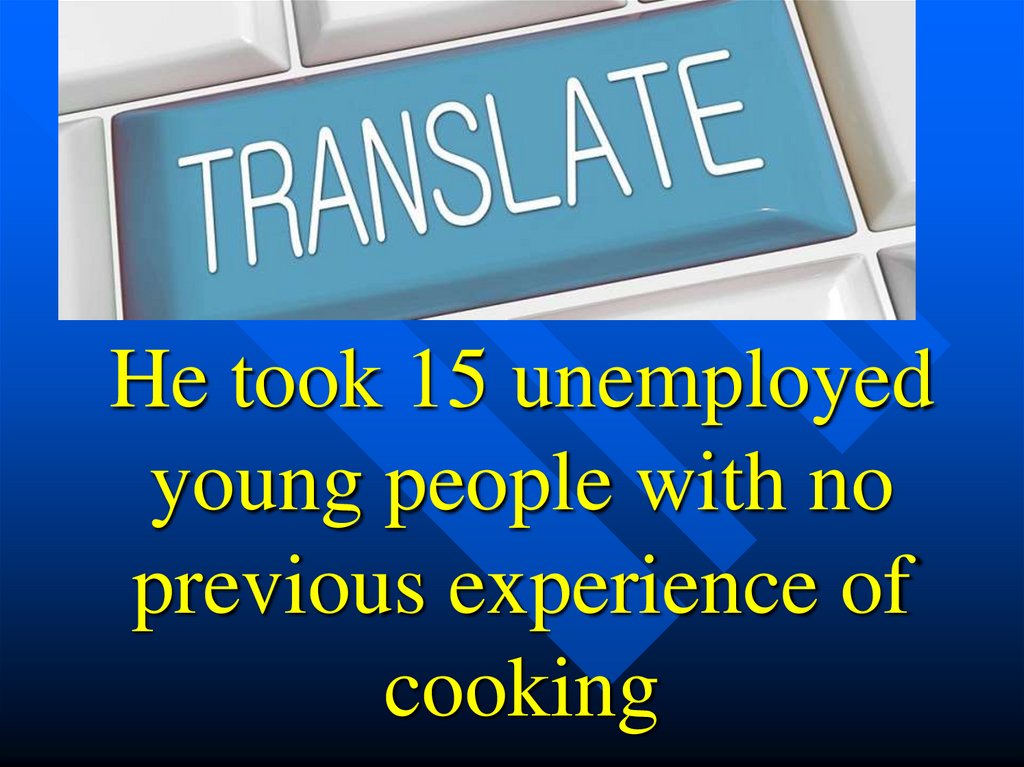
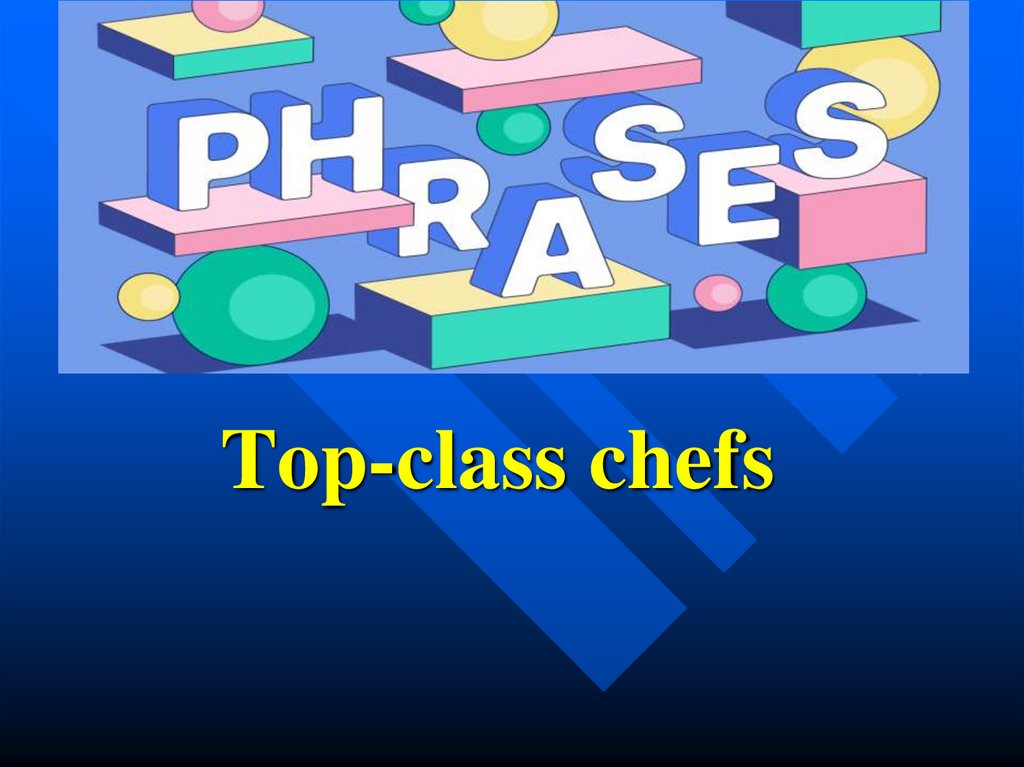
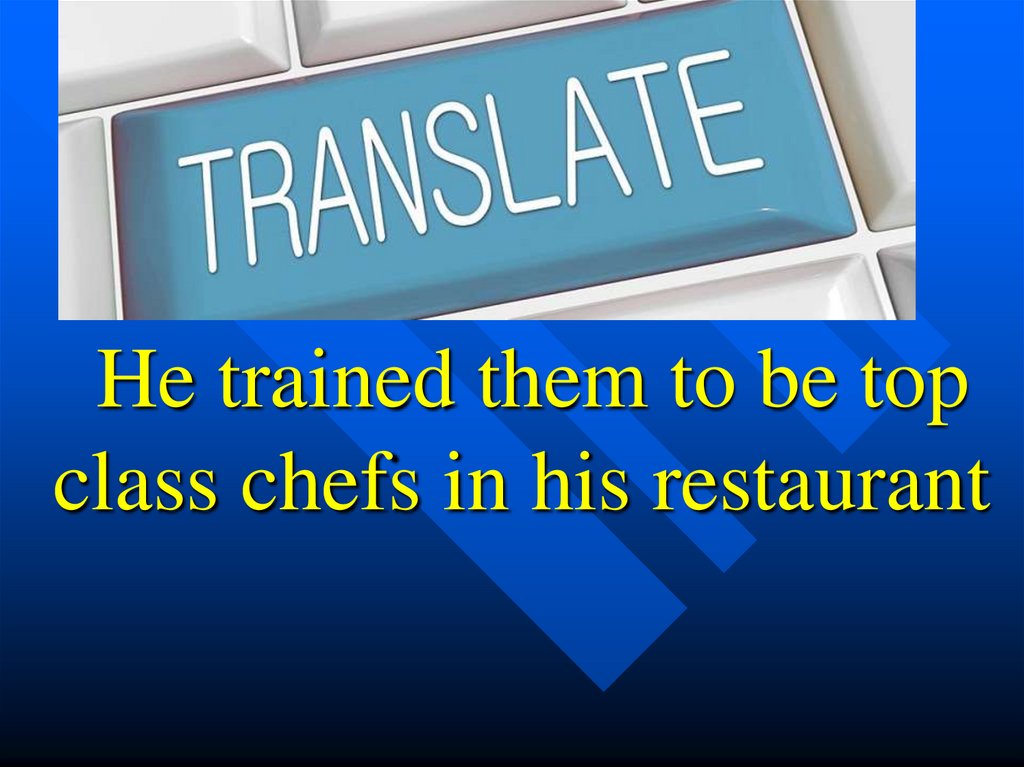

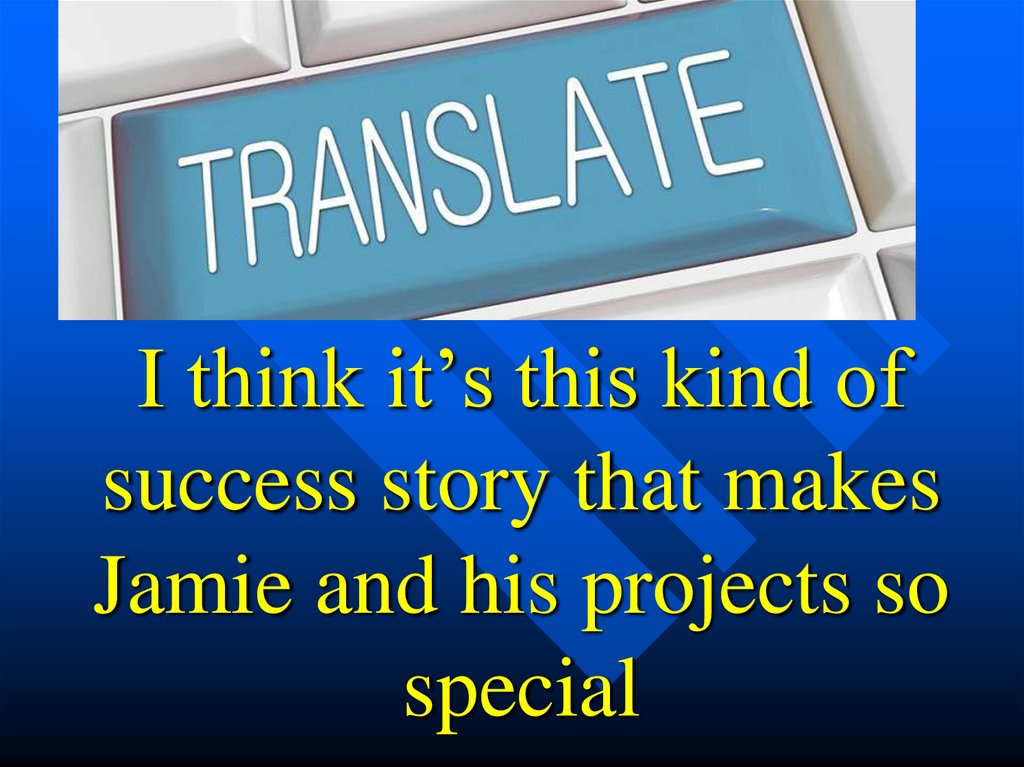

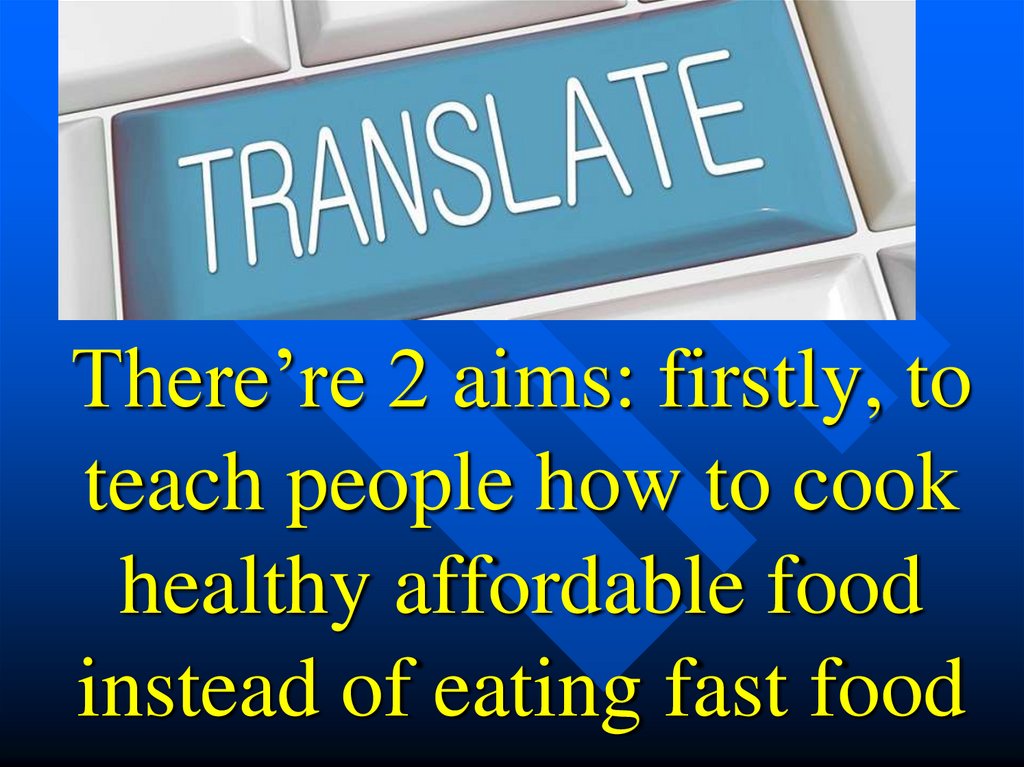
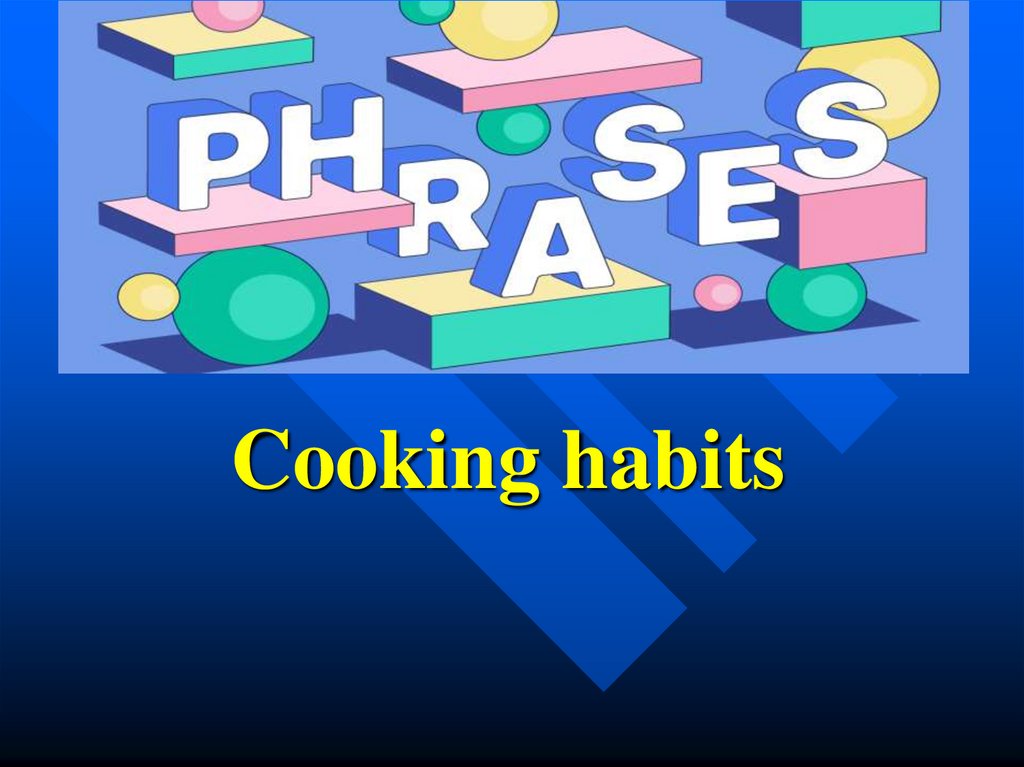



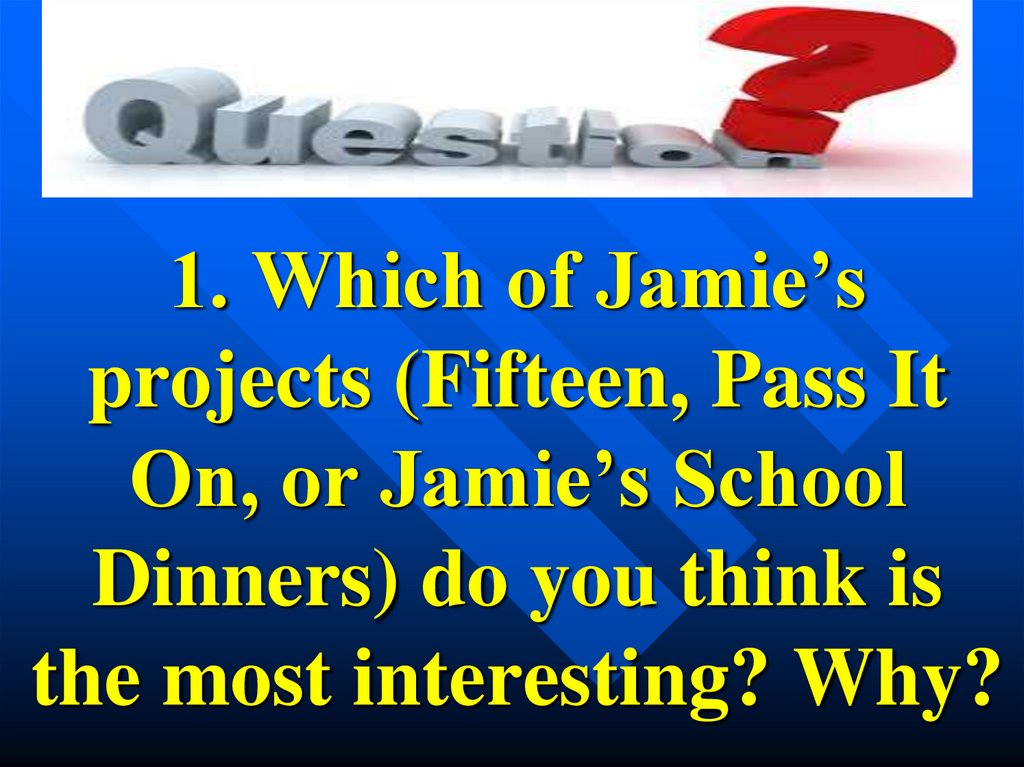
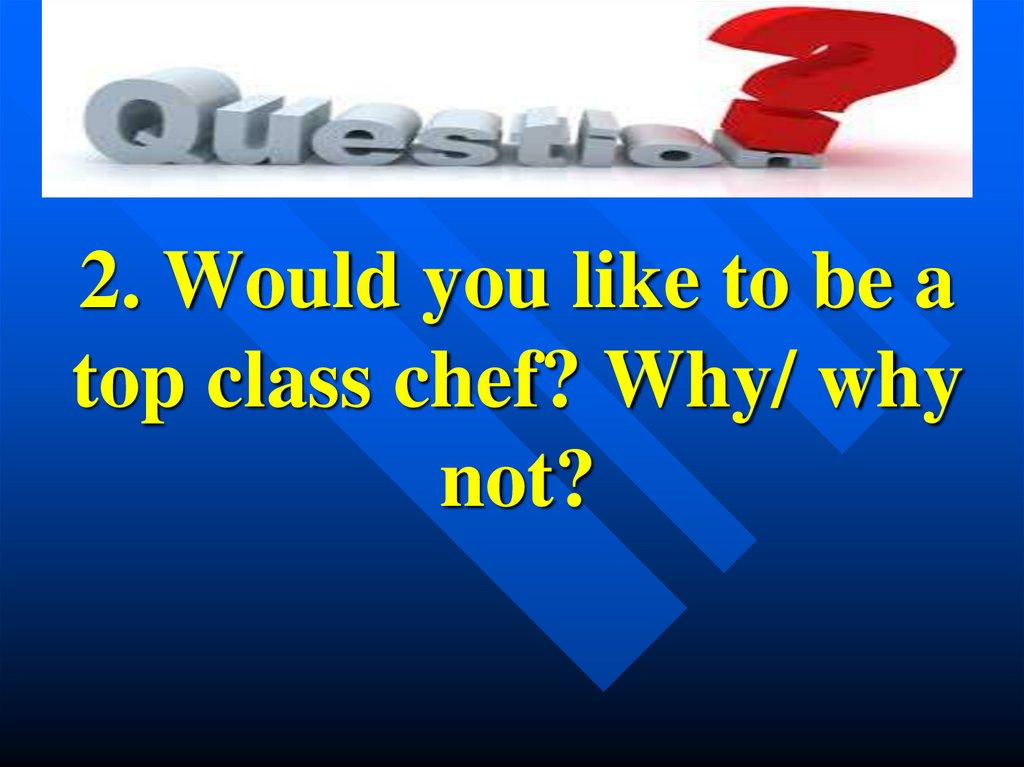
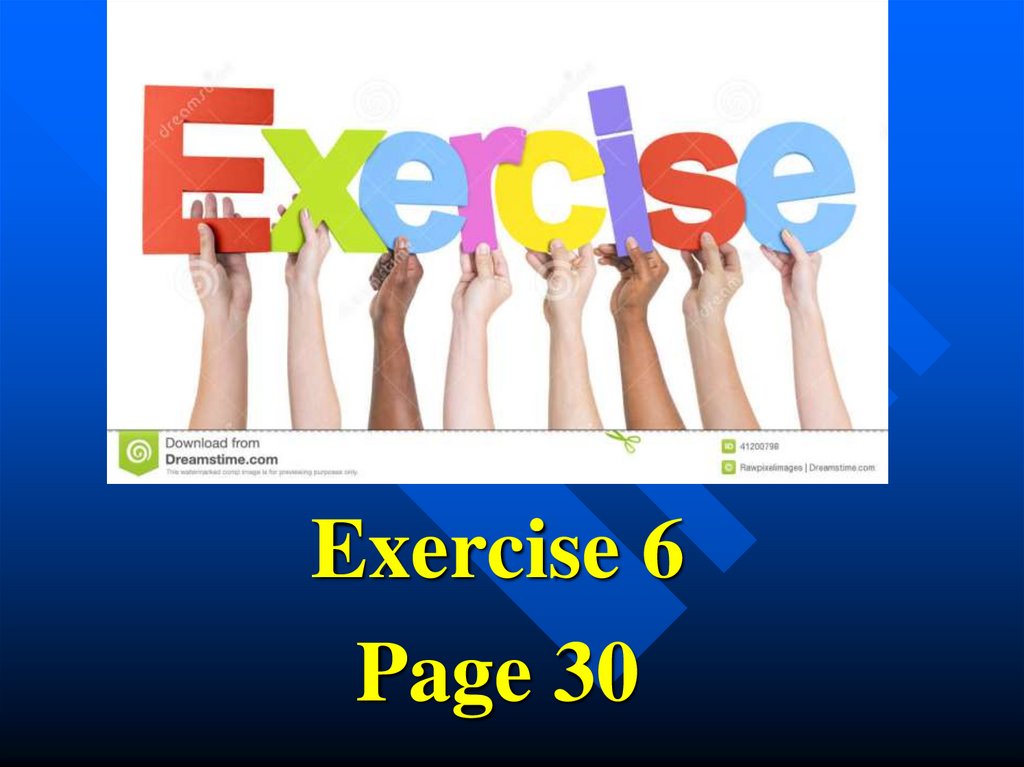





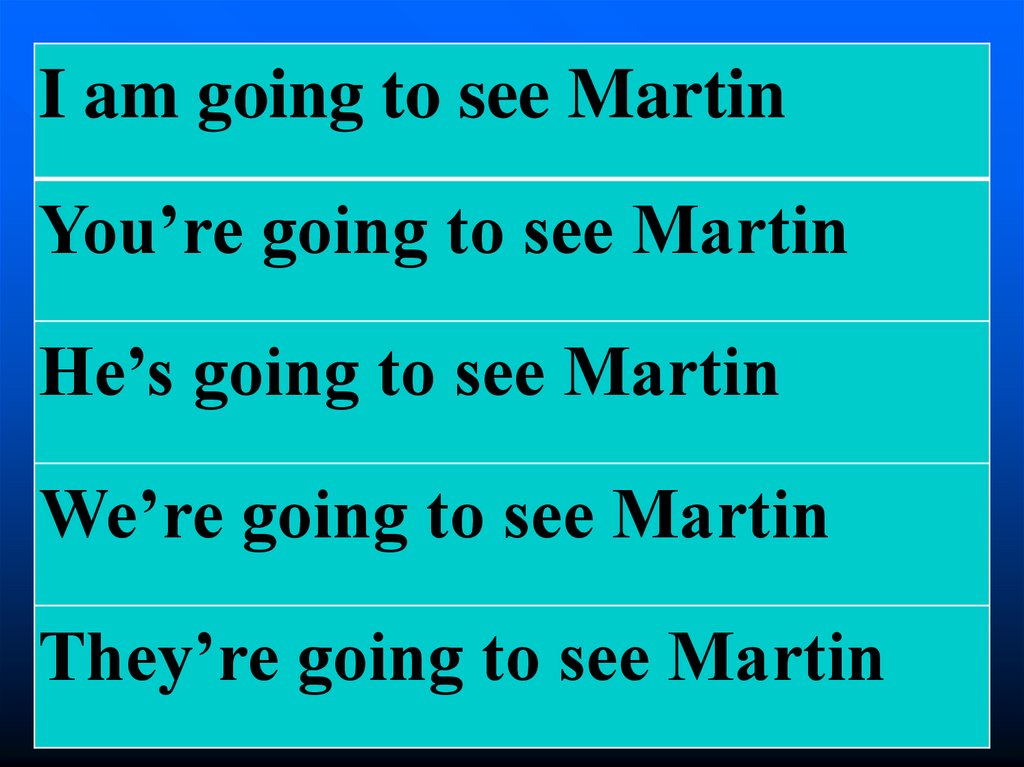




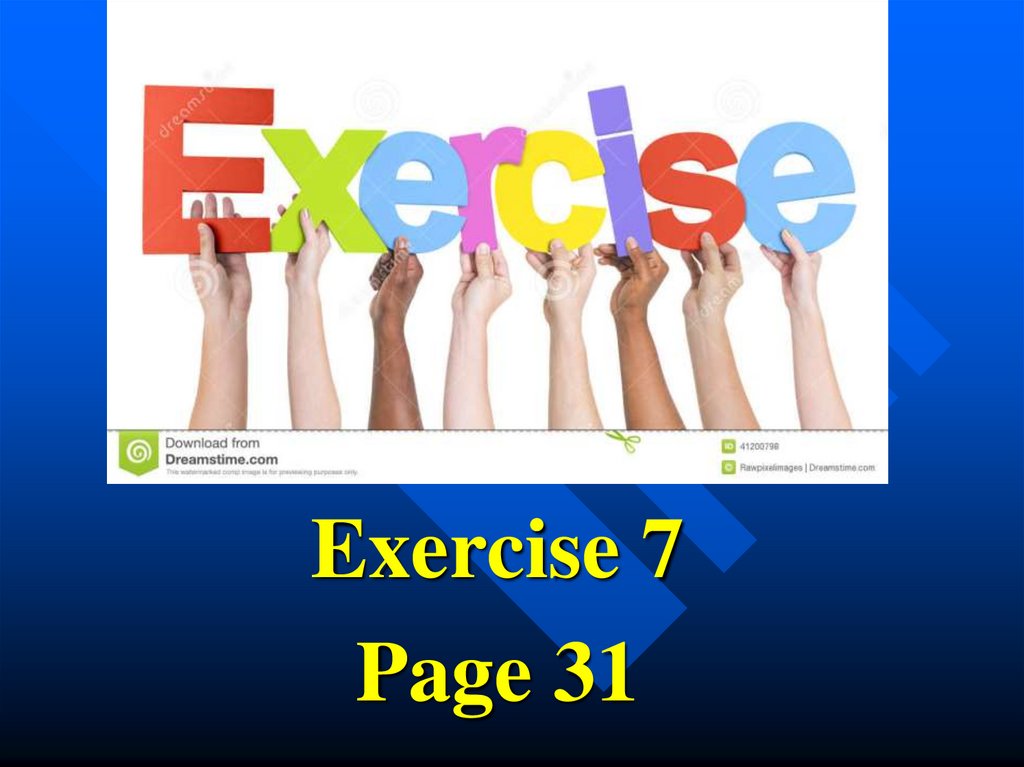

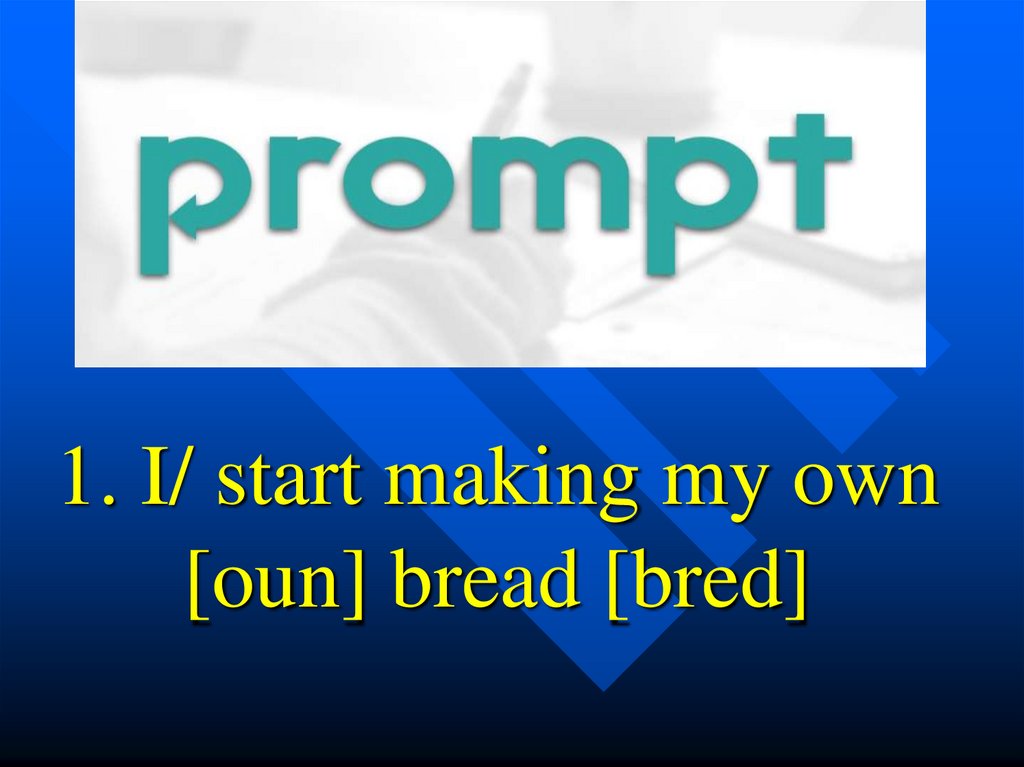





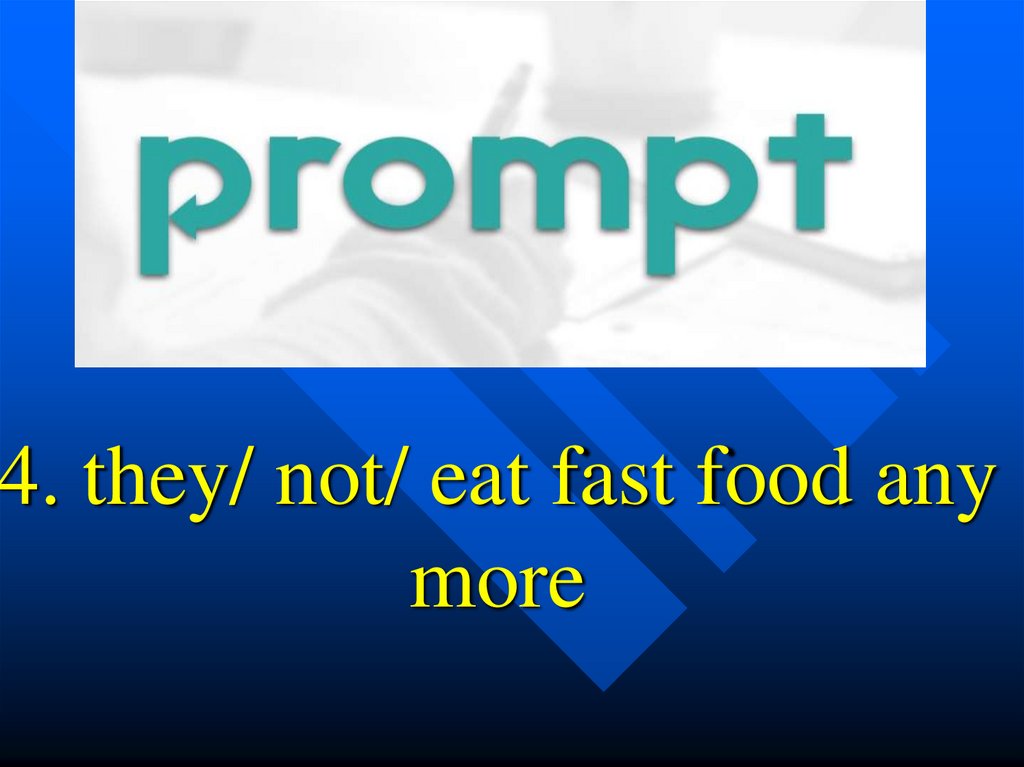
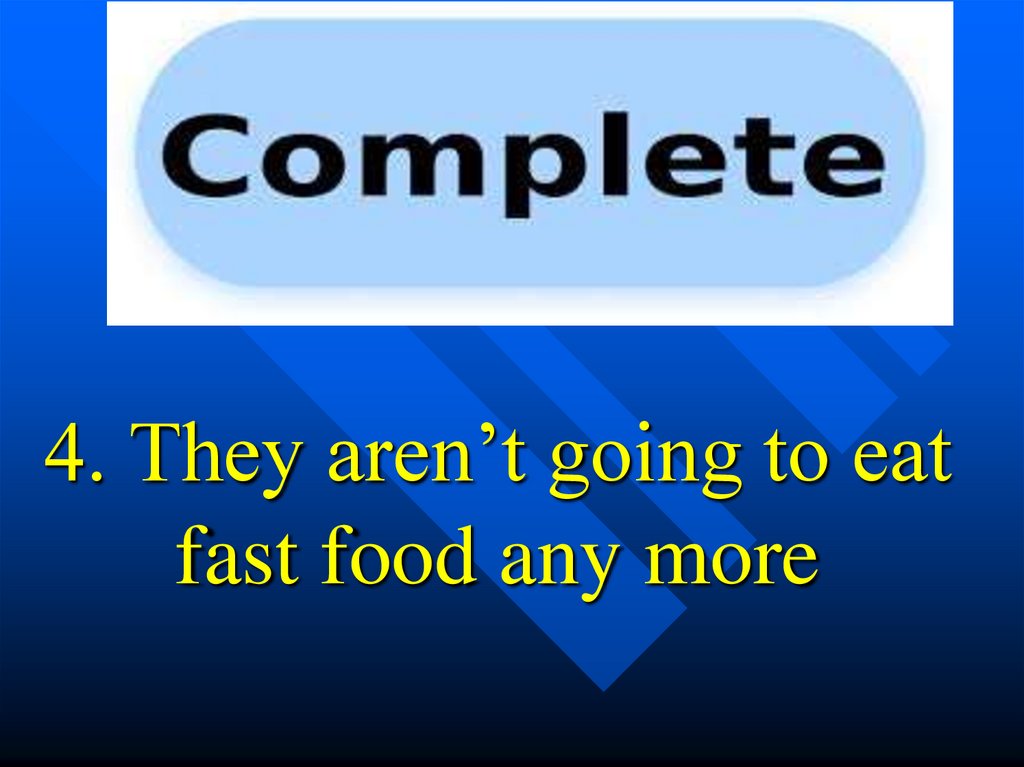


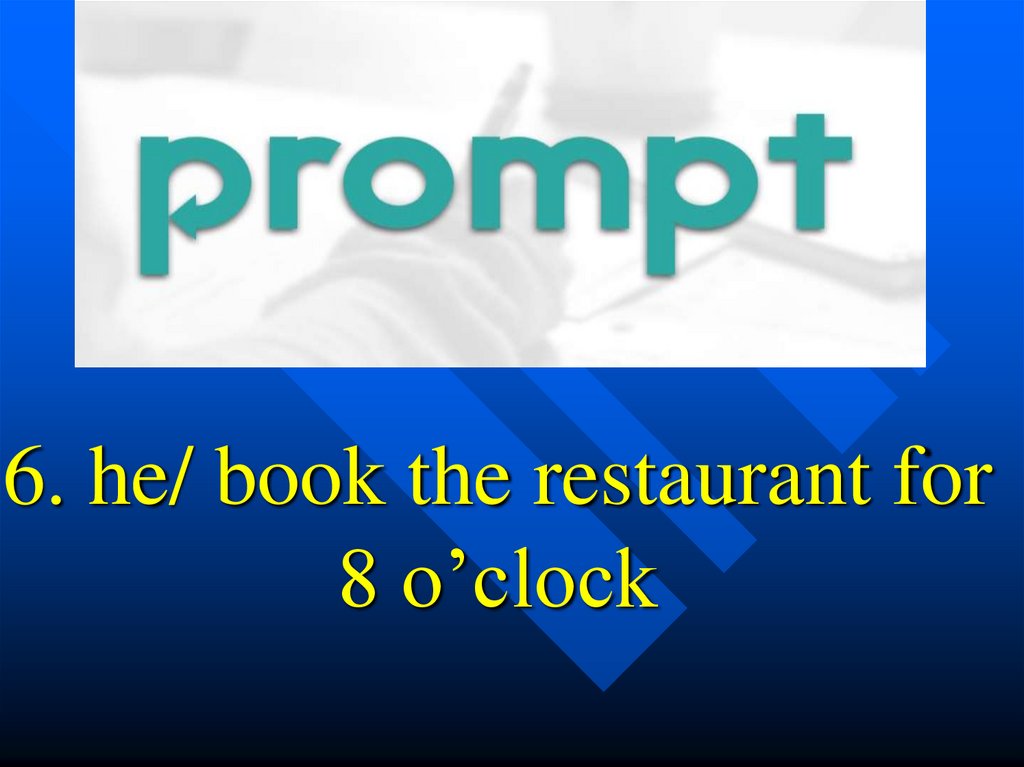
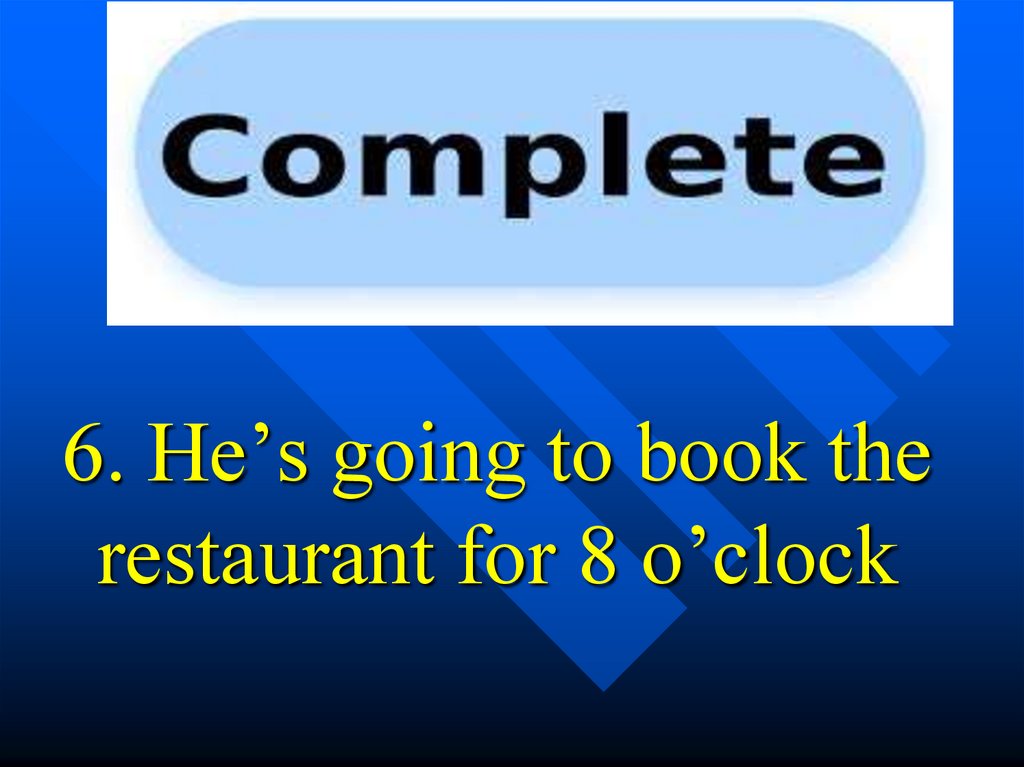



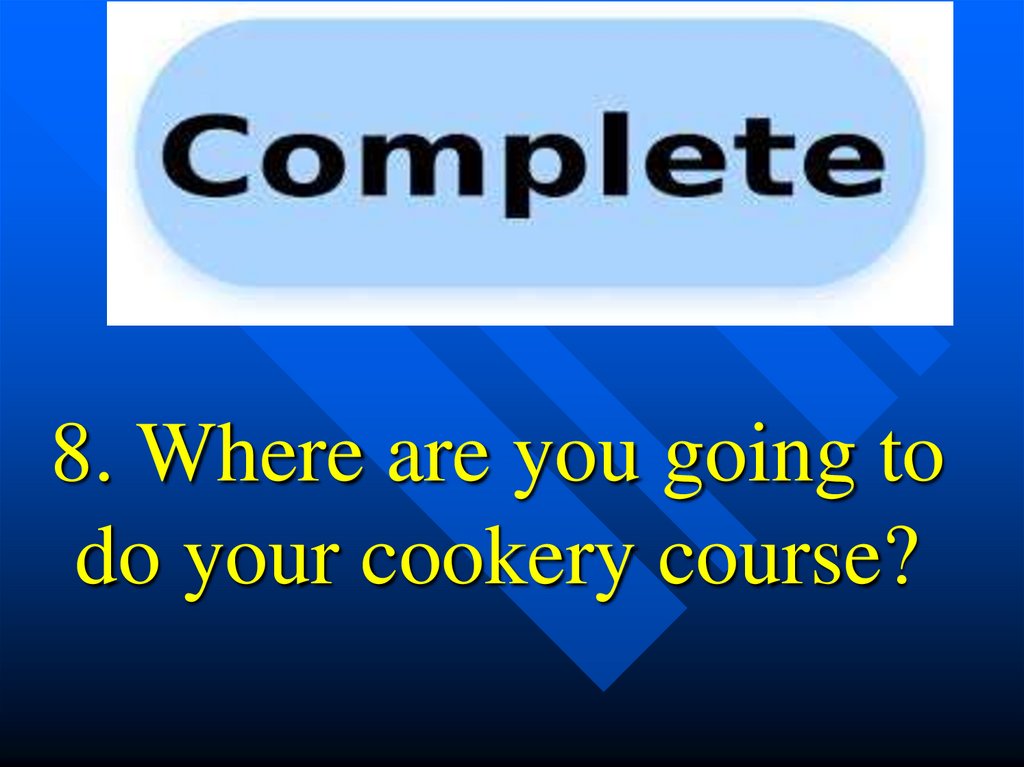
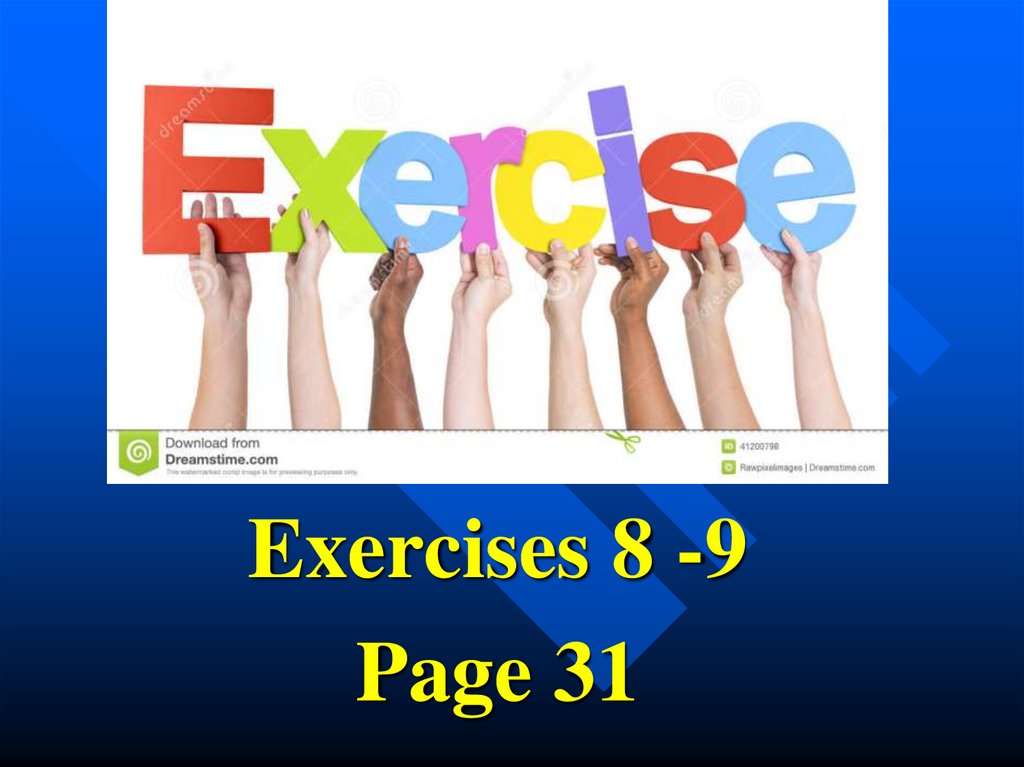




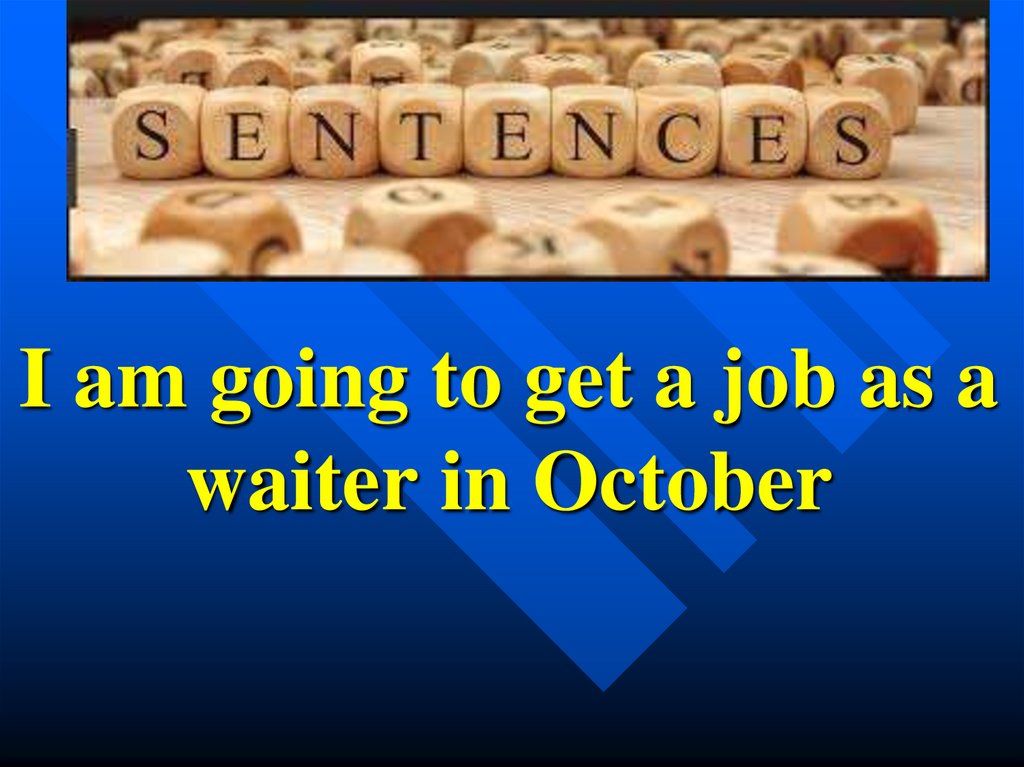


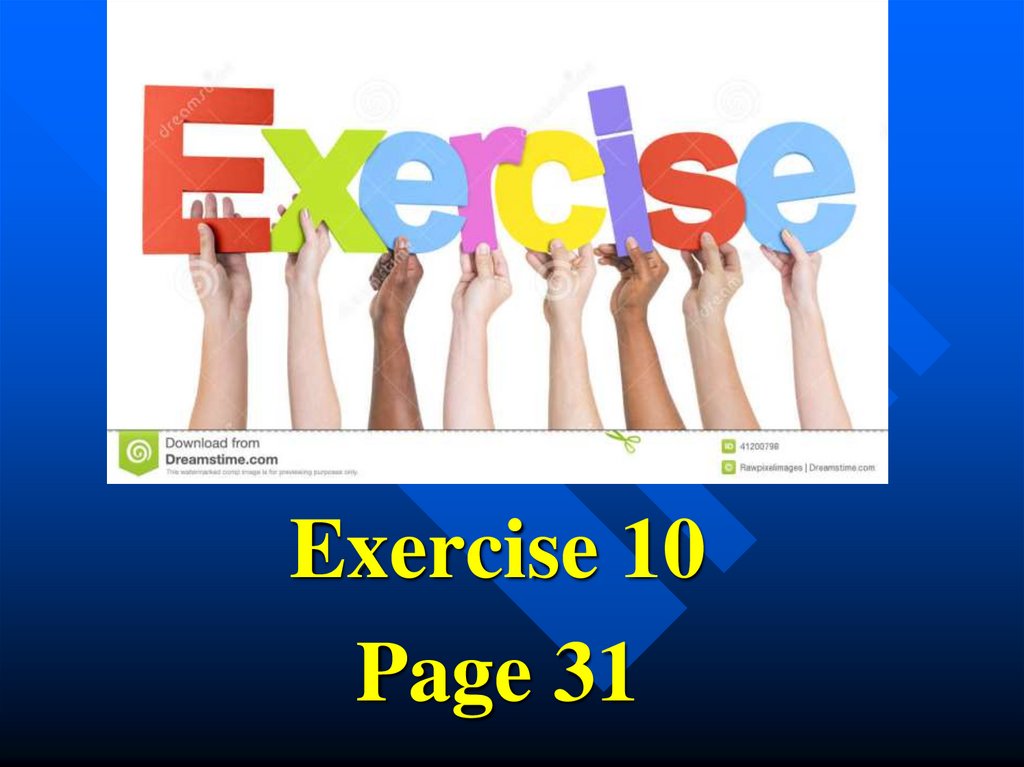







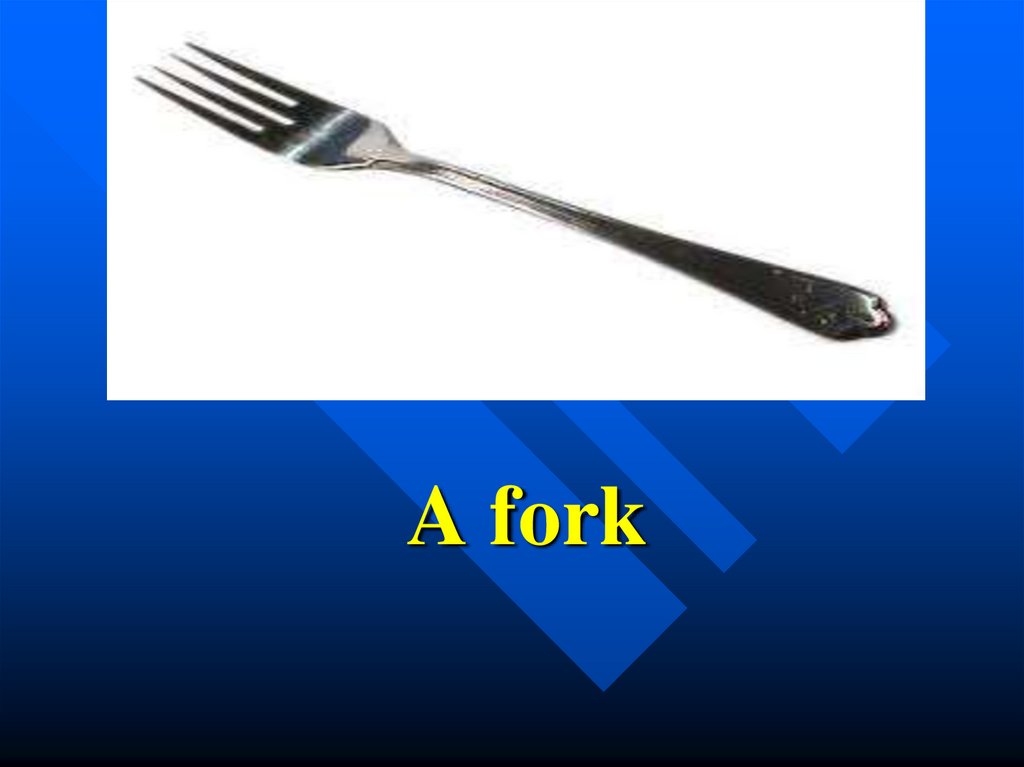



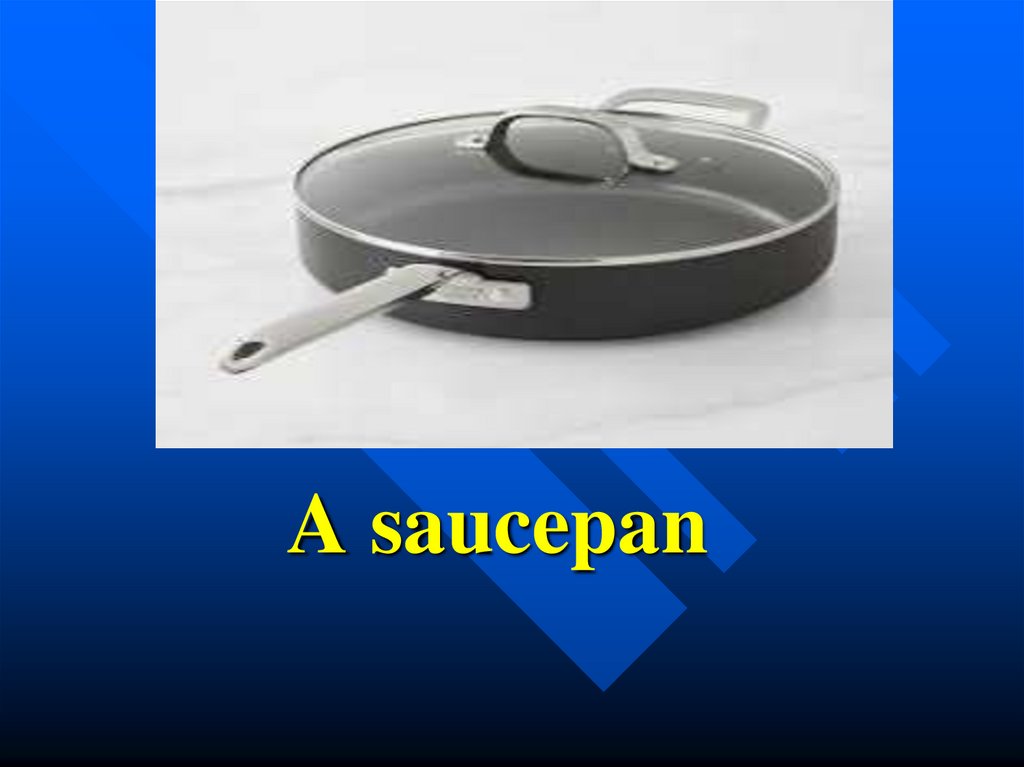
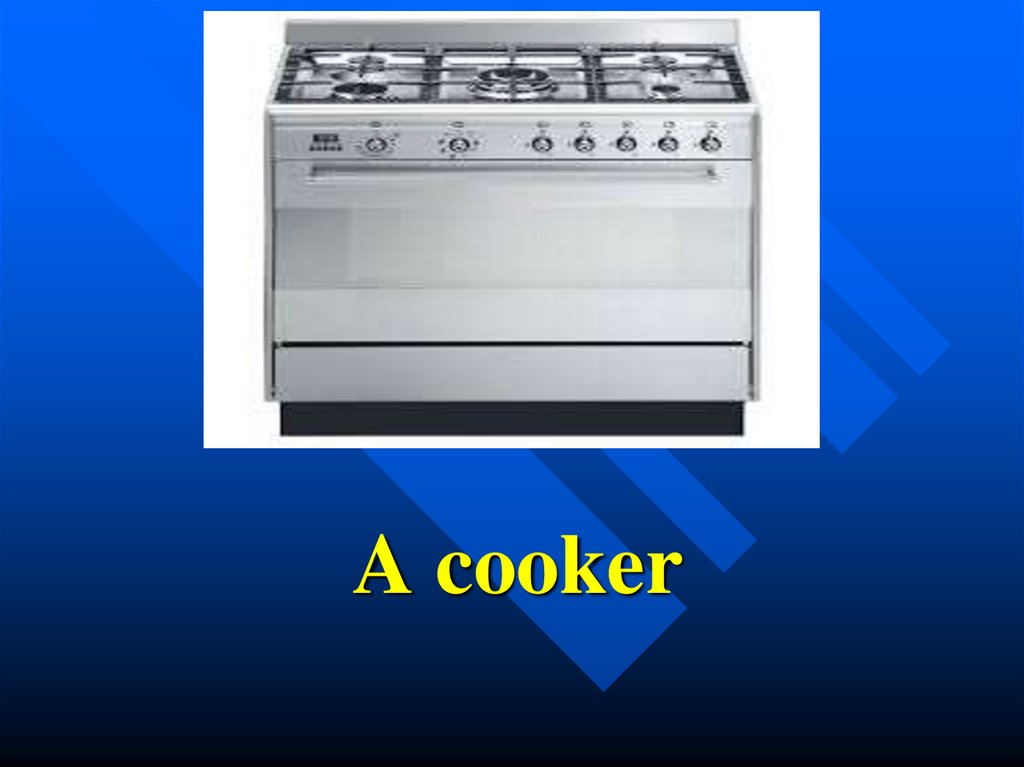
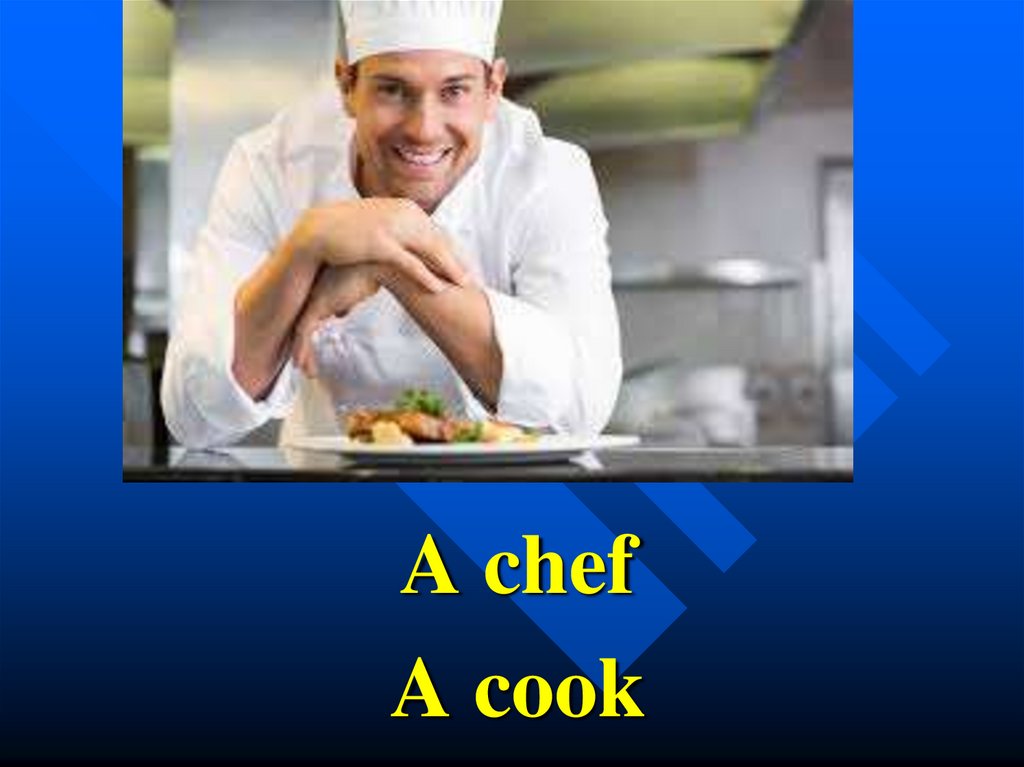


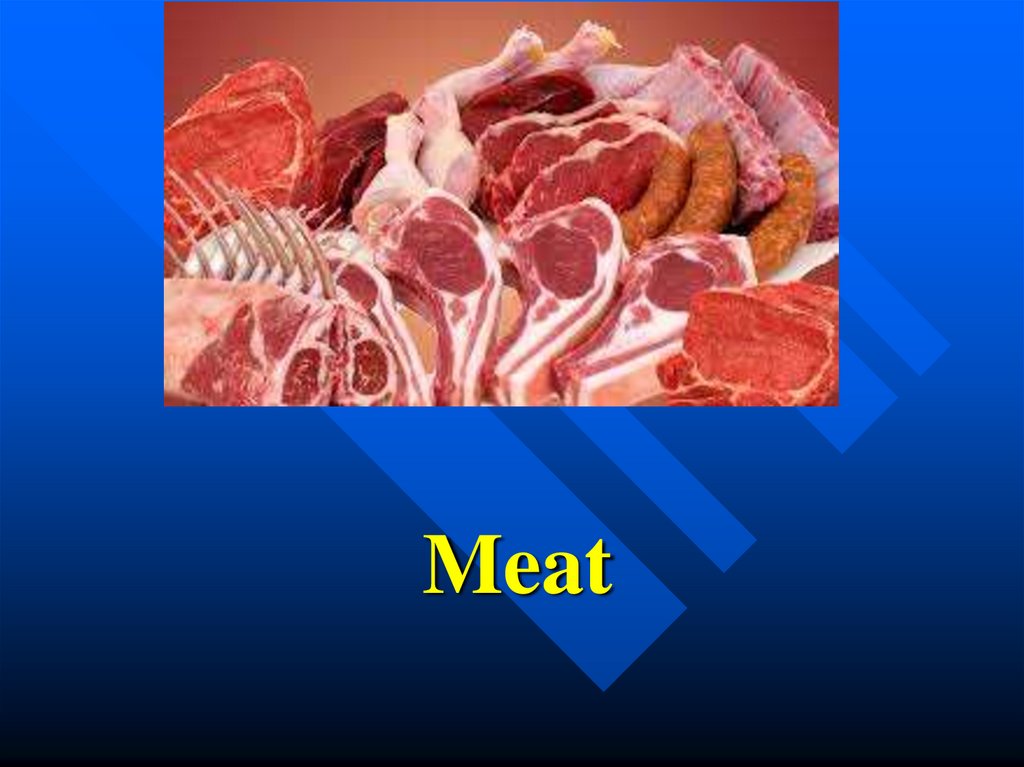

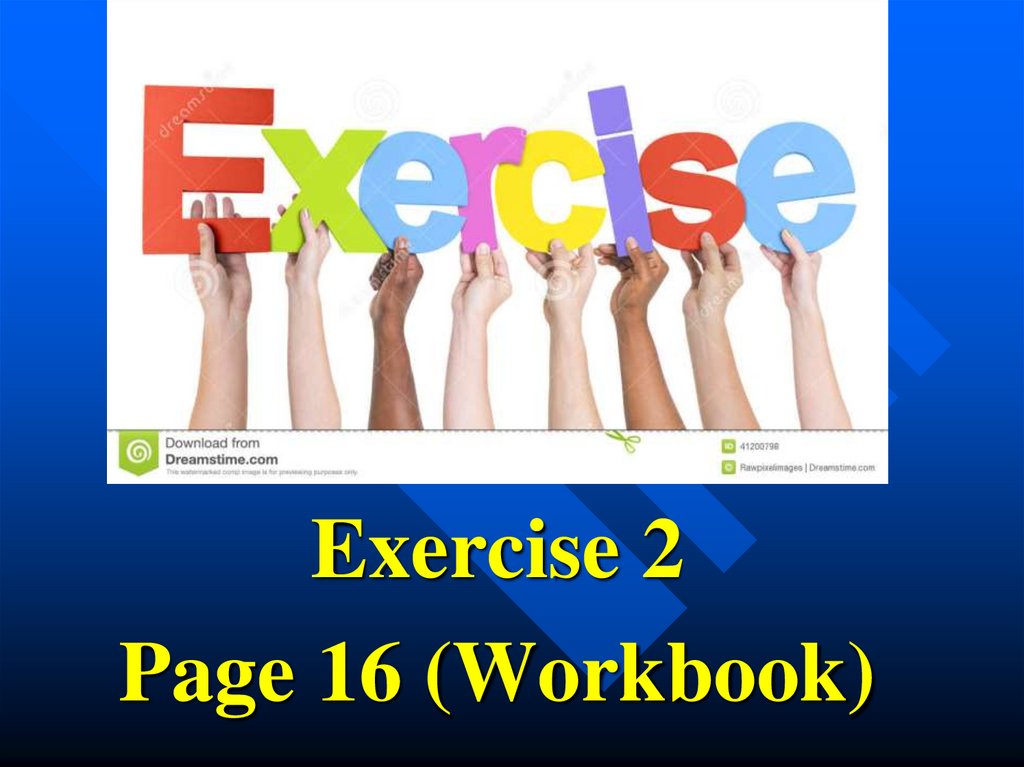


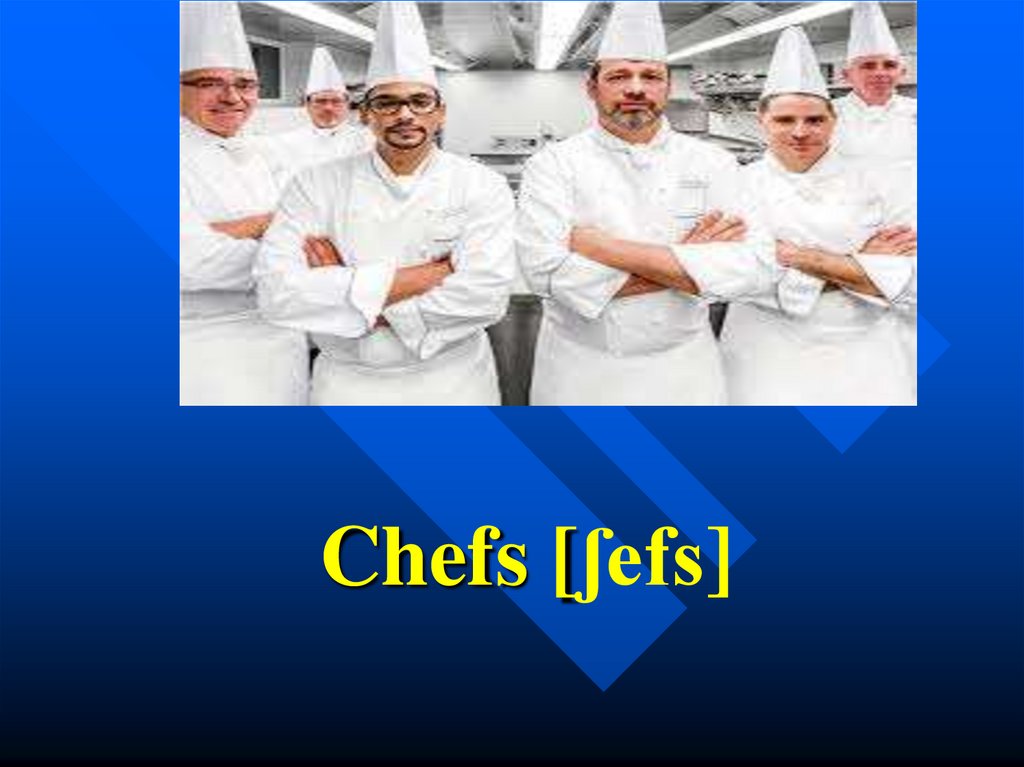
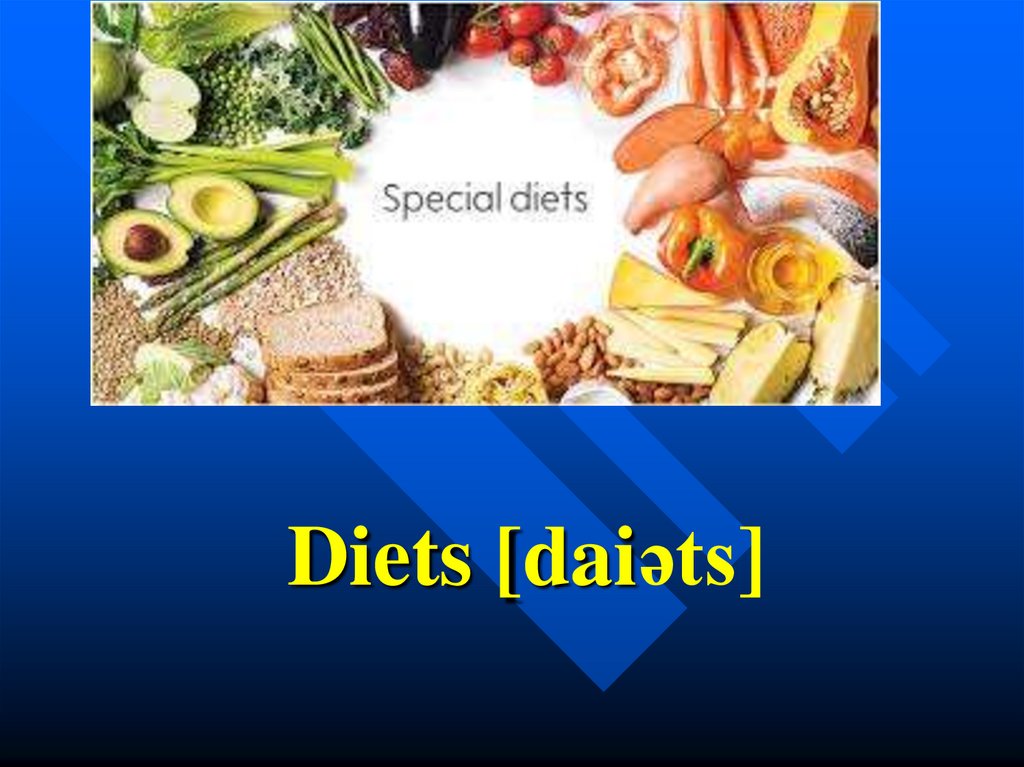
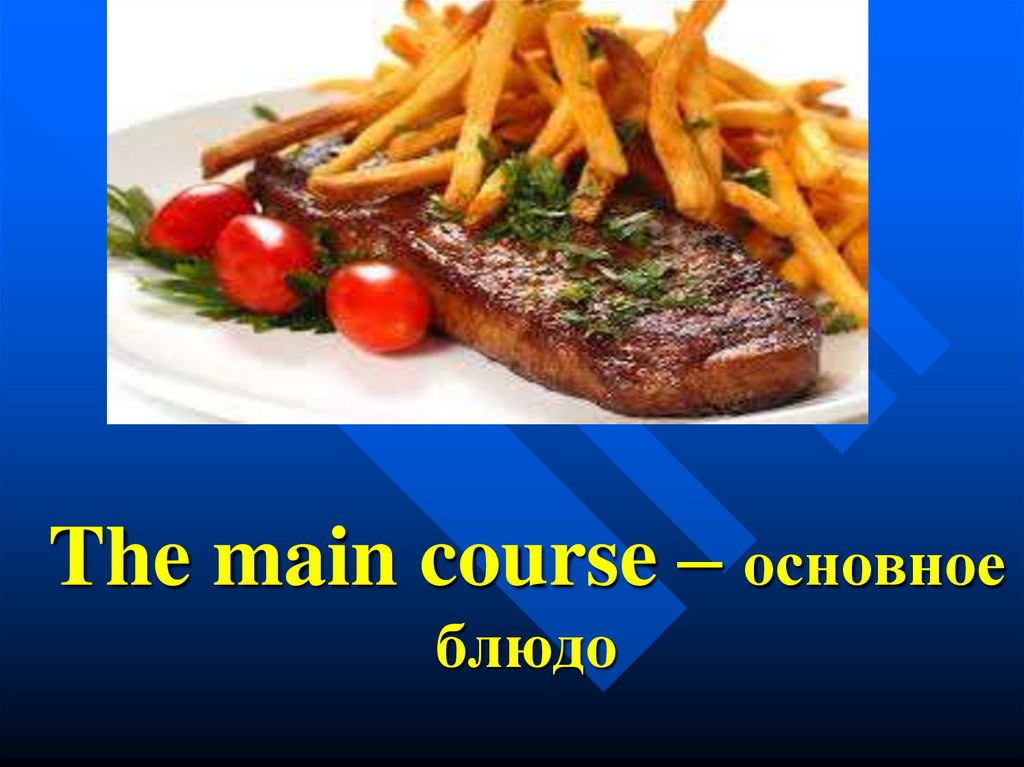
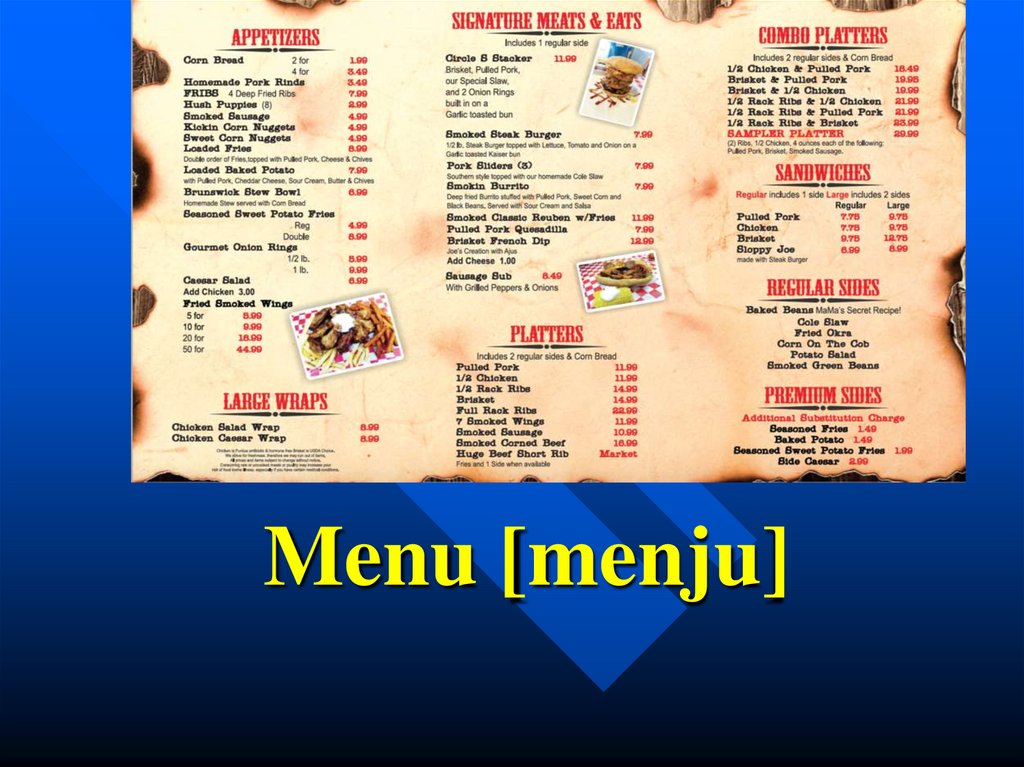
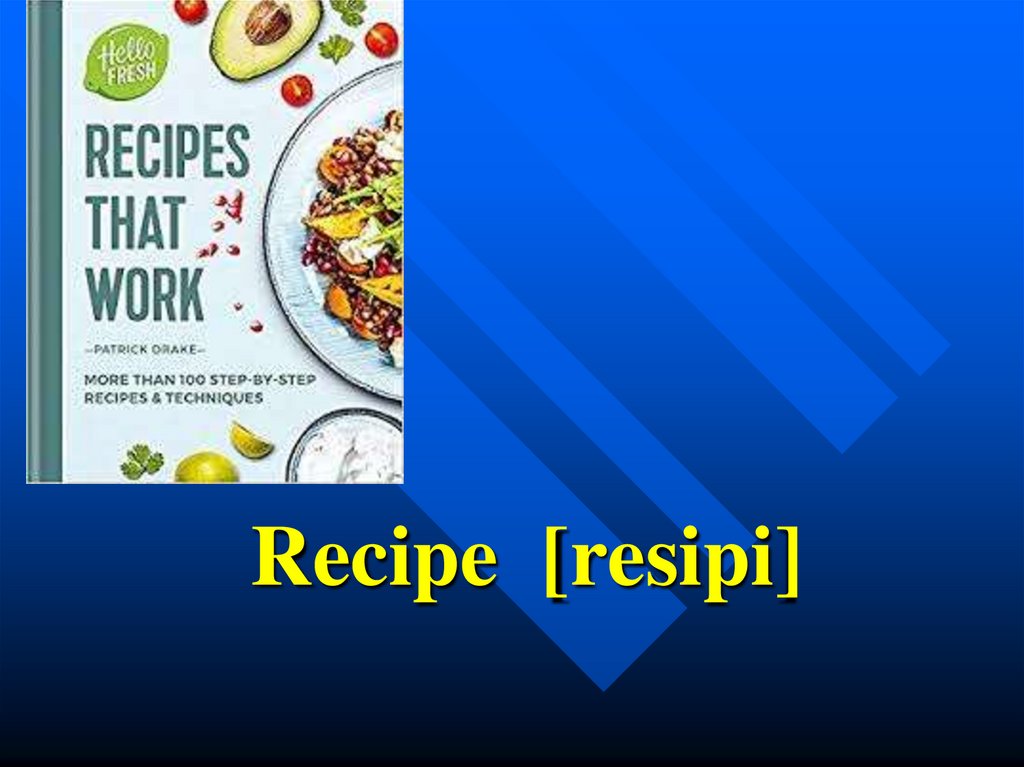




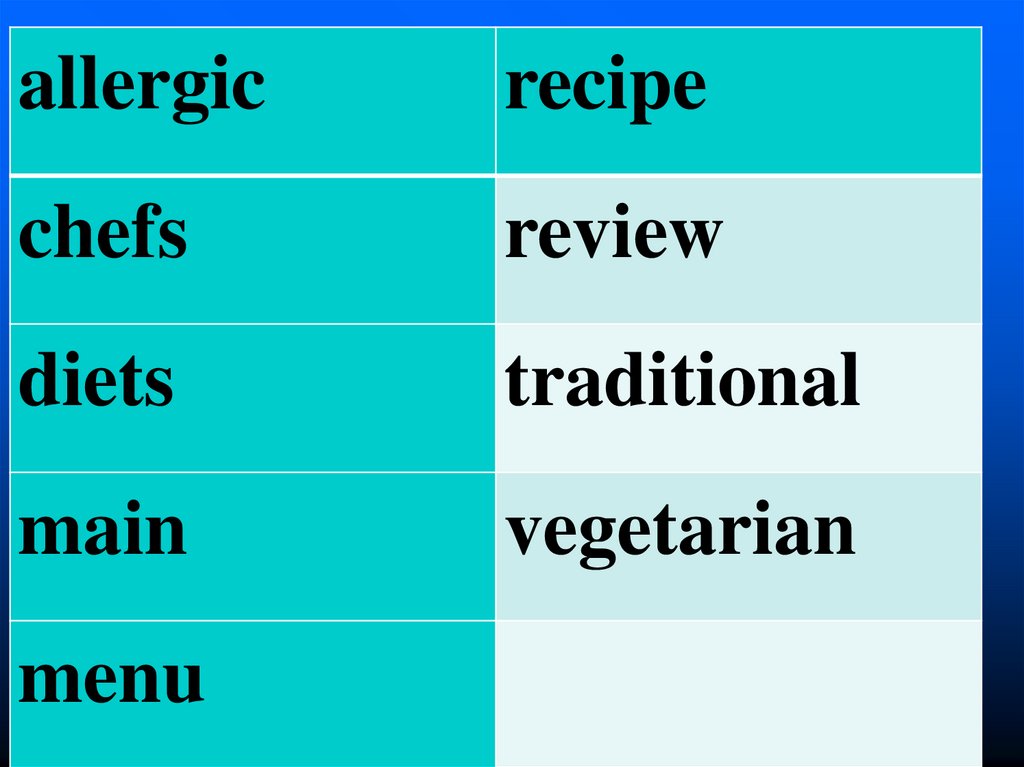
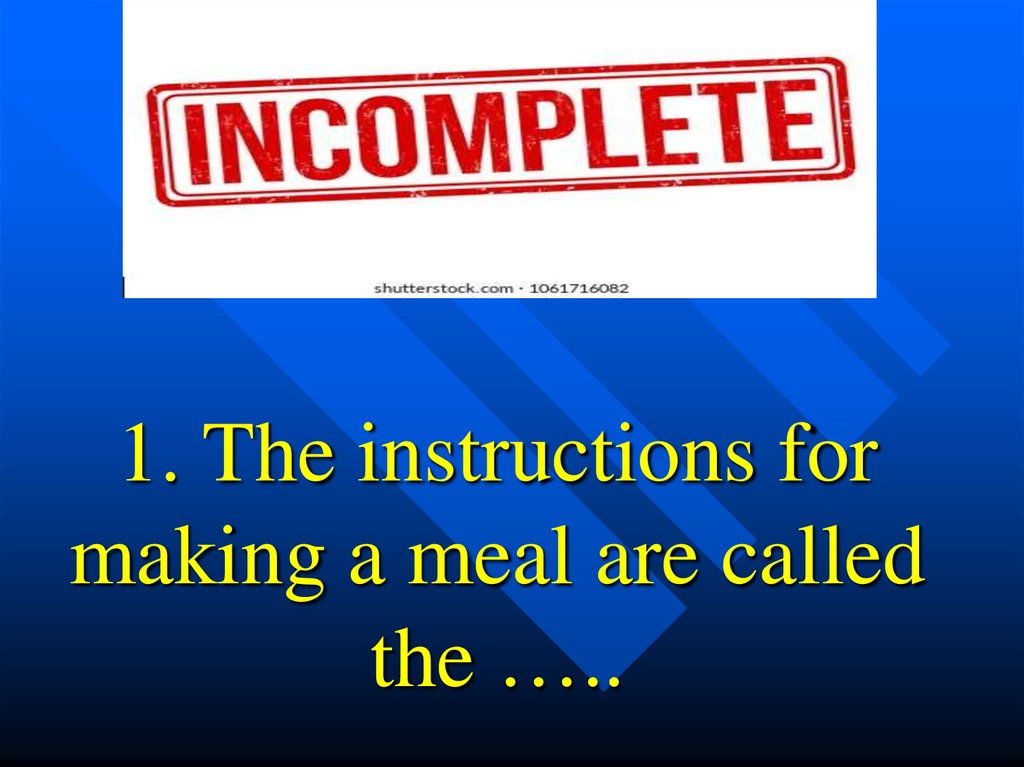
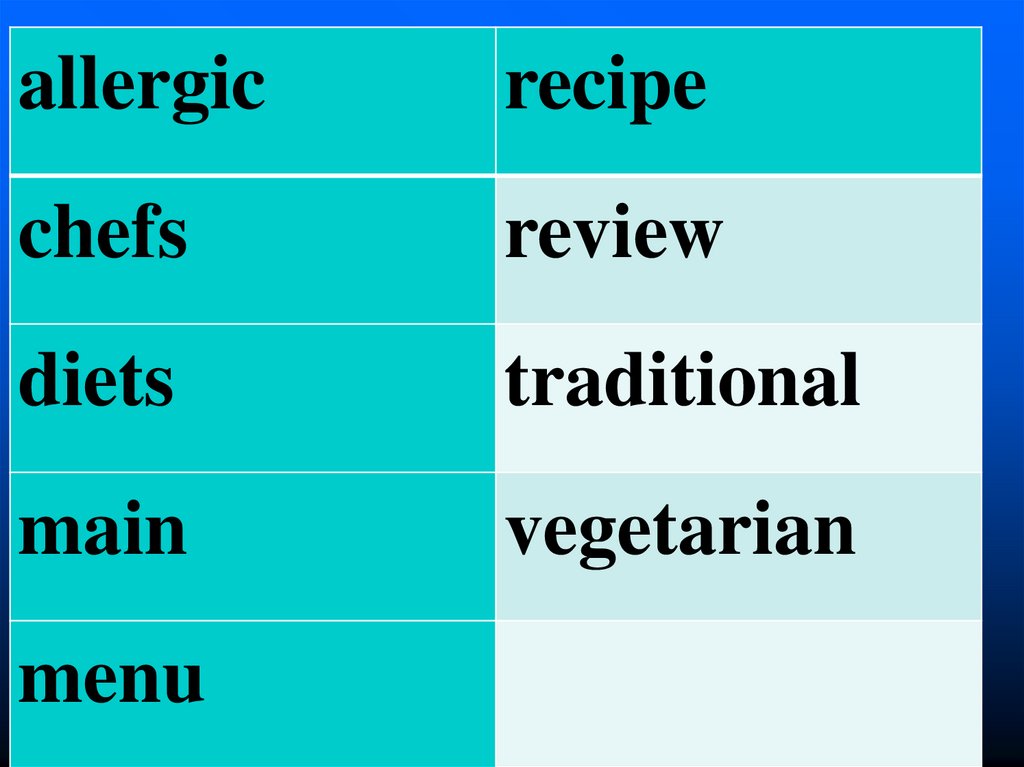
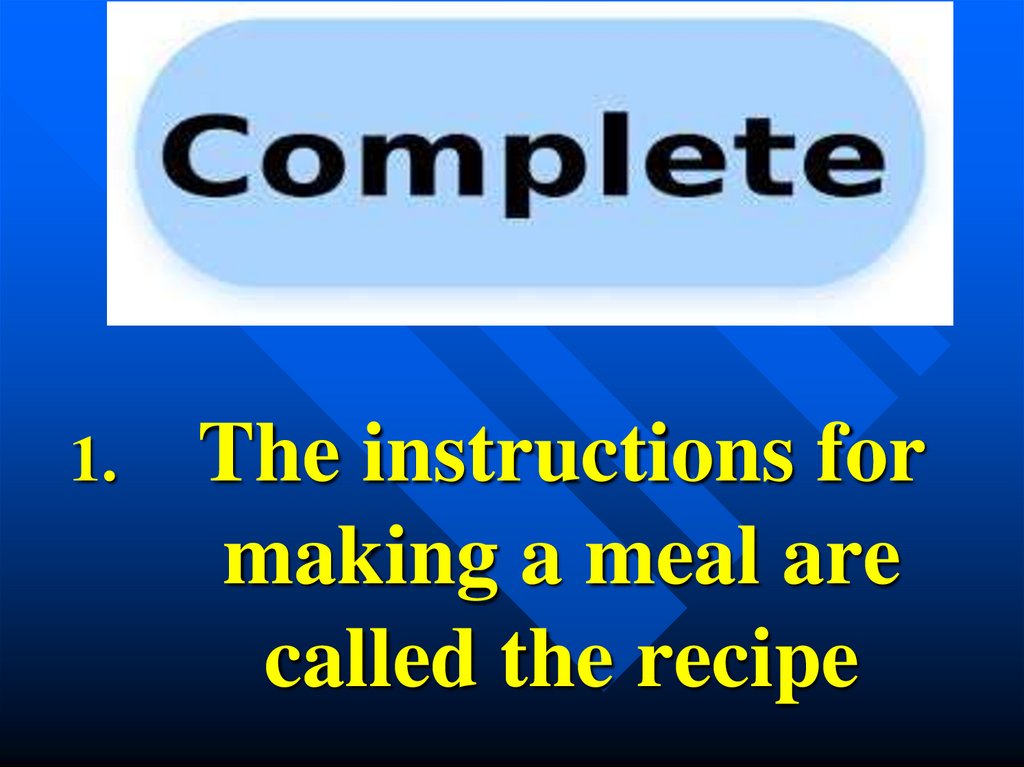



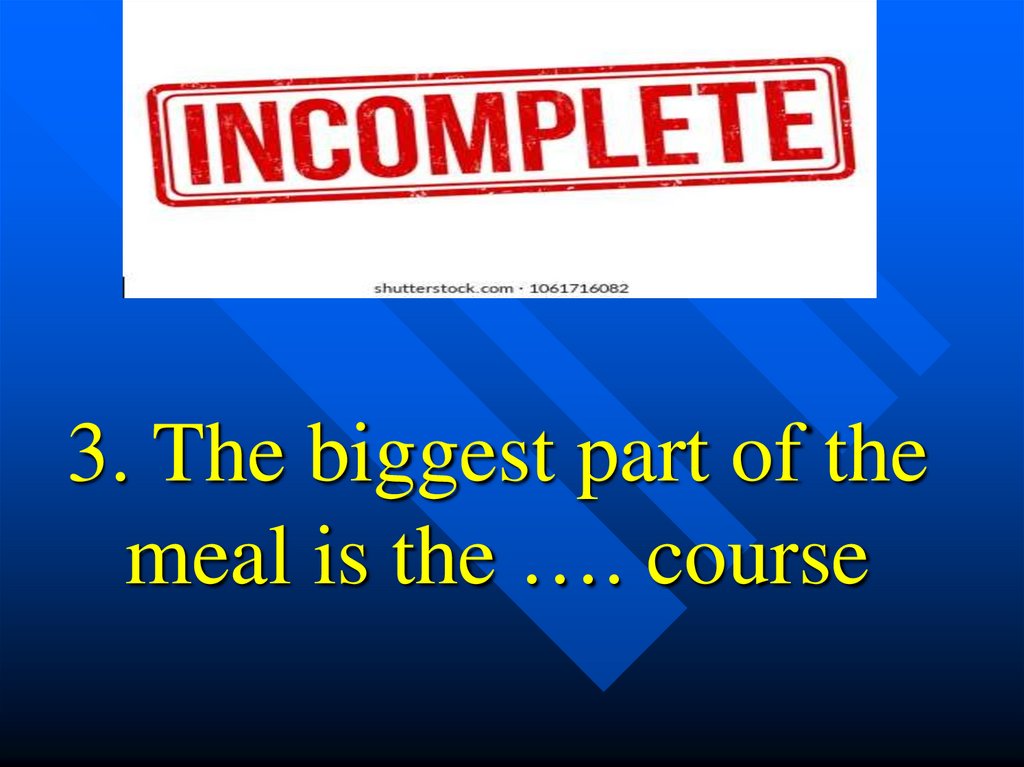


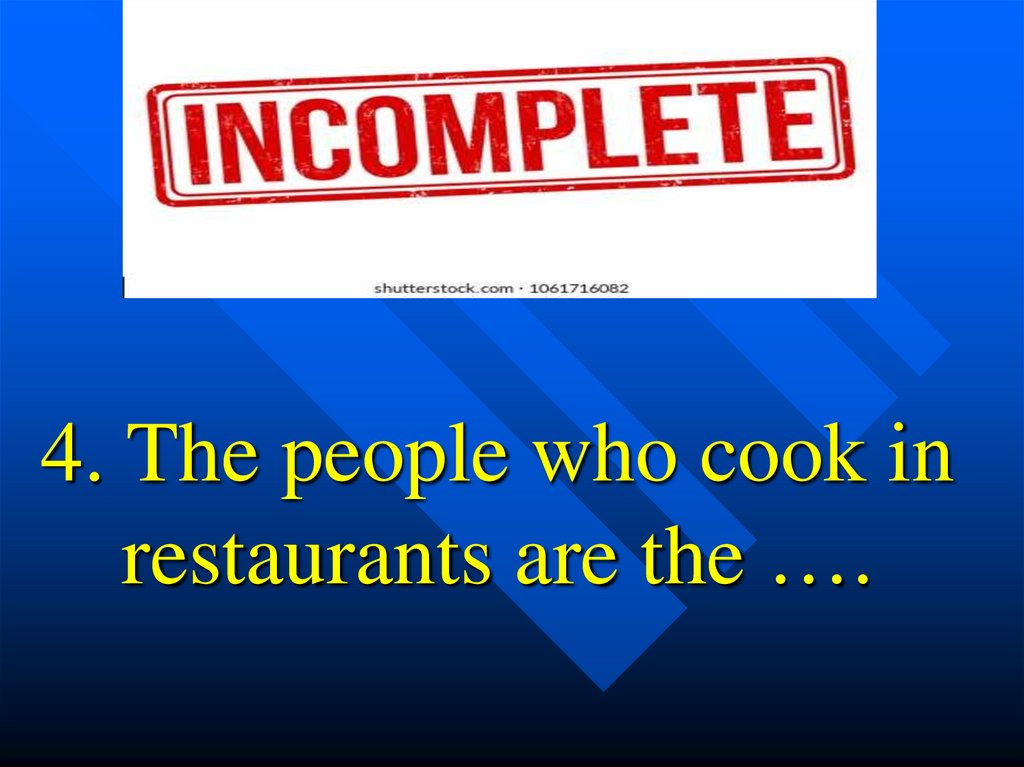
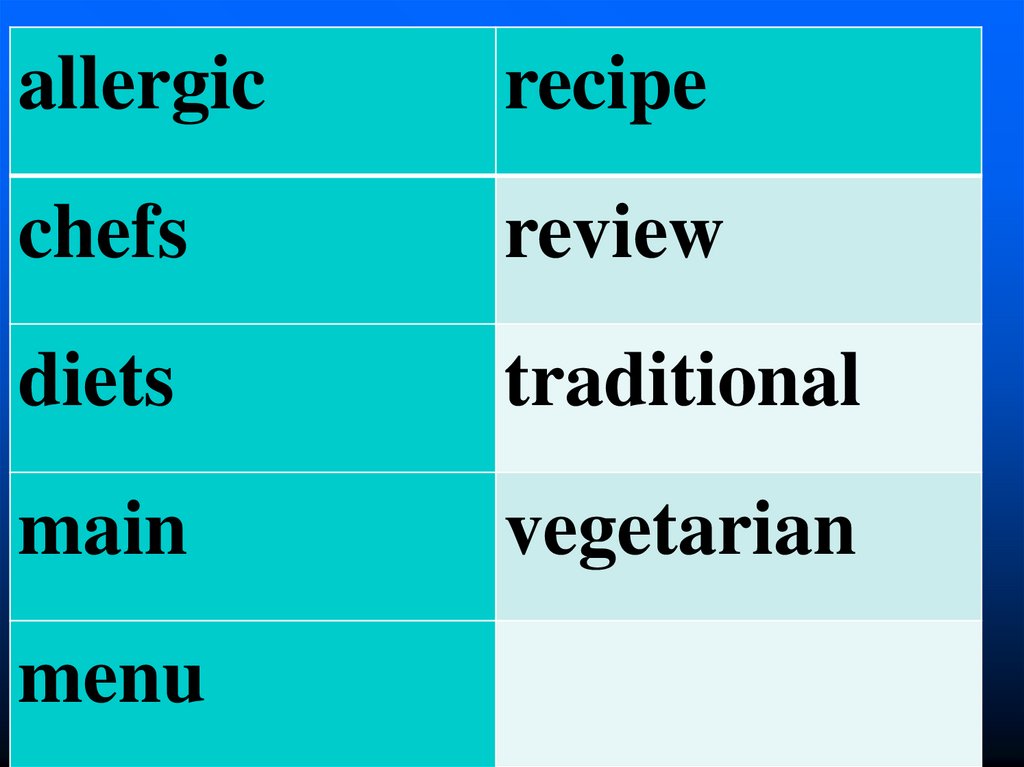

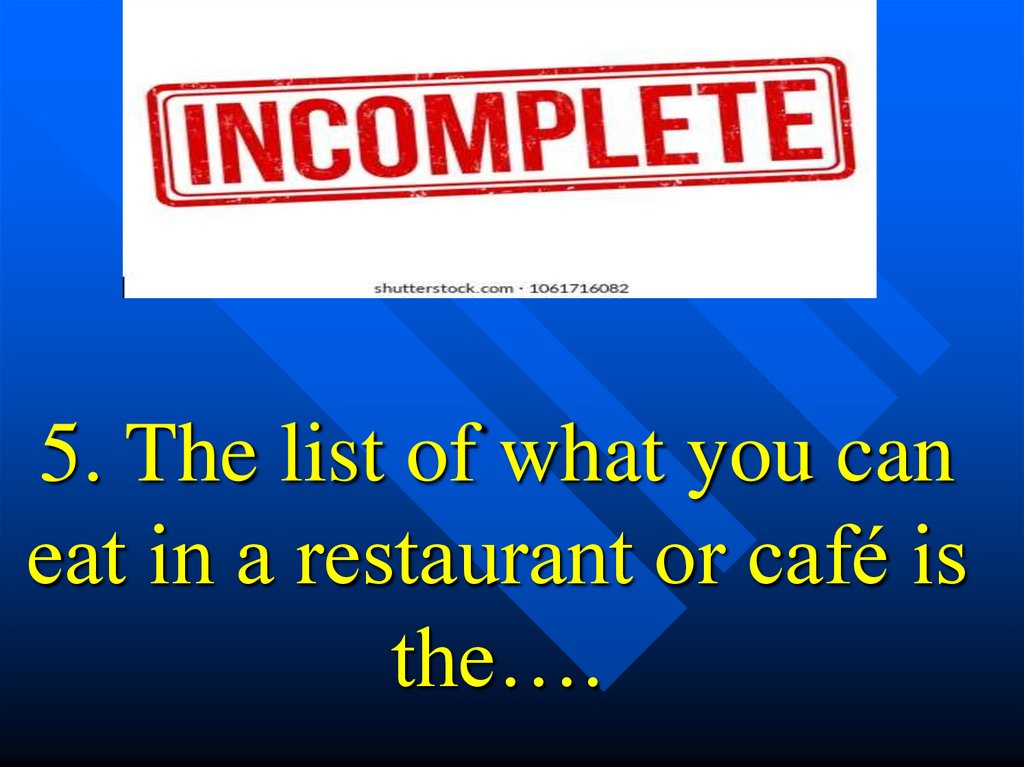
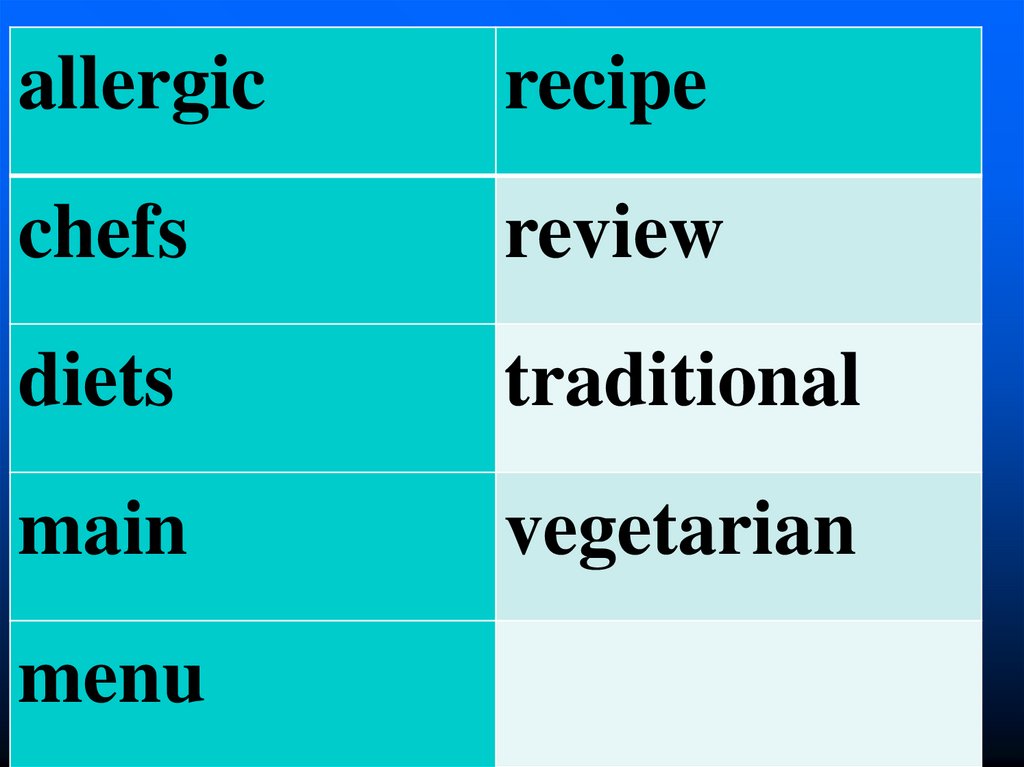


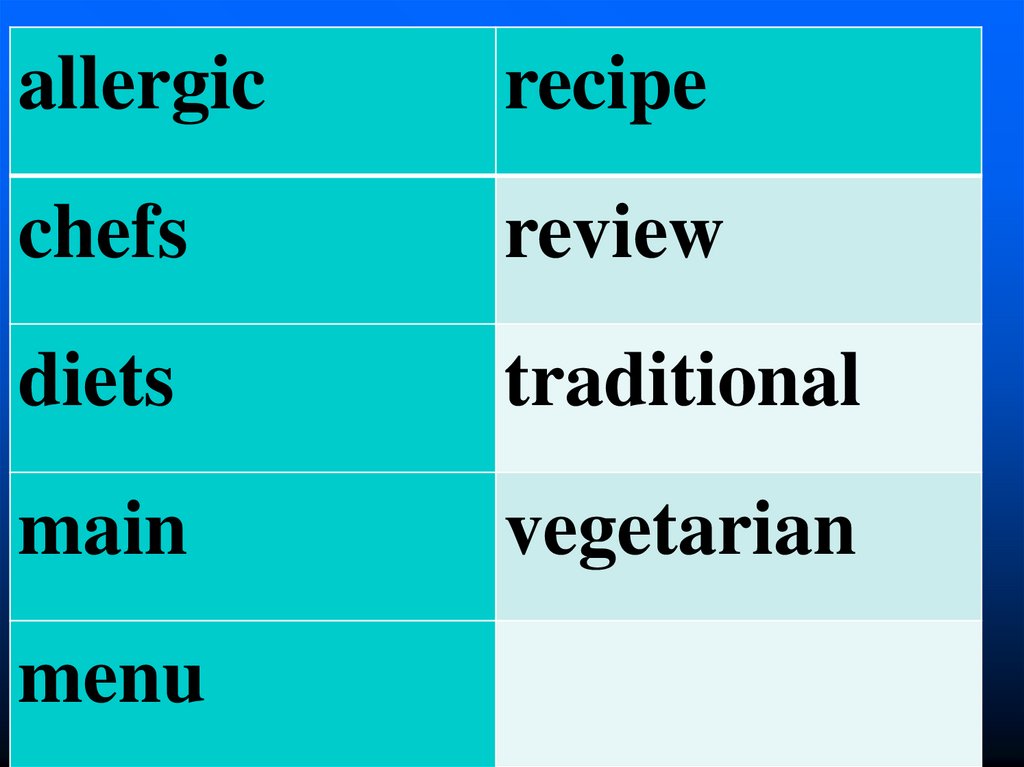


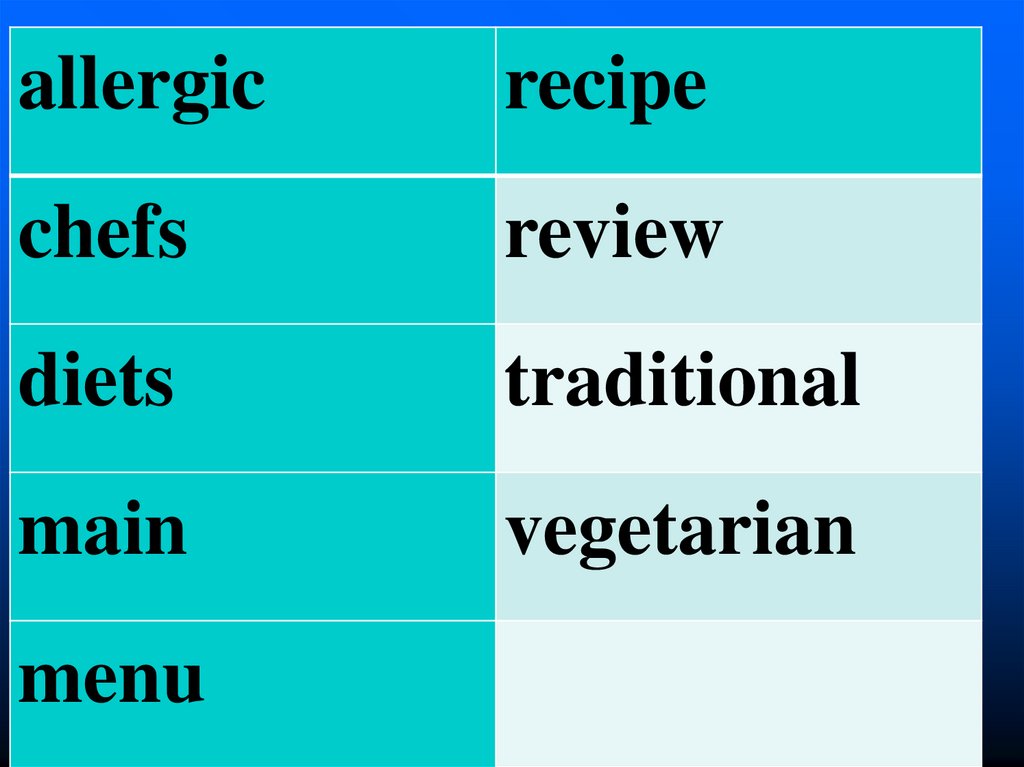

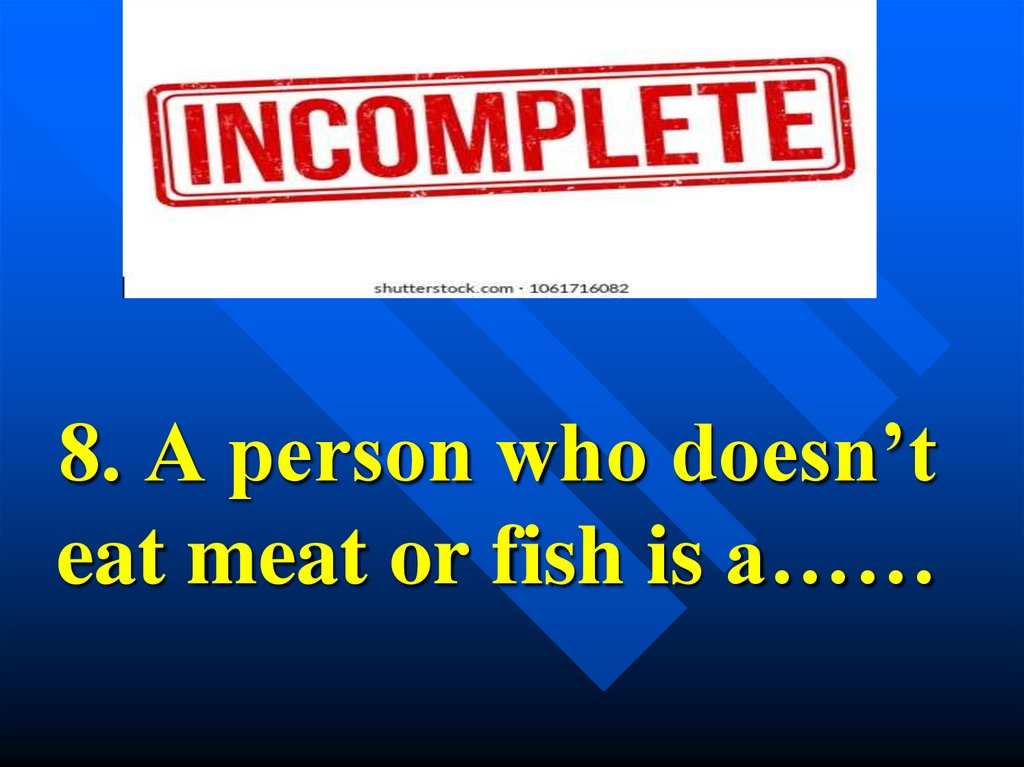

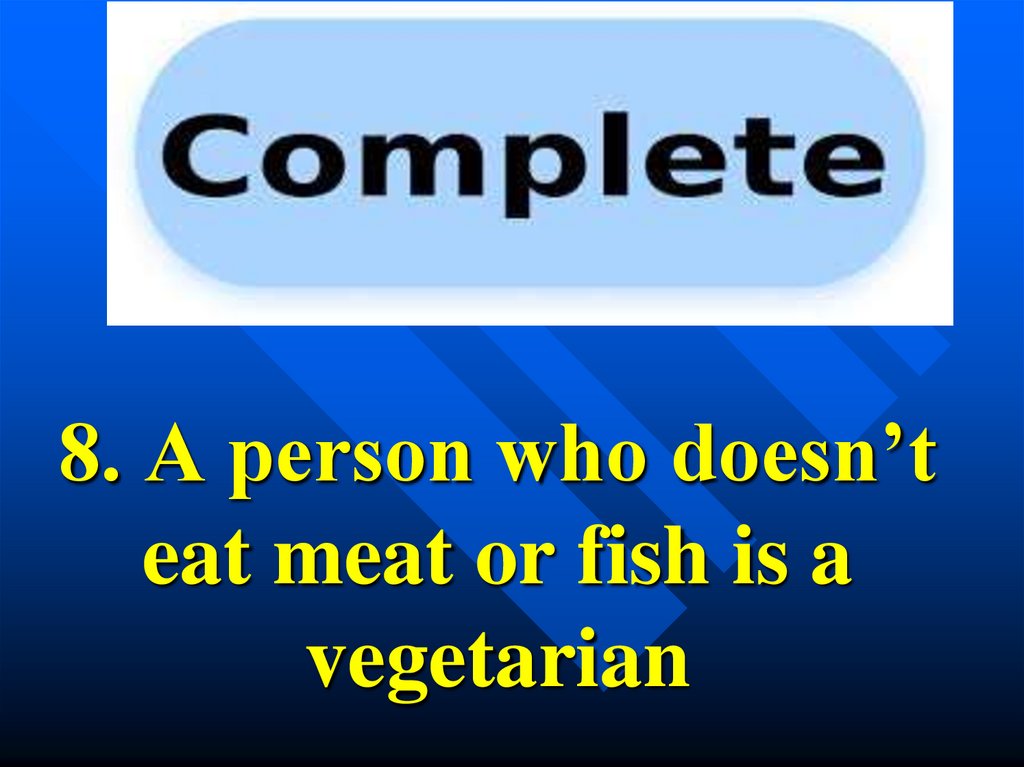
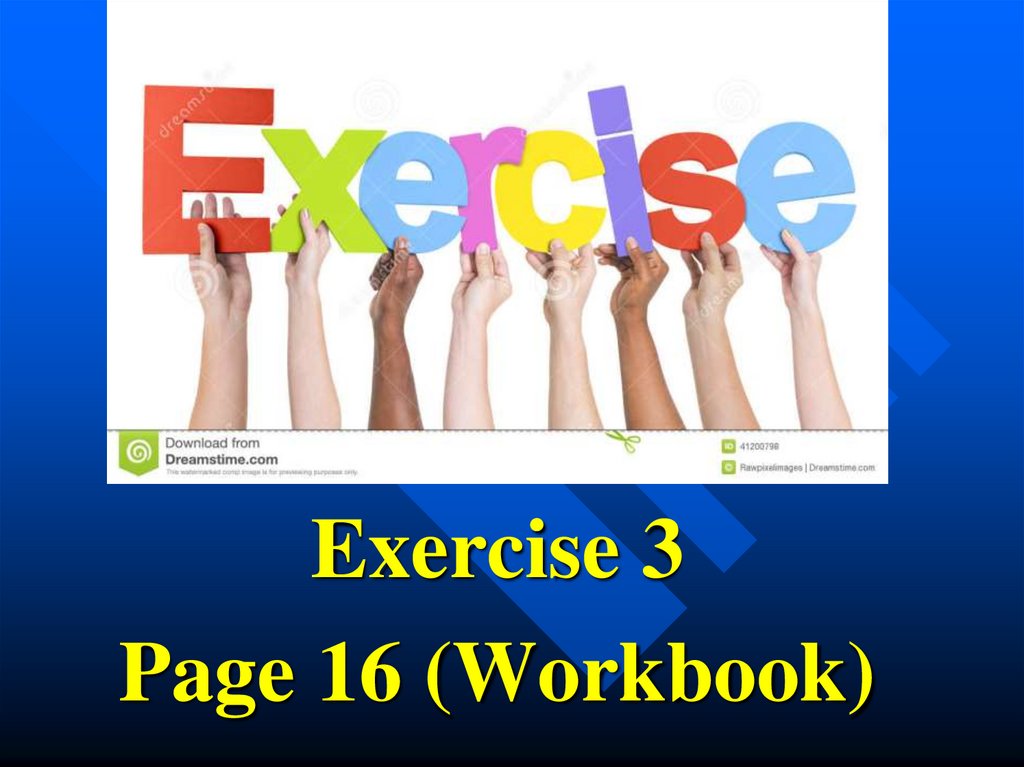






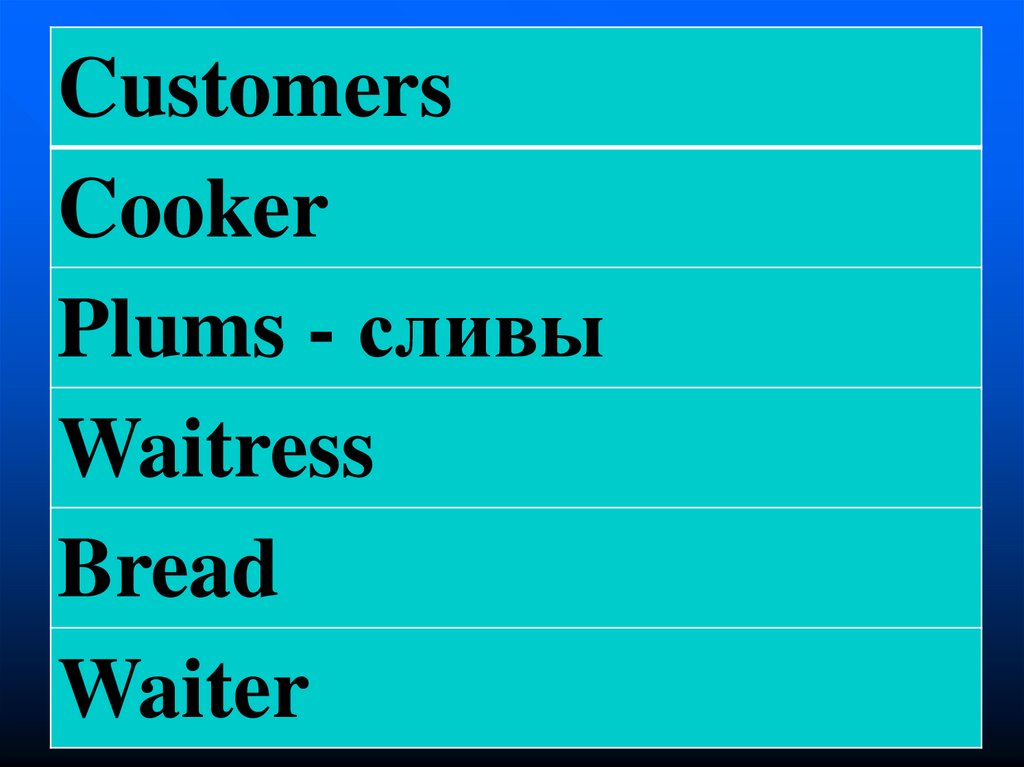

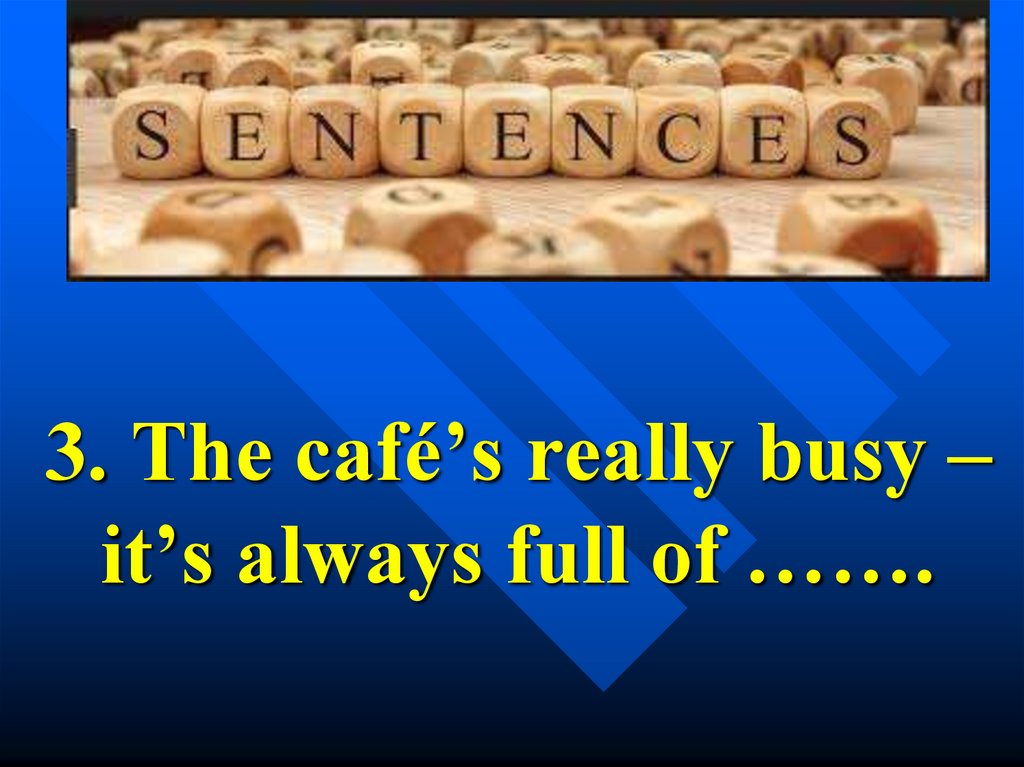
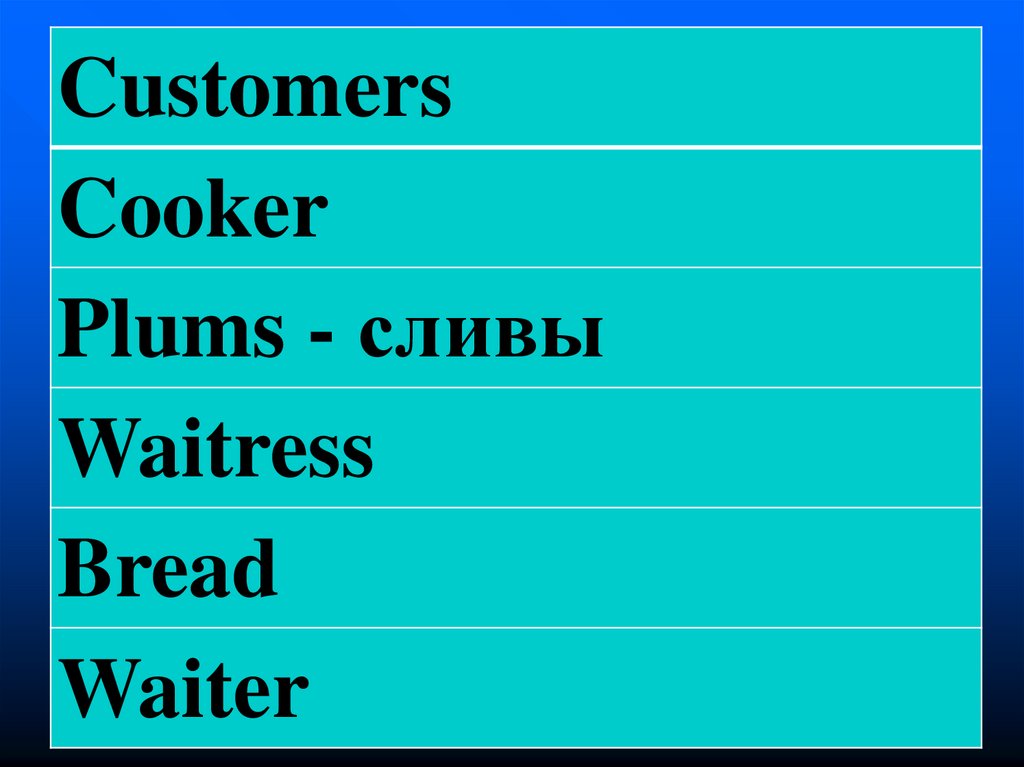


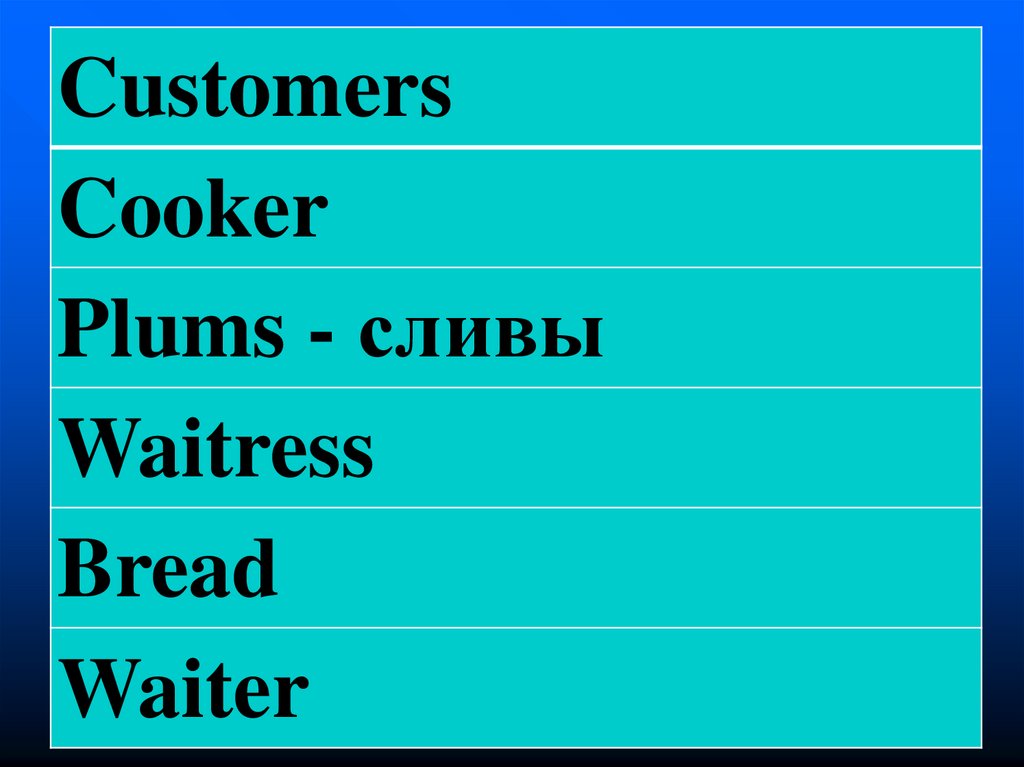


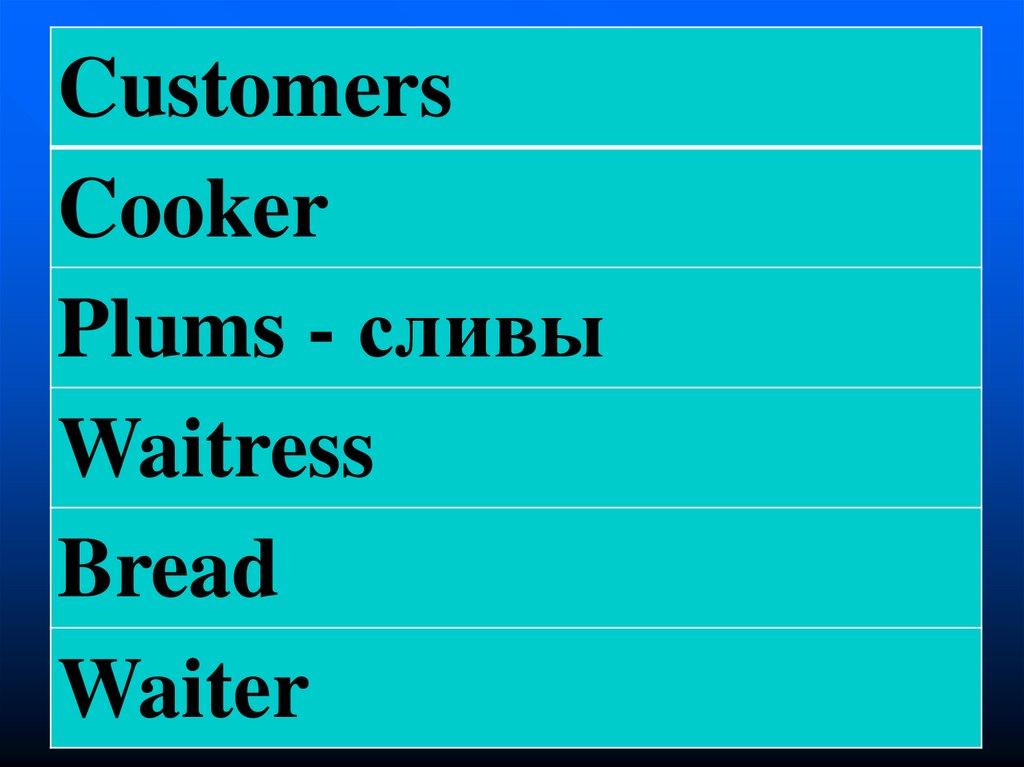

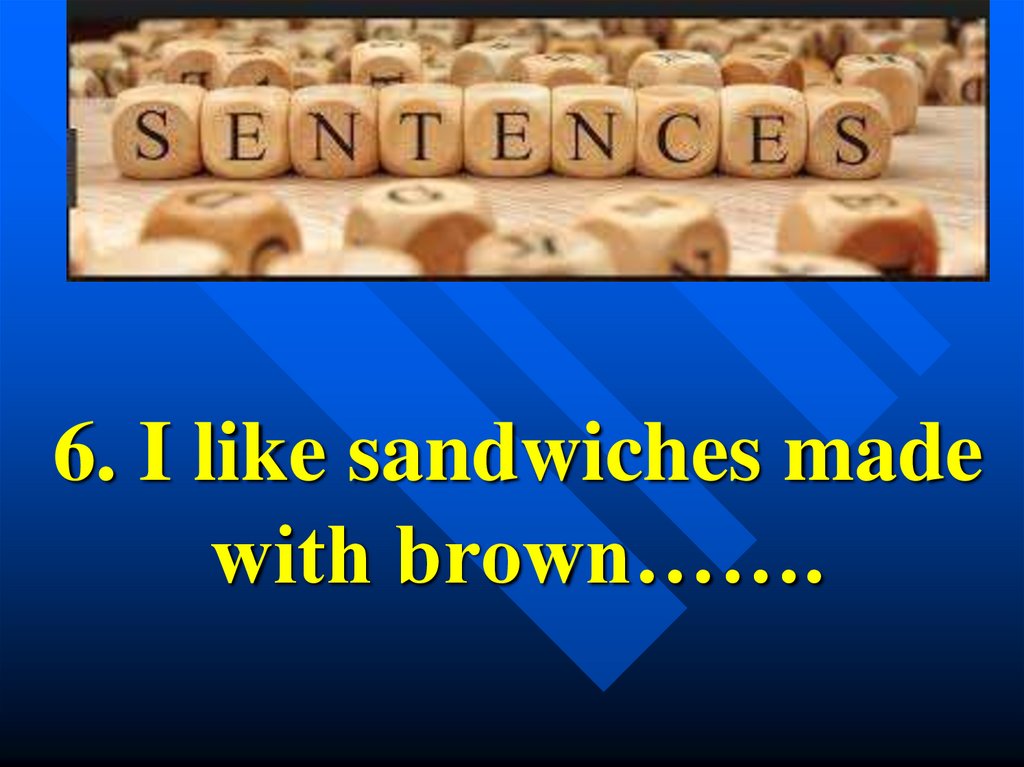
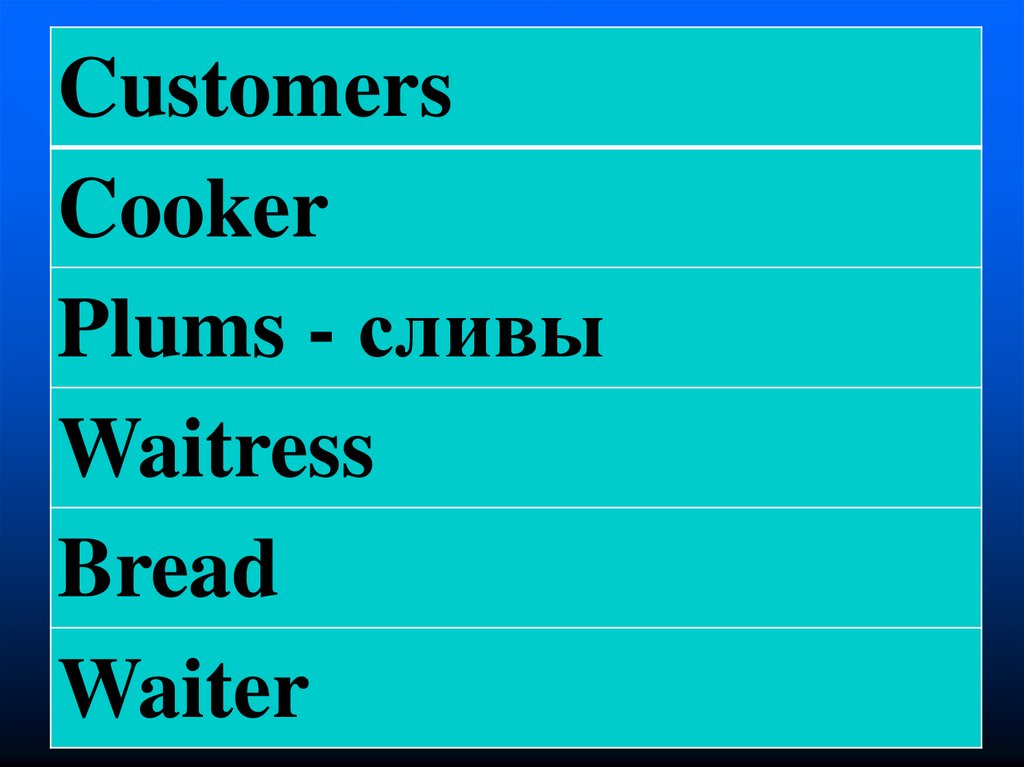

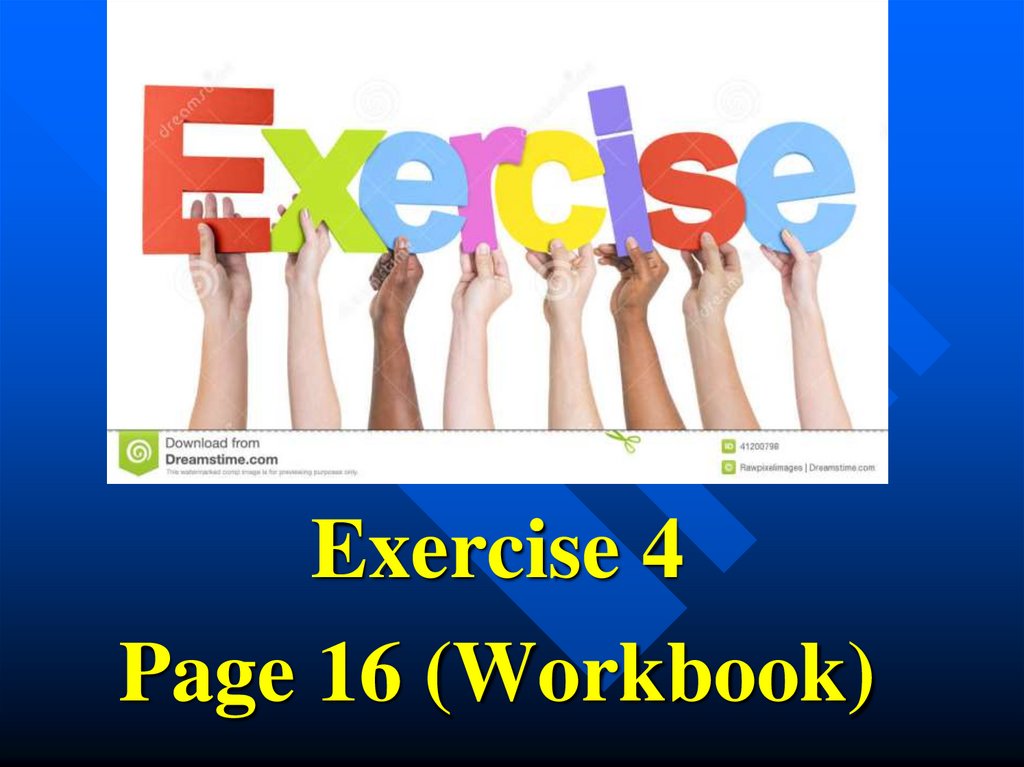

















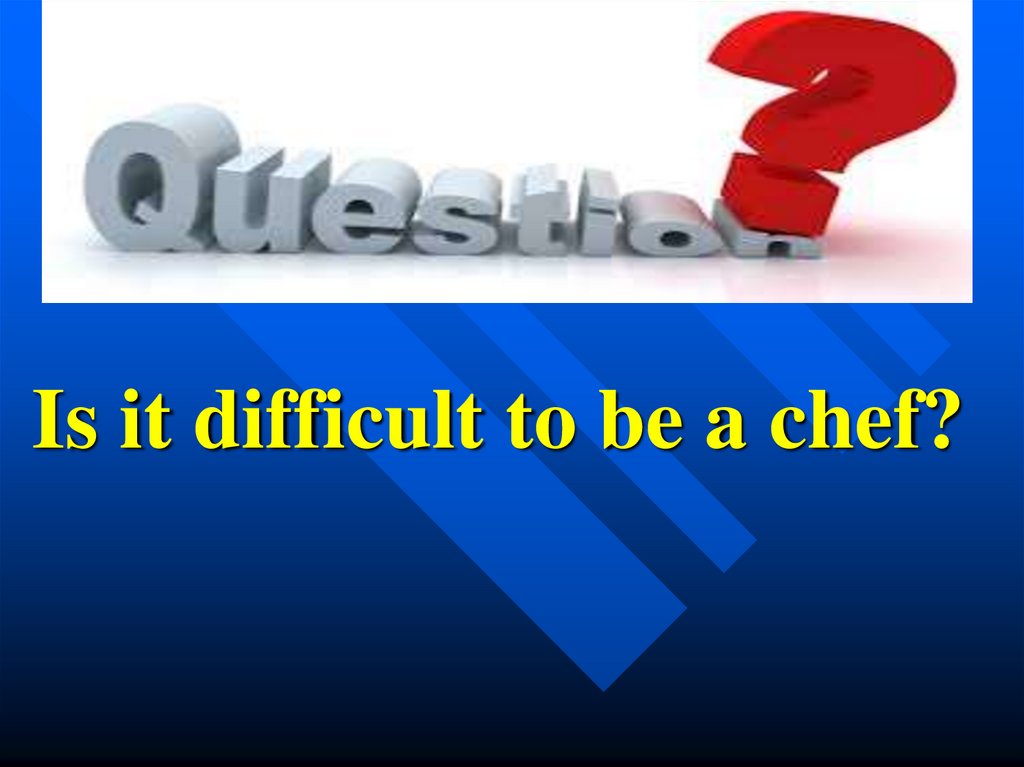

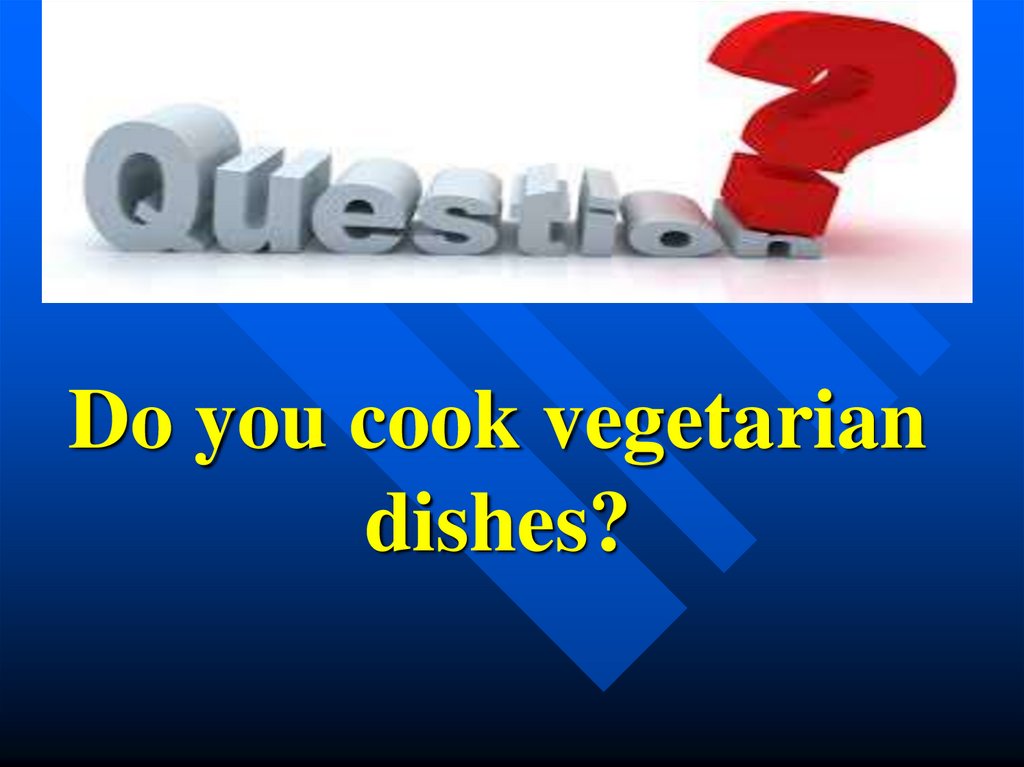






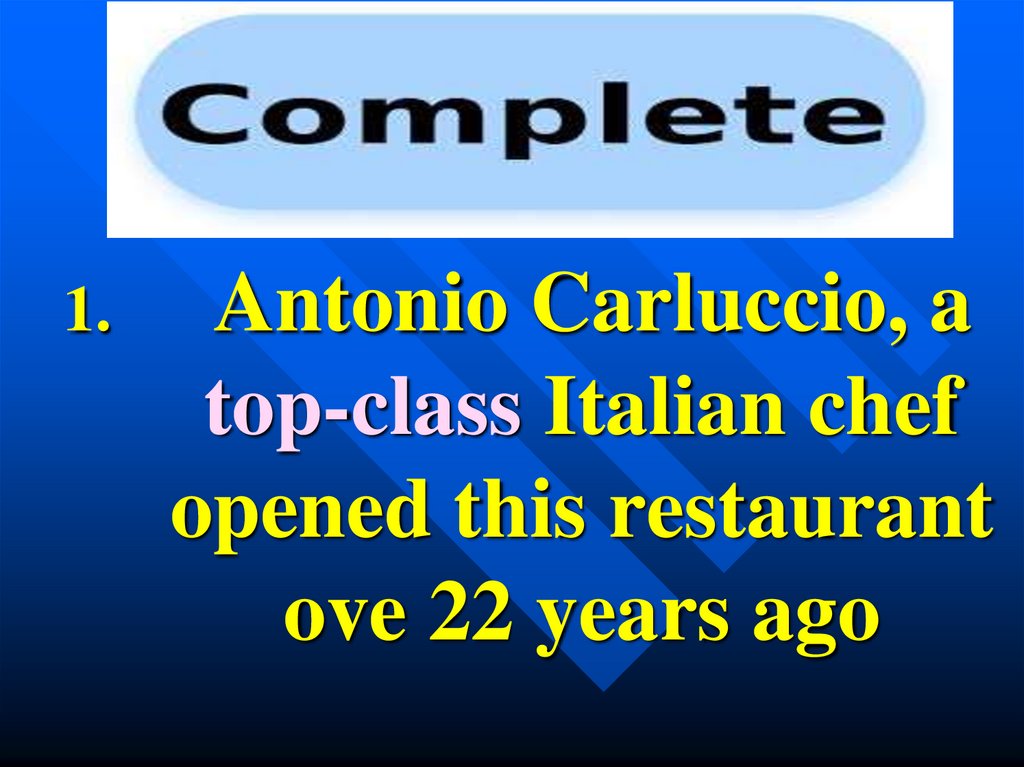

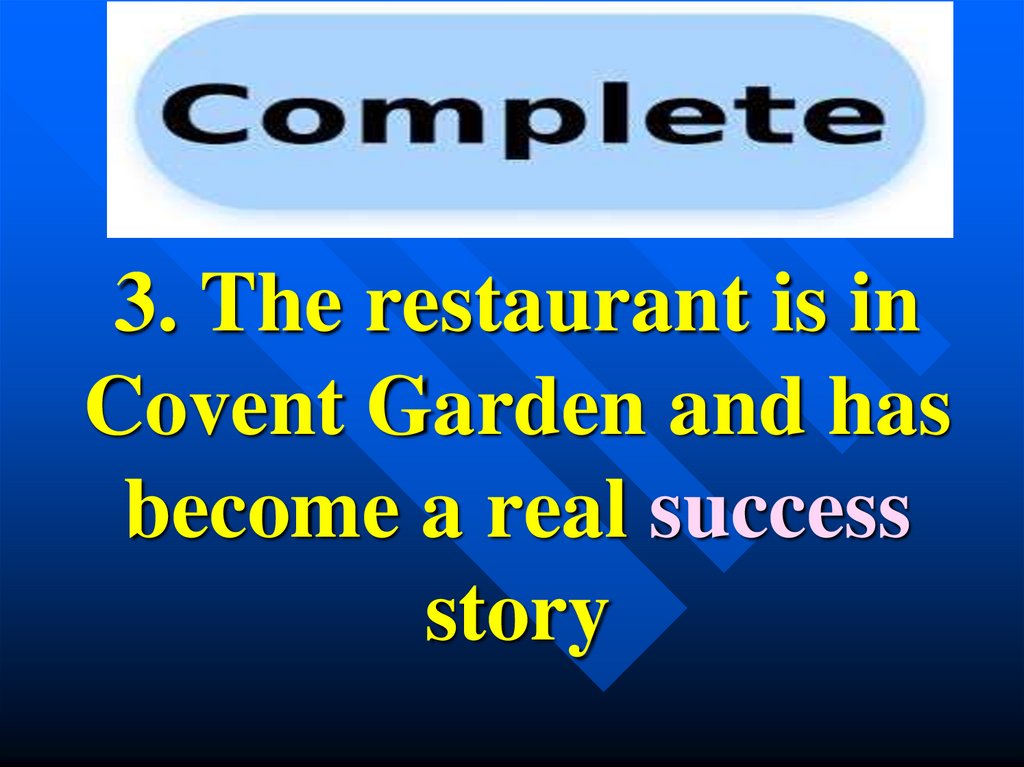

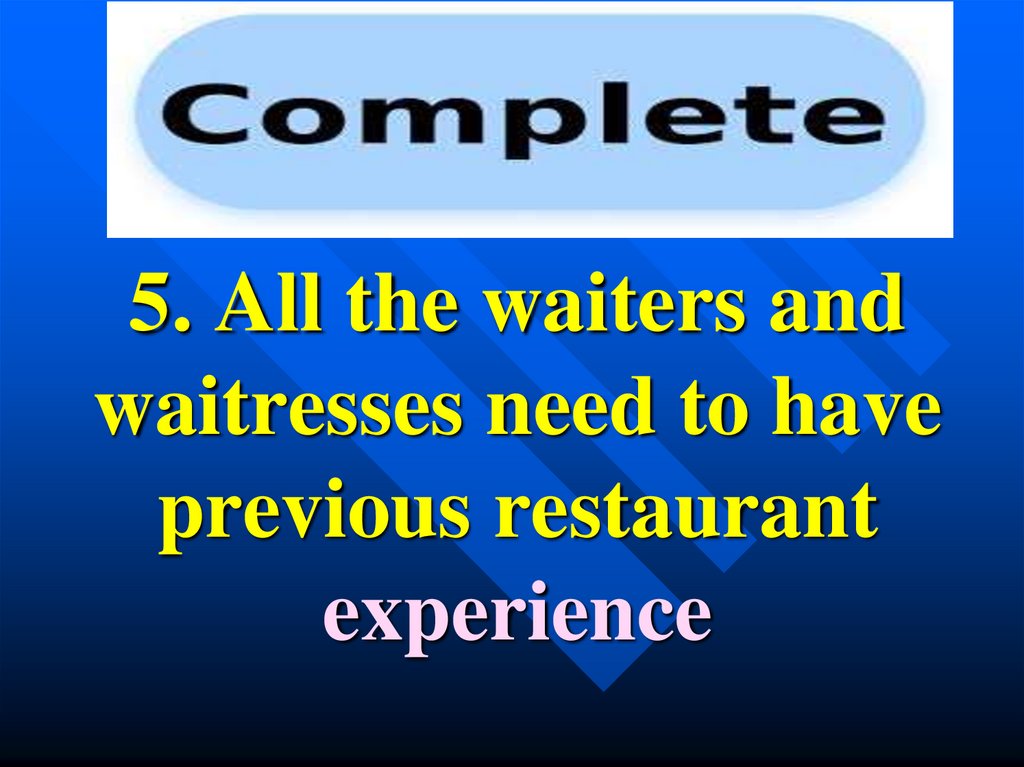

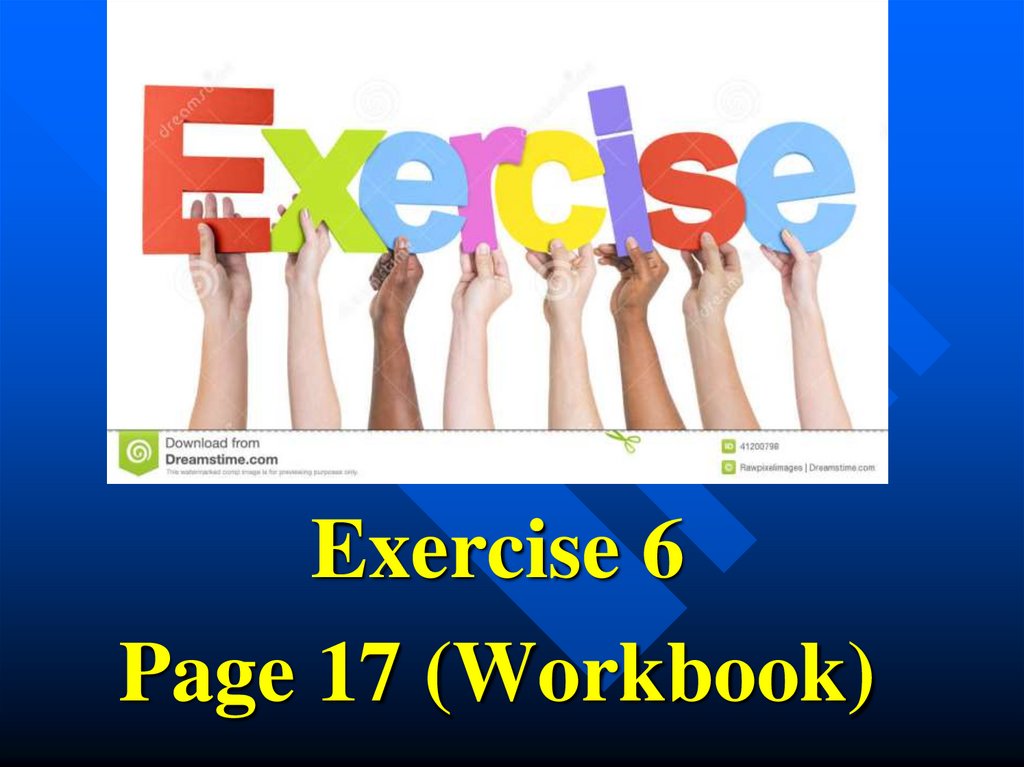







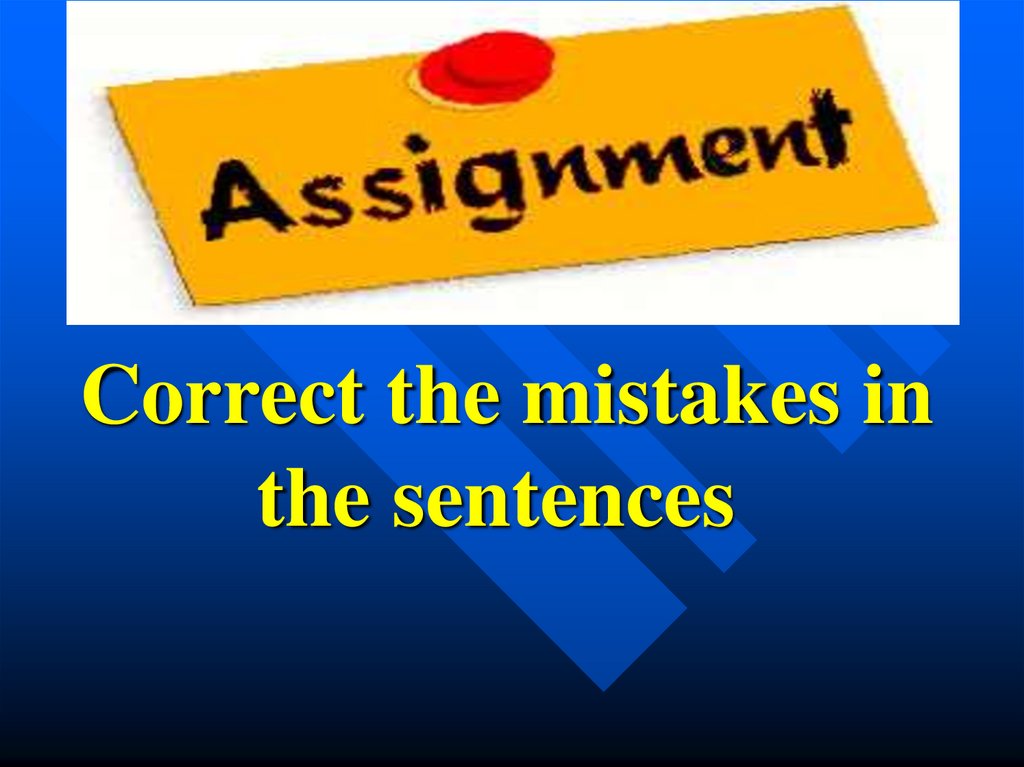








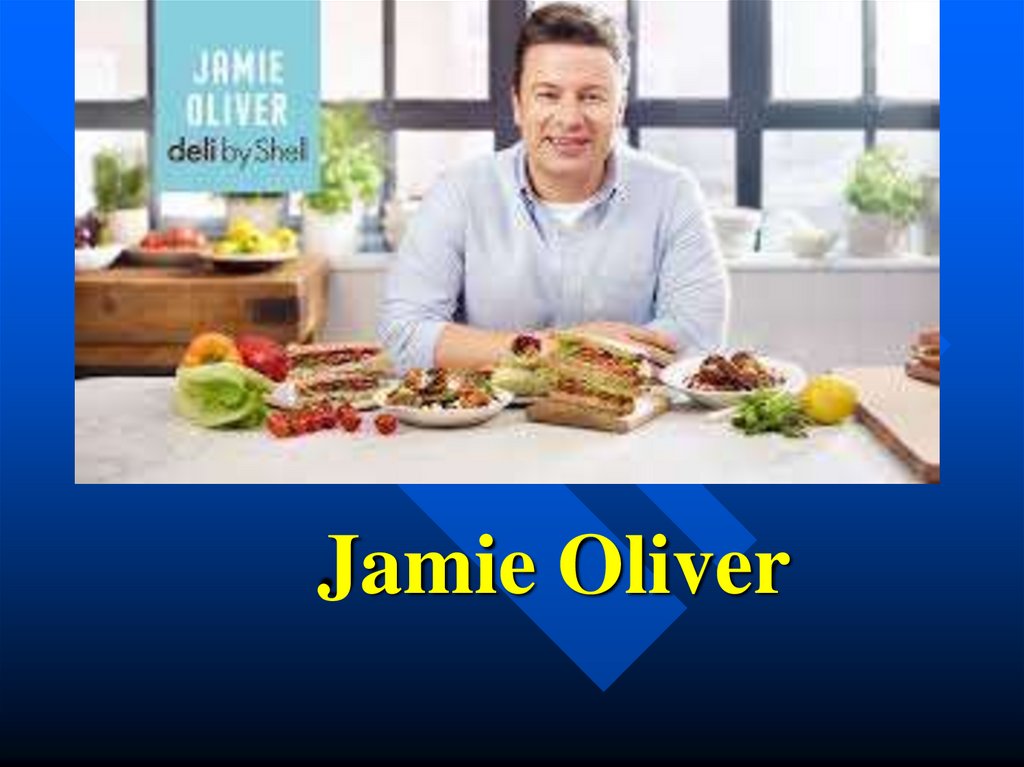





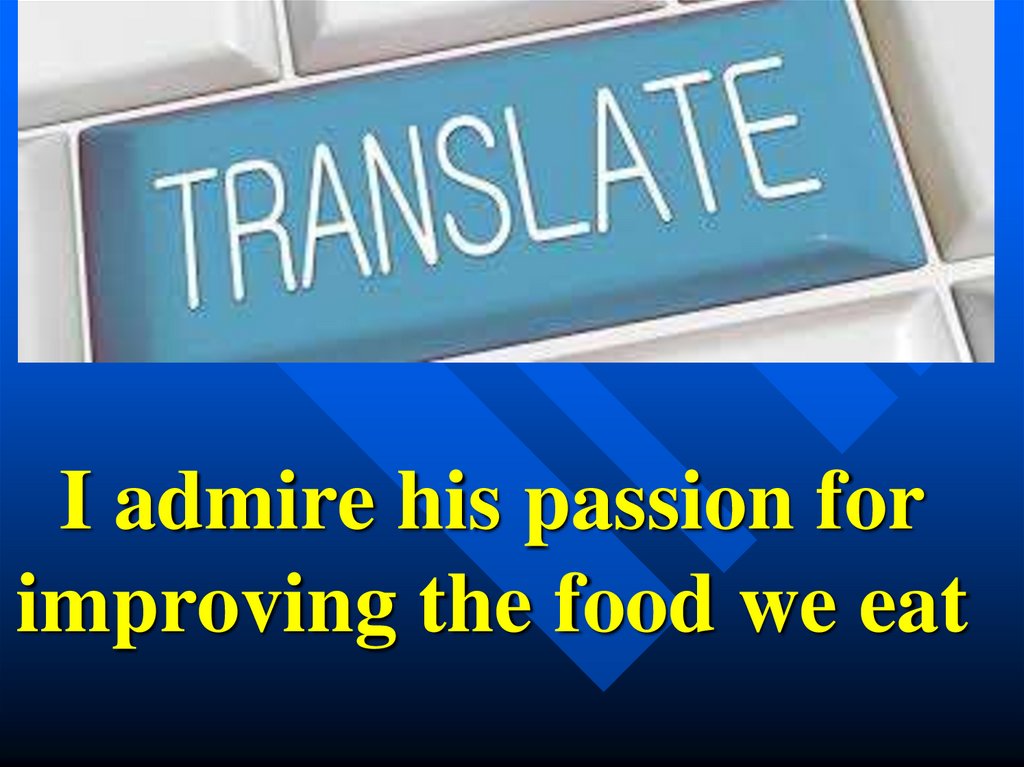







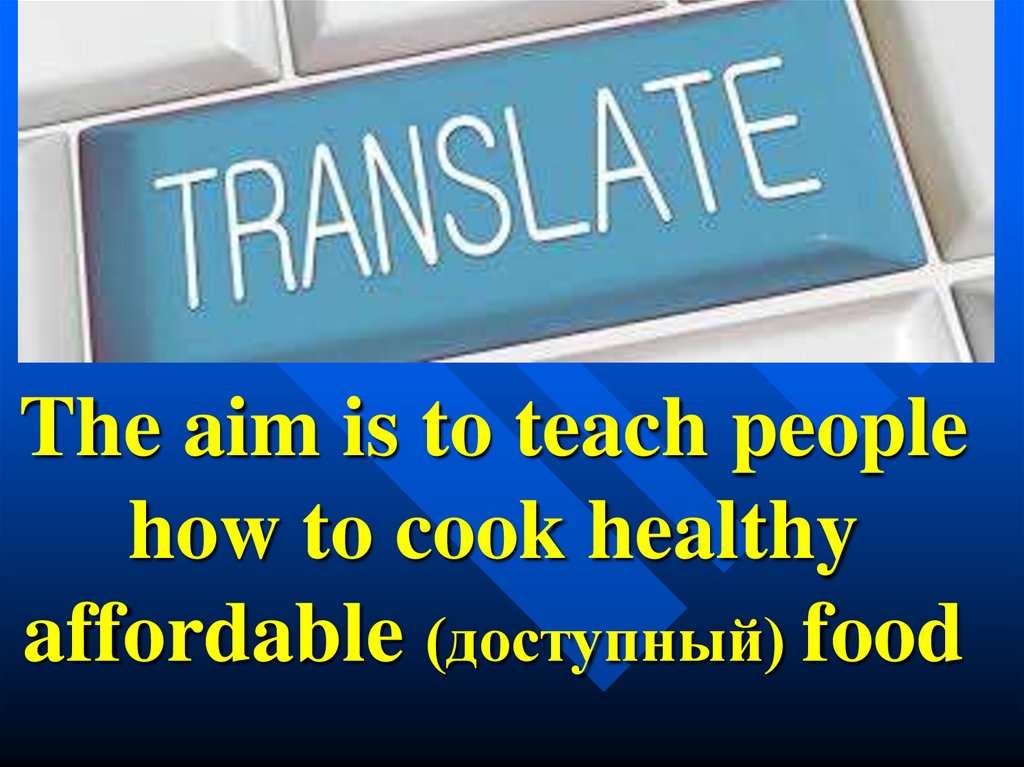
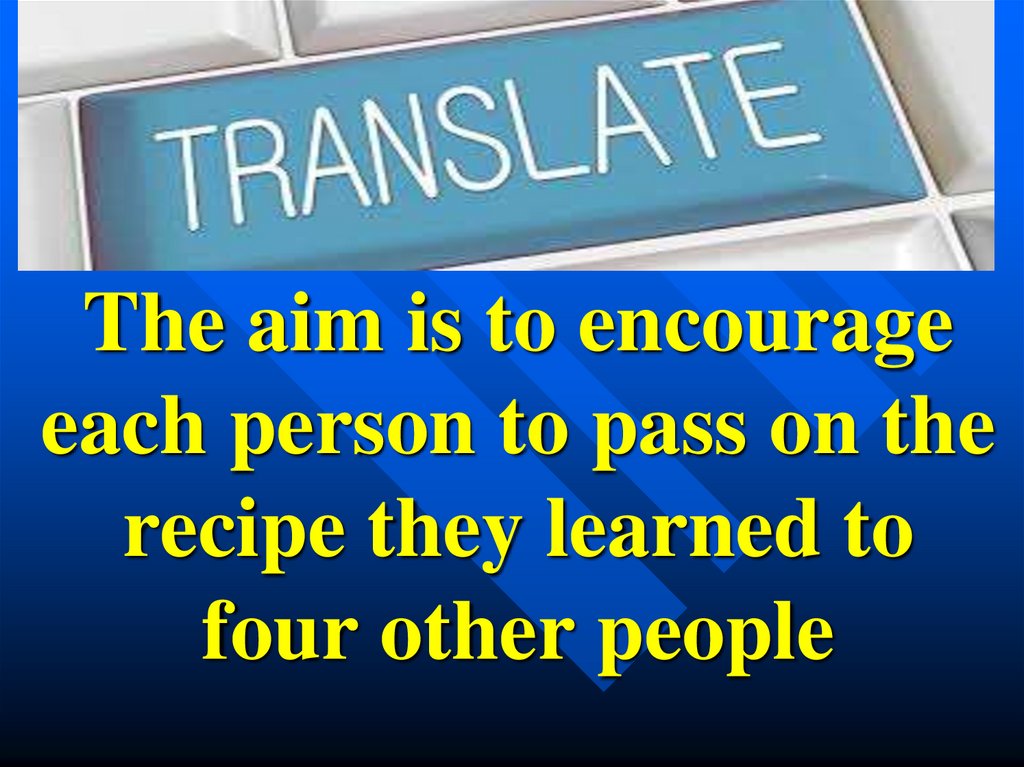
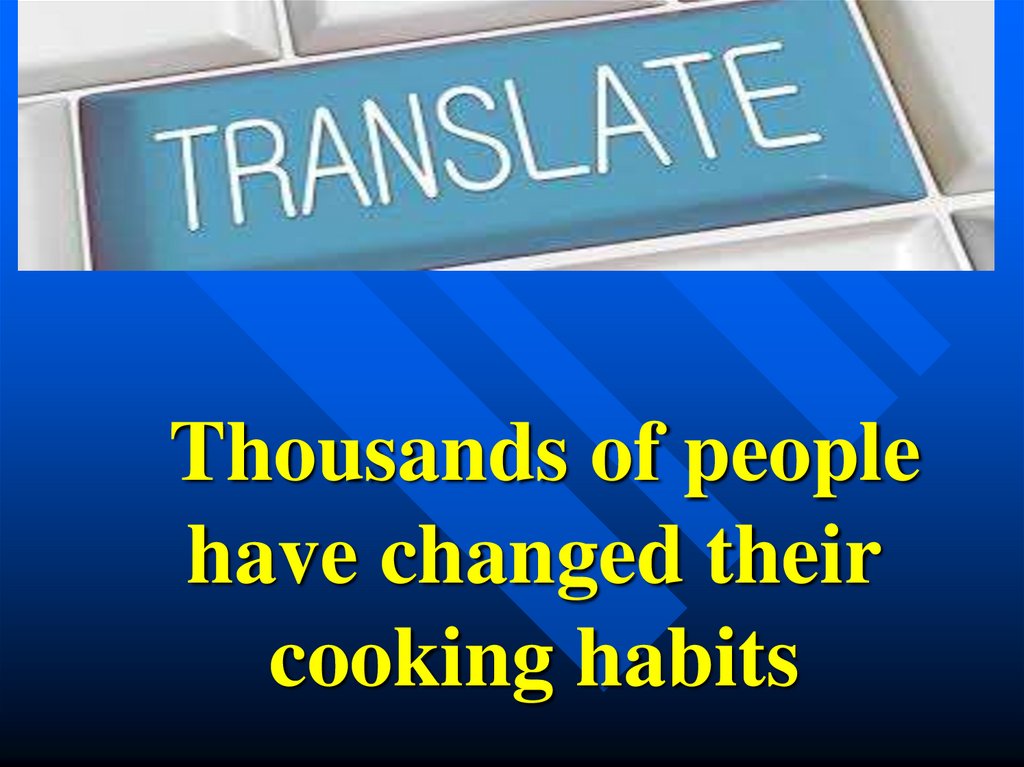





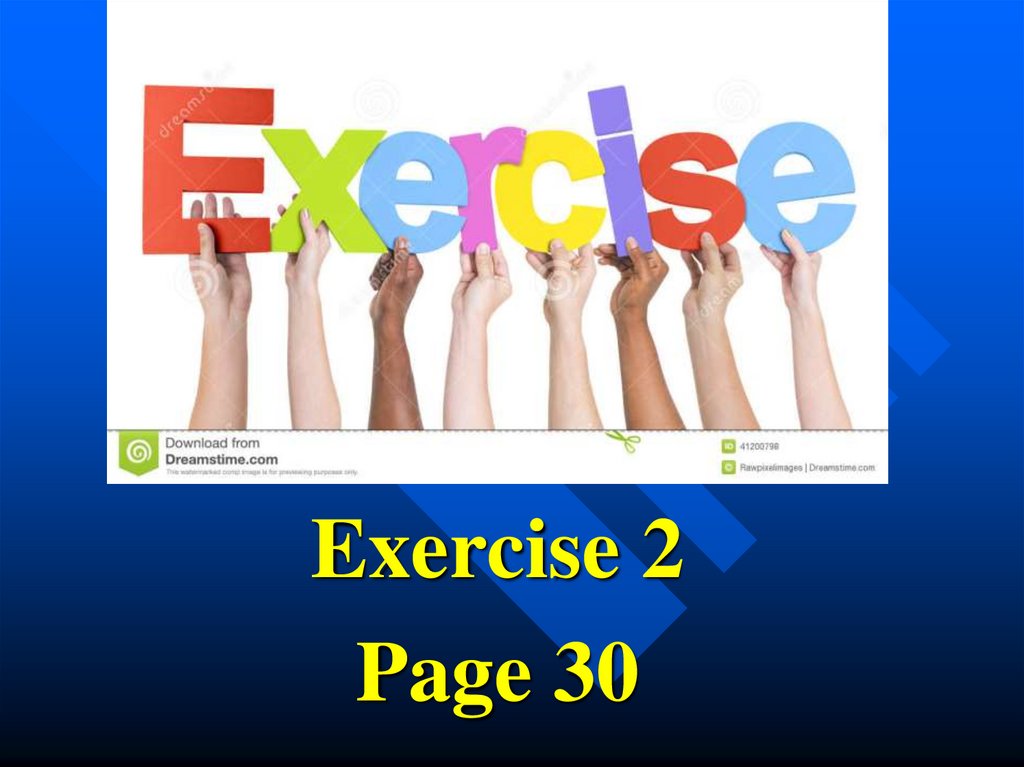




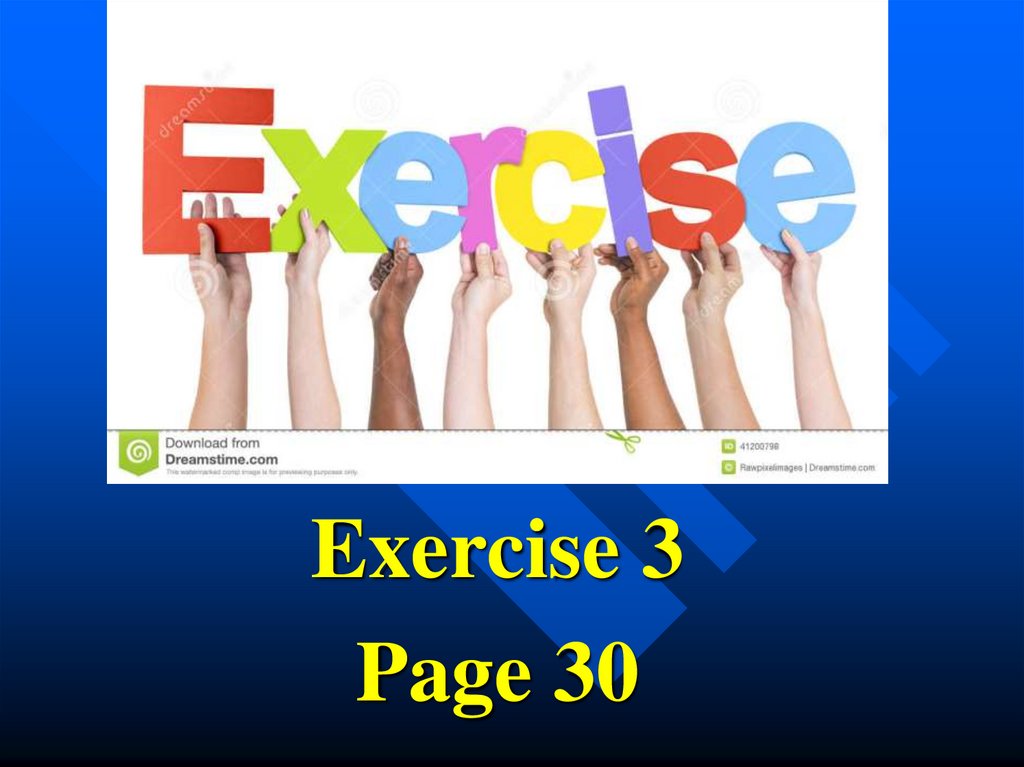

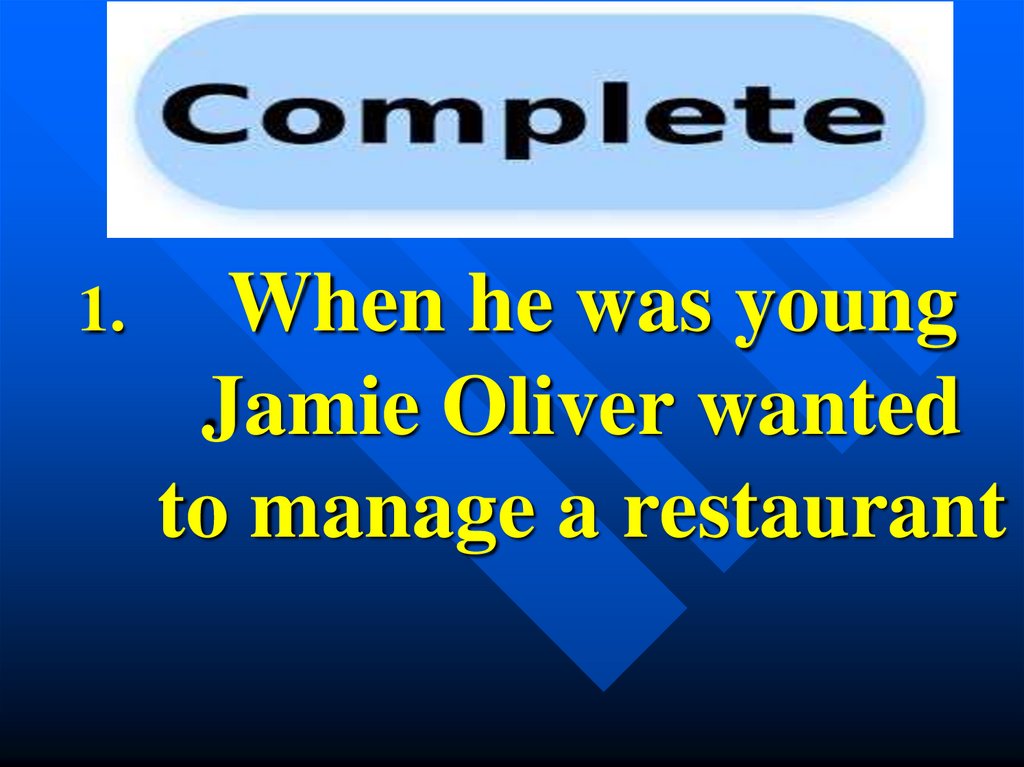
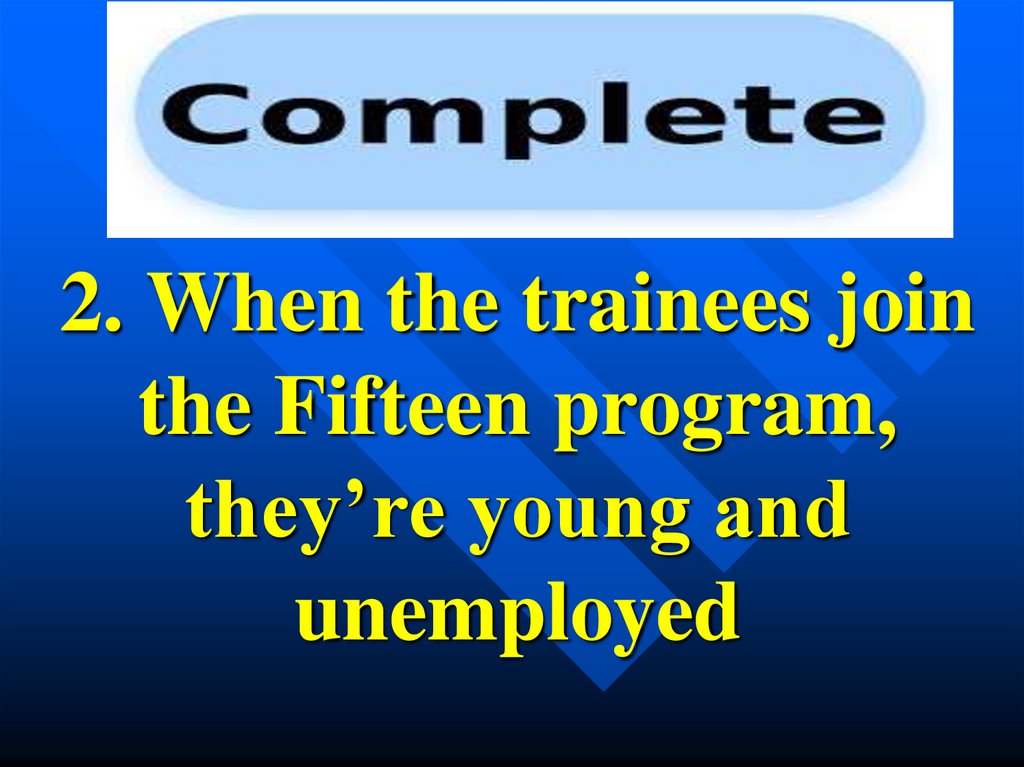
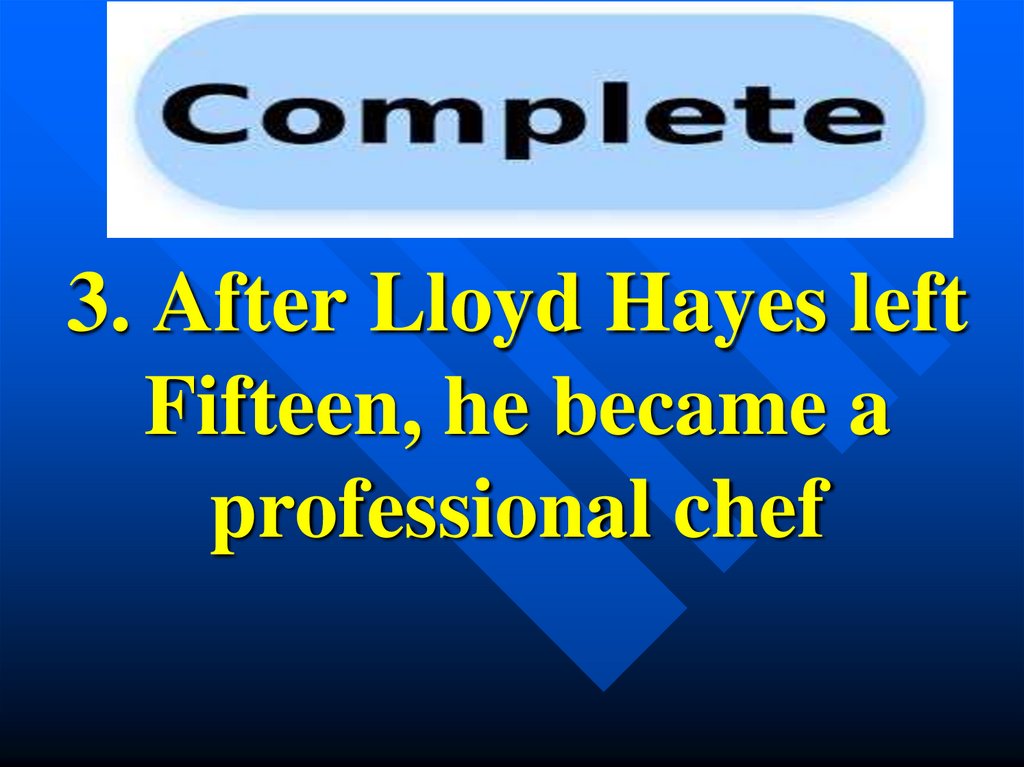





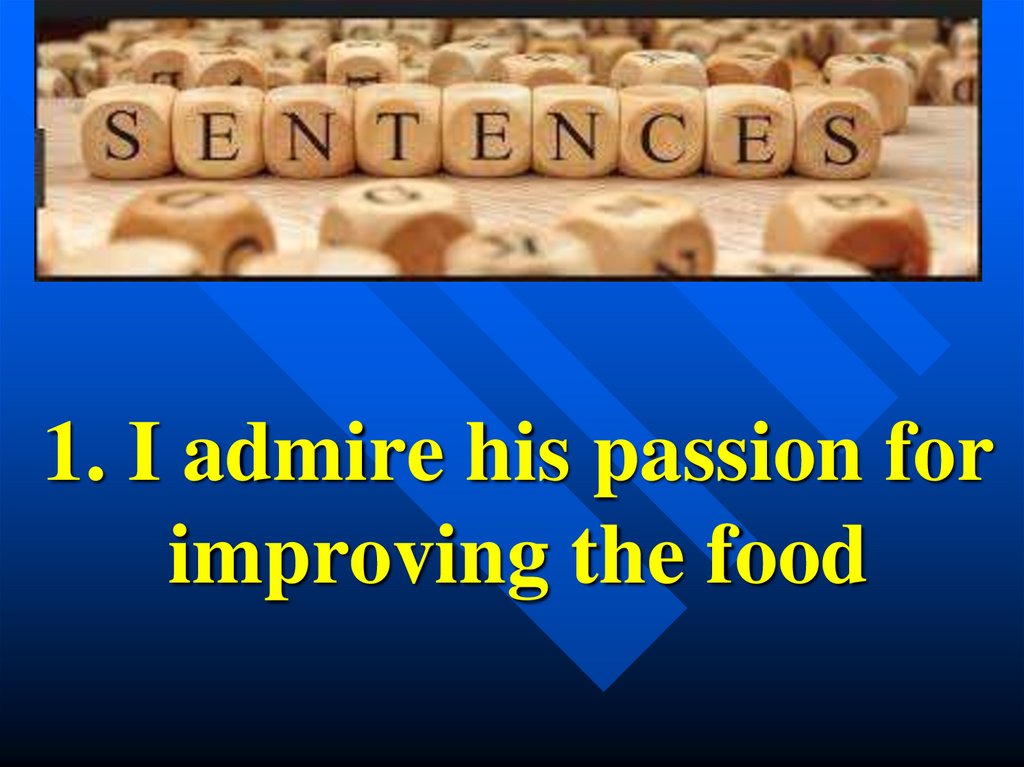

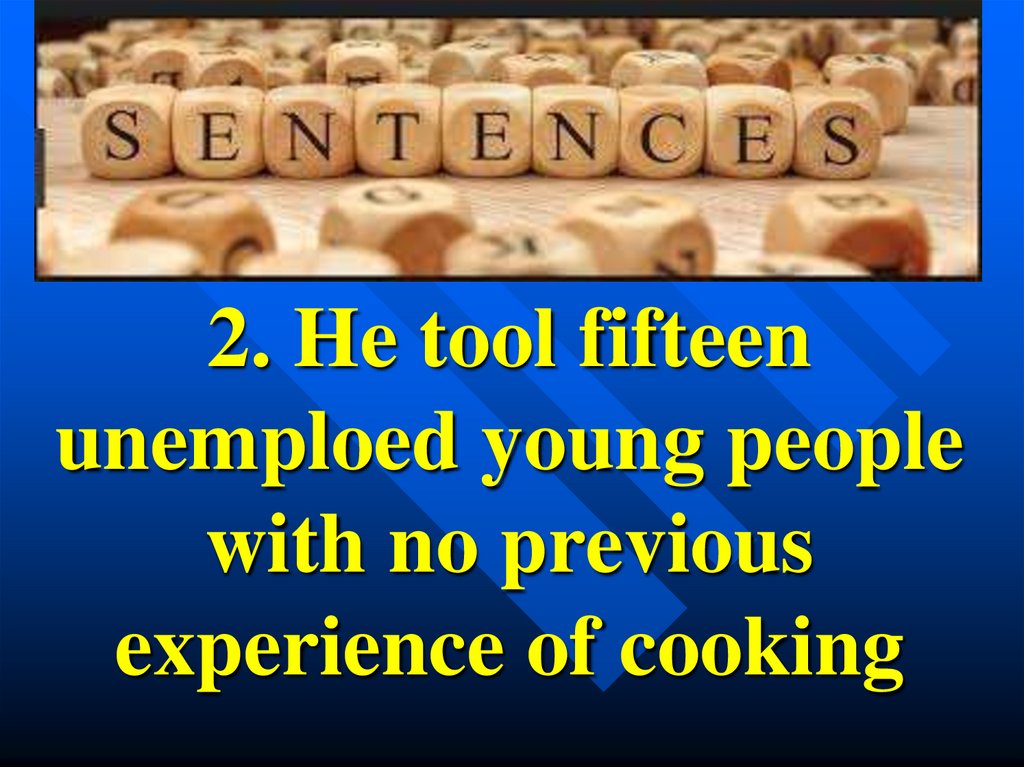
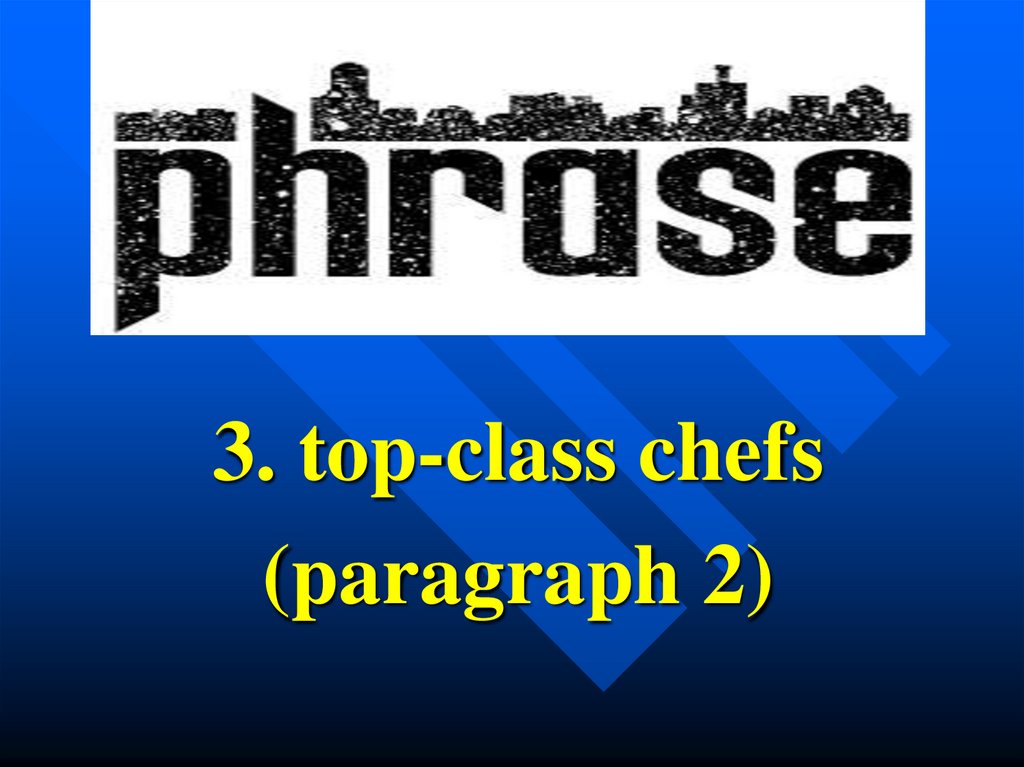

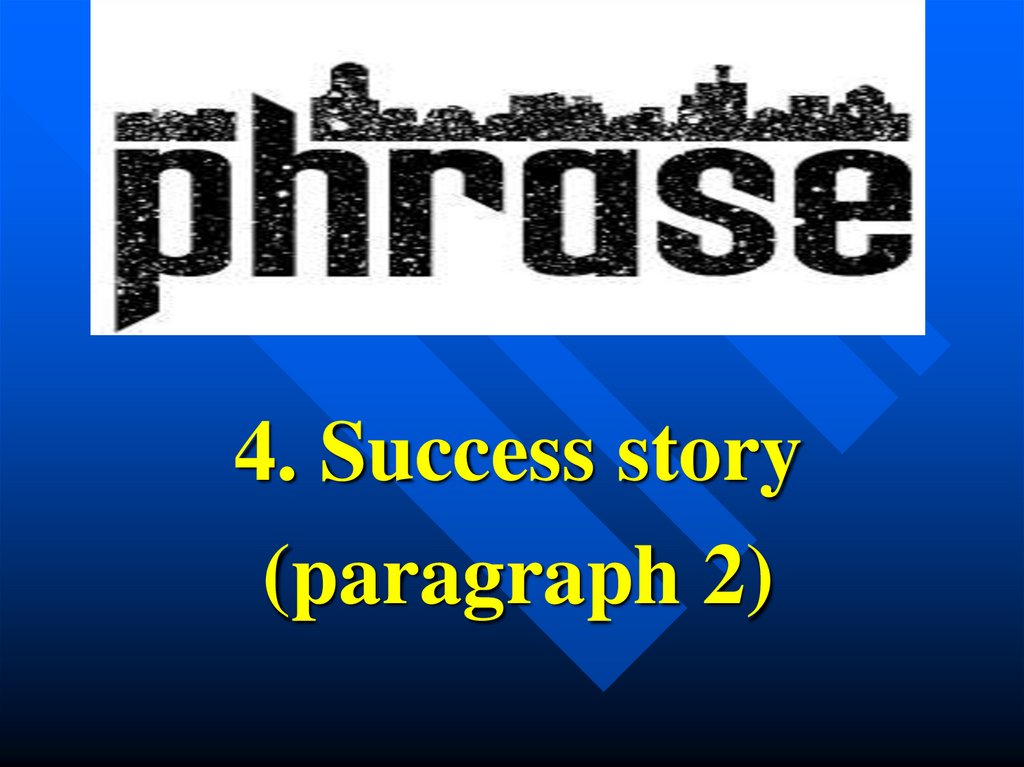
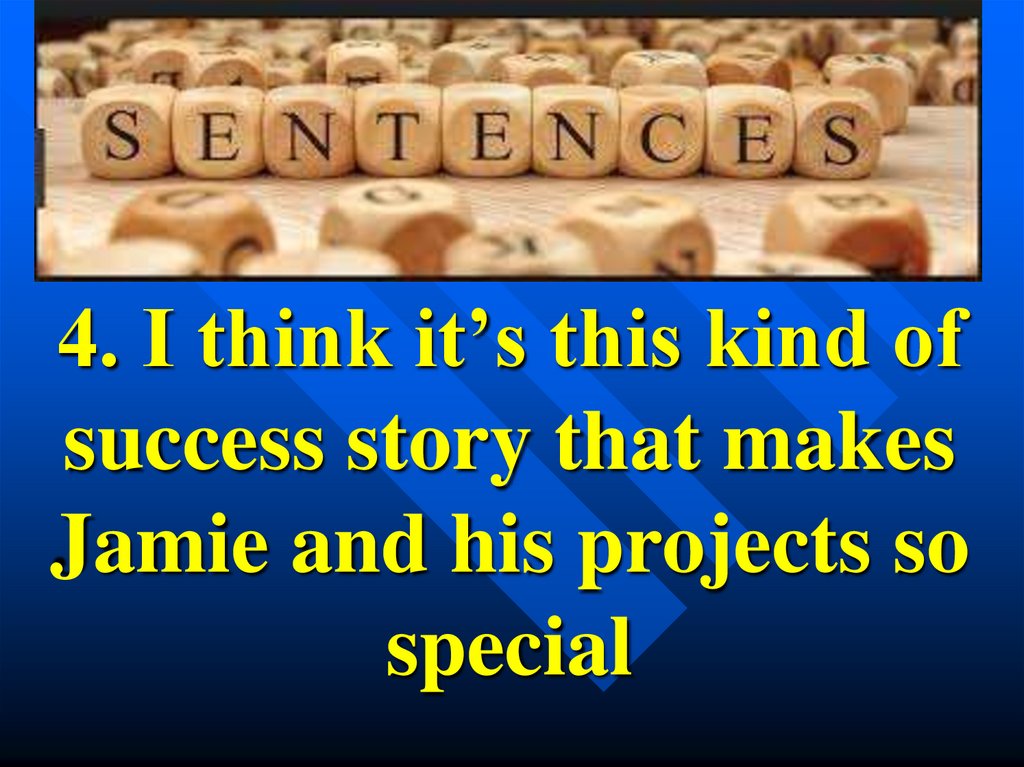
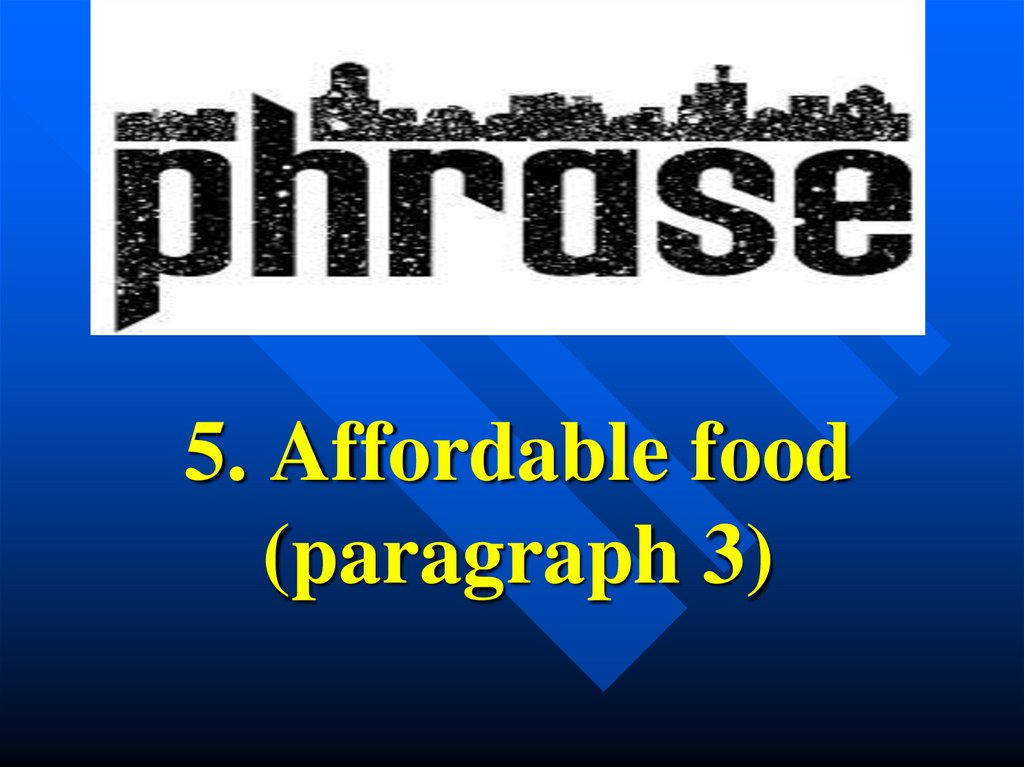


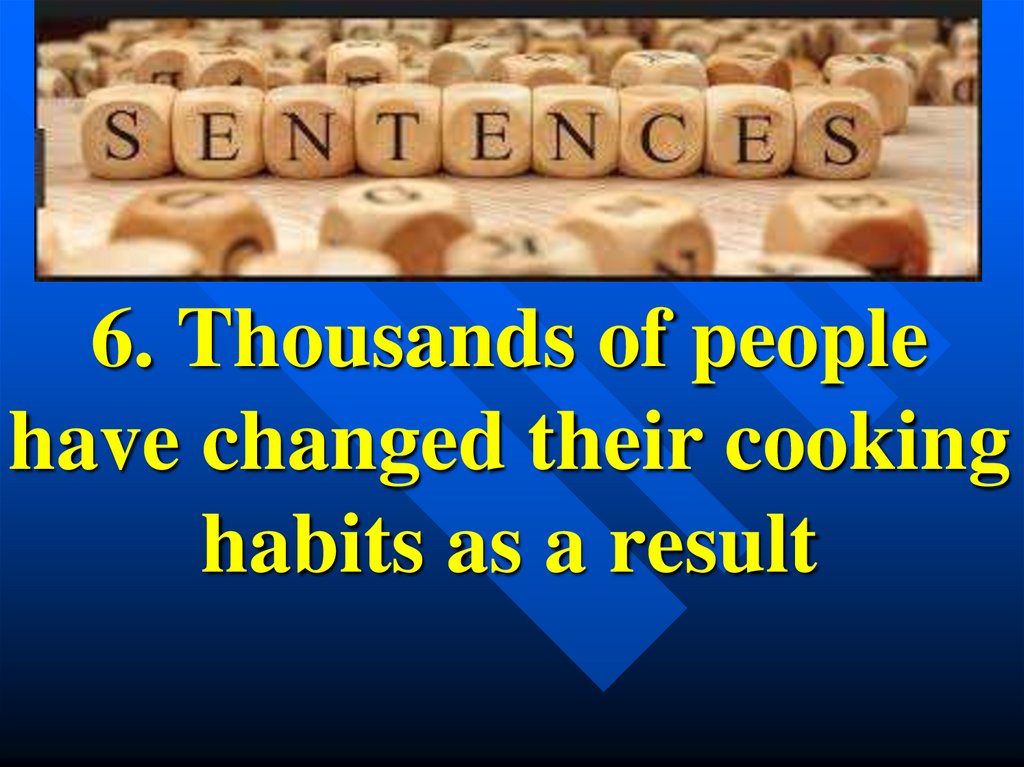
 english
english








